

135 ISSUE 7: BLACK HISTORY
VOL.
MONTH SPECIAL ISSUE CHIMAOBIAMANCHUKWU
SOLANA ADEDOKUN
Hello! What you’re holding in your hands (or reading online) is something very special. This 30-or-so page labor of love is the inaugural The C hi C ago M aroon Black History Month Issue, made in collaboration with the Organization of Black Students (OBS), the African and Caribbean Students Association (ACSA), Blacklight Magazine, and the Georgiana Rose Organization (GRO).
A lot of you might be thinking the same thing: Is this really the first Black History Month Issue The M aroon has done? Why has it taken so long? At least, those are the questions I asked myself before I pitched this idea to the current editor in chief! Historically, The M aroon has sorely lacked not only coverage of Black people and the South Side community, but diversity in all
Foreword
aspects of production, making it difficult to actually have enough momentum to create an issue like this.
Though I’m not as involved in each Black RSO as much as I would like to be, this issue is a love letter of sorts to the Black UChicago community. Coming from a predominantly white institution K-12 school, I never really had the chance to develop strong friendships with other Black students. Now, I know, no matter how much you’re involved, the Black community here will accept you with open arms.
This issue is not The M aroon ’s “I’m sorry” letter to the UChicago and South Side Black communities. Rather, it is mine and almost 30 other primarily-Black contributors’ from these partner RSOs platform to celebrate and empower the Black community while also educating non-Black





Editors
Solana Adedokun, head editor
Destin Bundu, design editor
Cameron Drake, social media editor
Simone Gulliver, editor
Tomás Miriti Pacheco, editor
Meghfira Mohammed, editor
Adesuwa Obasuyi, editor
Victoria (Tori) Harris, copy editor
Mia Rimmer, copy editor
Malaz Nour, copy editor
community members about the struggles and successes that Black people face everyday in our own community.
After the murder of George Floyd and the Black Lives Matter protests in 2020, we stand at a watershed moment in our lives for Civil Rights issues: being keenly aware of the injustices that have (and continue to) plague Black people for centuries, but also implementing and creating tools to change the future for Black people. Change can start anywhere, and, right now, I want this magazine to be a place in our community where change can start.
This Black History Month, do more, be better.
Without further ado, welcome to the very first The M aroon Black History Month Magazine! Here’s to (hopefully) many more in the future.




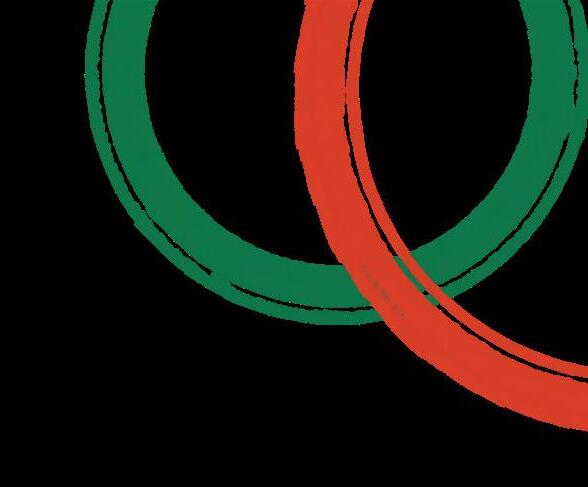
Special Thanks
Organization of Black Students (OBS)




African Caribbean Students Association (ACSA)



Georgiana Rose Organization (GRO)
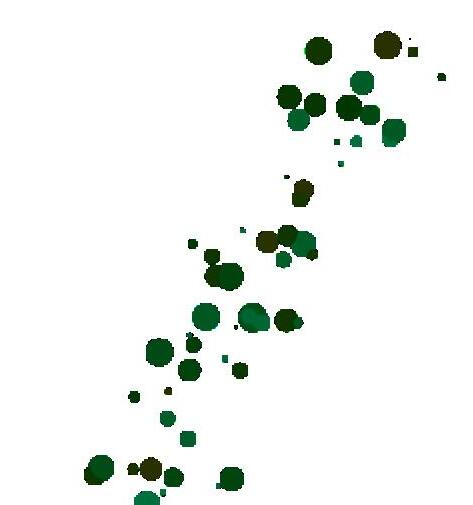
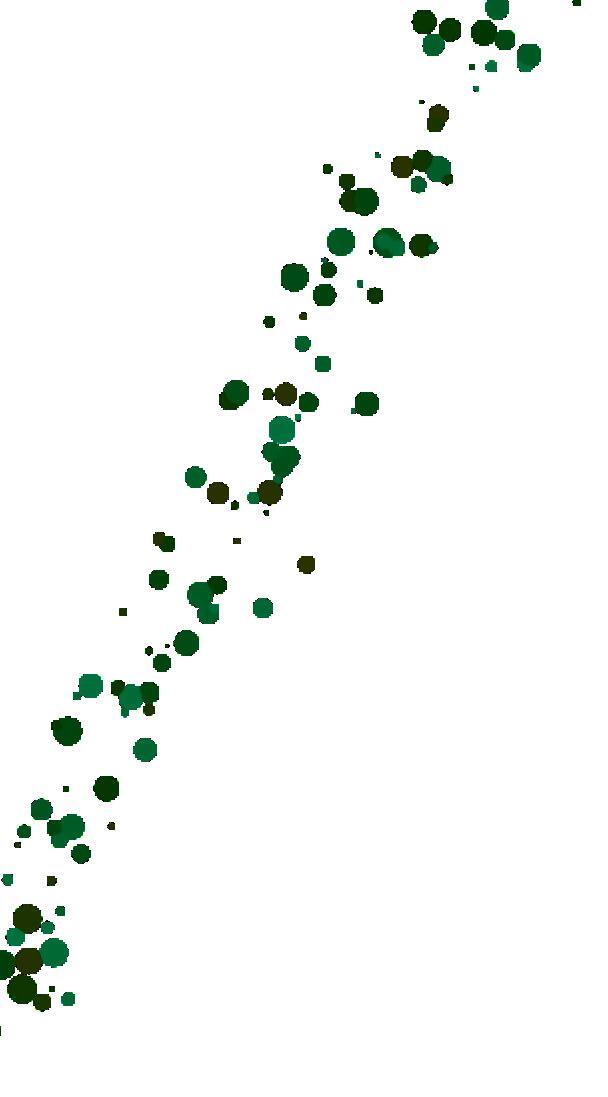
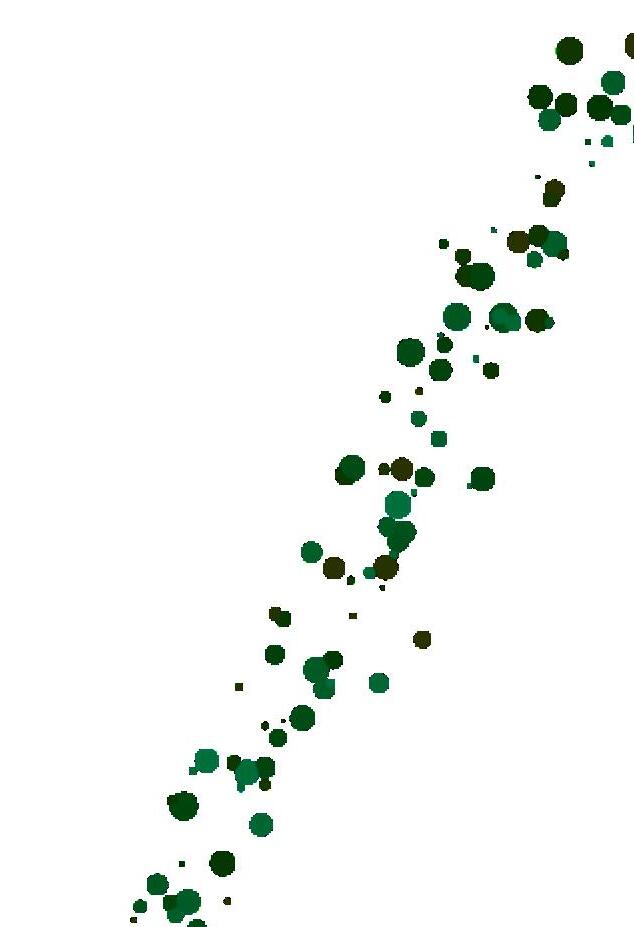
Blacklight Magazine
Caitlin Lozada
Tejas Narayan
Arianne Nguyen
2
GRO Page: Talking about the History of the Org and Dr. Georgiana Simpson

GRO


The Georgiana Rose Organization (GRO) is a mental health-focused student organization dedicated to the individual, social, cultural and political advancement of Black women at UChicago. Our aim is to create a community for people who identify with the Black ethnicity and femininity to feel safe in their identities and to develop platforms and tools for their voices to be heard, amplified, and validated on campus.
GRO was founded in June of 2020 by Marla Anderson (B.A. ’22), Dayo Adeoye (B.A. ’22) and Gabby Mahabeer (B.A. ’22). GRO was designed to bring together Black women from all parts of campus through a non-exclusive registration process and engage them with a variety of activities that promote personal and communal self-care; priorities that are sometimes left on the backburner while balancing and acclimating to life on campus.


Our organization is committed to the highest standards of inclusion and respect. While our mission is specific to the advancement of Black women and people who identify with Black femininity, we strive to maintain a welcoming atmosphere in everything that we endorse as an organization. Therefore, we aspire to participate in and adapt to contemporary conversations surrounding womanhood and open our space to all, regardless of their particular gender expression.



Our founders were inspired by the story of Dr. Georgiana Rose Simpson, the first Black woman to earn a Ph.D. in the United States. Simpson received her doctorate in German from the University of Chicago on June 14, 1921, just a few weeks after the Tulsa Race Massacre in Oklahoma, evidence of the period’s broader racial

attitude. While on campus, Simpson briefly lived in Green Hall while it was a women’s dormitory at the time. Protesting from her white Southern peer forced Simpson out. Despite these challenges, Simpson remained committed to her studies and left behind a groundbreaking legacy as the first Black woman to achieve the highest level of formal education offered in the US education system. Our organization is
named after Dr. Georgiana Rose Simpson to pay homage to her life, work, and resilience, and embrace the collective history and experience of Black womanhood at UChicago.
Since GRO was founded during the pandemic, our first events were held online. This included the first annual Dr. Georgiana Rose Simspon Day event on March 31, 2021 where GRO’s former

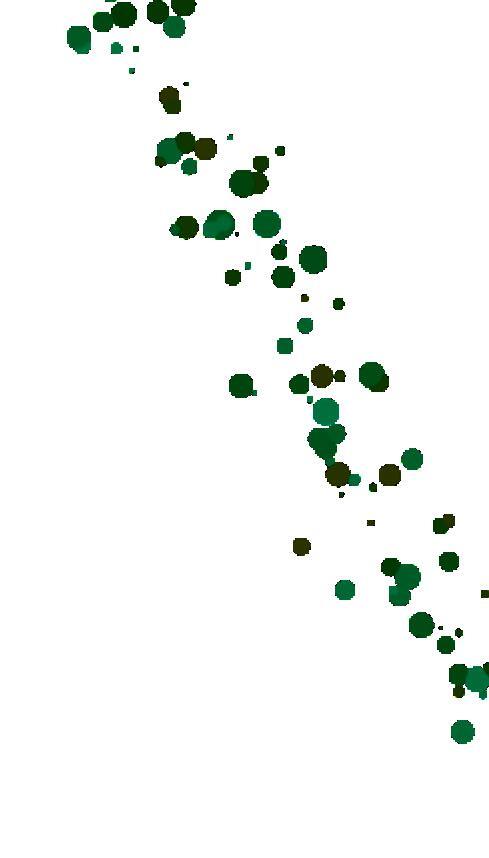

3
President Marla Anderson, Vice-President Dayo Adeoye, and Advisors Dr. Melissa Gillliam and Candace Hairston shared their experiences as members of UChicago’s Black woman community. Our organization continues to reserve this day to uplift and highlight the experiences of Black women at UChicago.
GRO’s first in-person event took place on May 9, 2021, a trip to see the Bisa Butler: Portraits exhibit at the Art Institute of Chicago, works from Black quilt artist Bisa Butler that celebrate Black life. The exhibit included her I Know Why the Caged Bird Sings portrait named after Maya Angelou’s 1969 memoir depicting four Black women attending college during the Jim Crow era. As Black women attending a predominant-
ly white institution, the group resonated with the confidence and resilience depicted by the young women in the portrait and took a photograph with the piece.
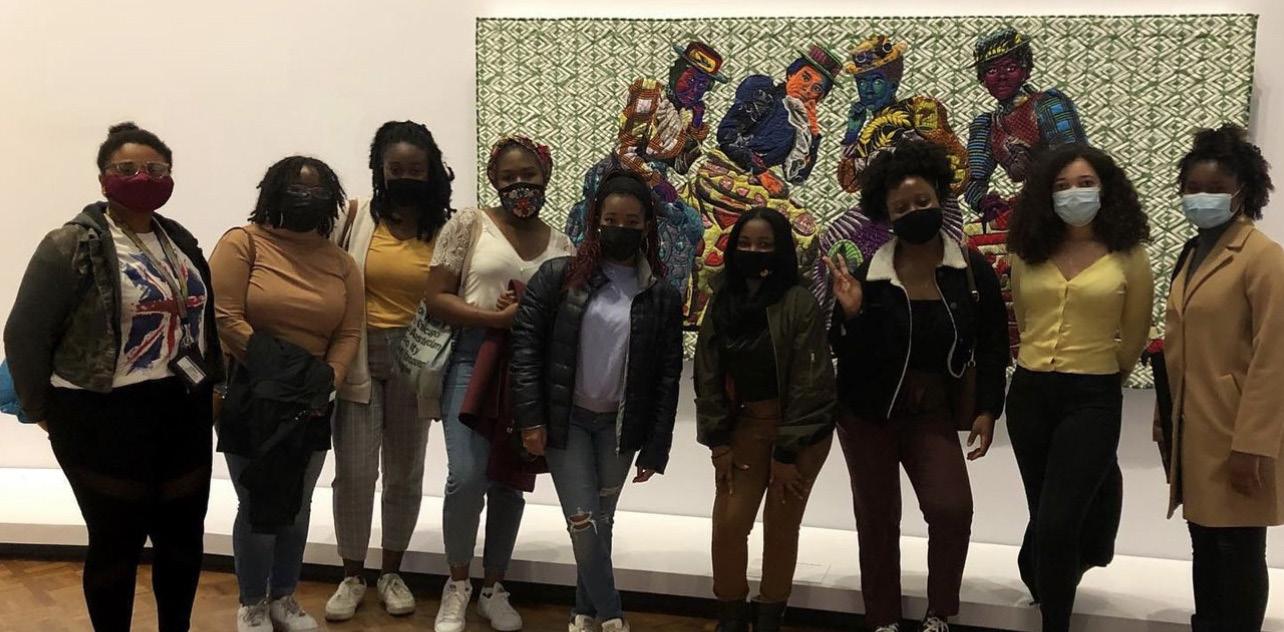
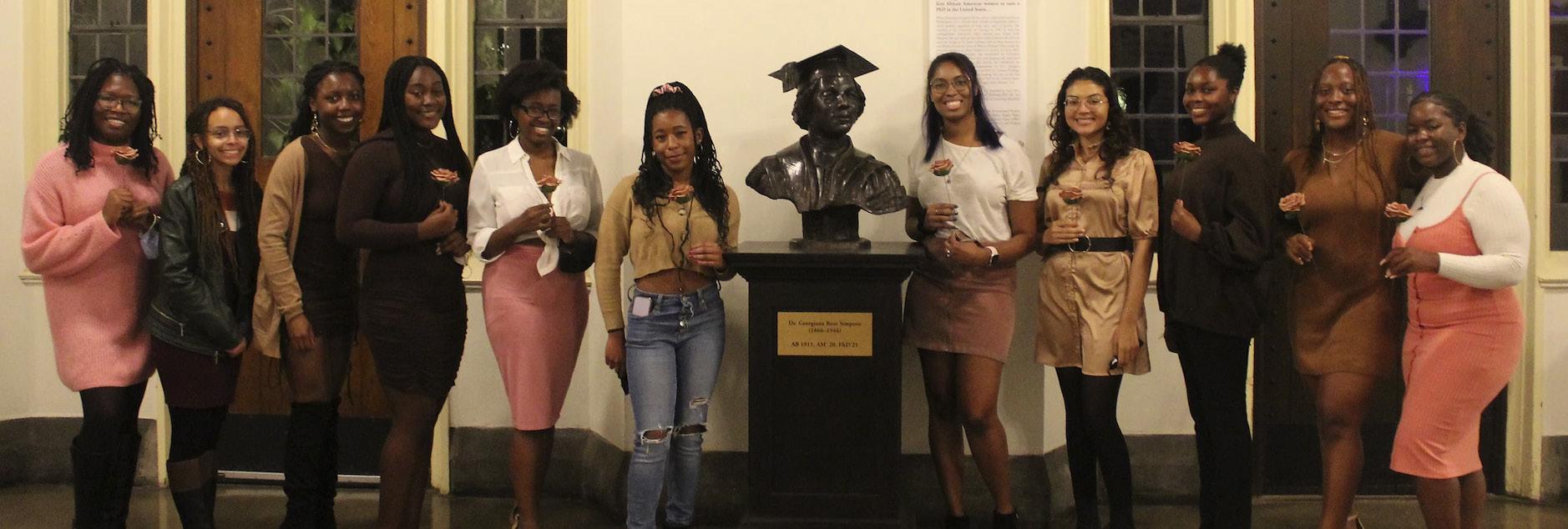
Since then, GRO has taken further inspiration from Maya Angelou by adopting language from one of her famous quotes as focuses for our organization and its four committees.
“My mission in life is not merely to survive, but to thrive; and to do so with some passion, some compassion, some humor, and some style.” — Maya Angelou
Our four committees and their focuses are:
1. Passion Committee - desires, inspirations, enthusiasms and creativities


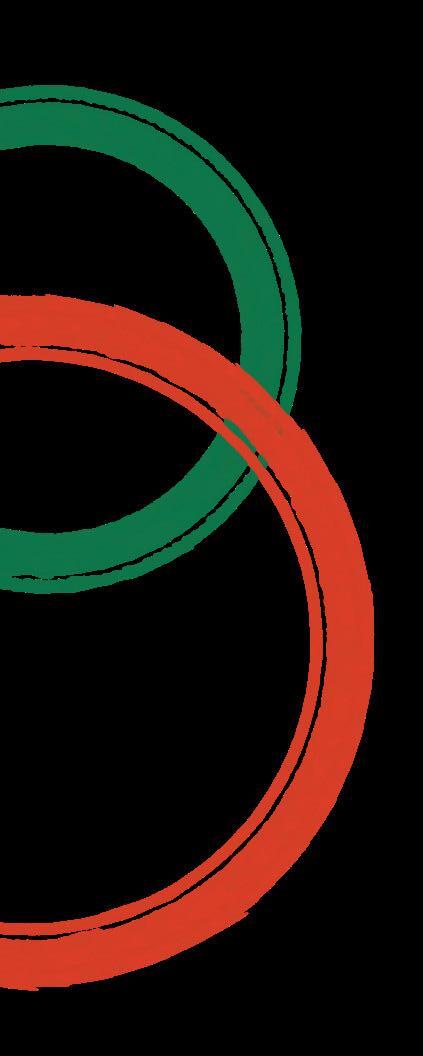

2. Compassion Committee - mental health and self-care
3. Humor Committee - fun and entertainment
4. Style Committee - newsletters, social media, marketing and branding
If you’re interested in connecting with us, joining a committee, participating in leadership, or signing up for our newsletter to get updates about future events (including our third annual Dr. Simpson Day!), please send us an email at gro.uchicago@ gmail.com.


Instagram: @gro.uchicago | Website: grouchicago.wixsite.com/website
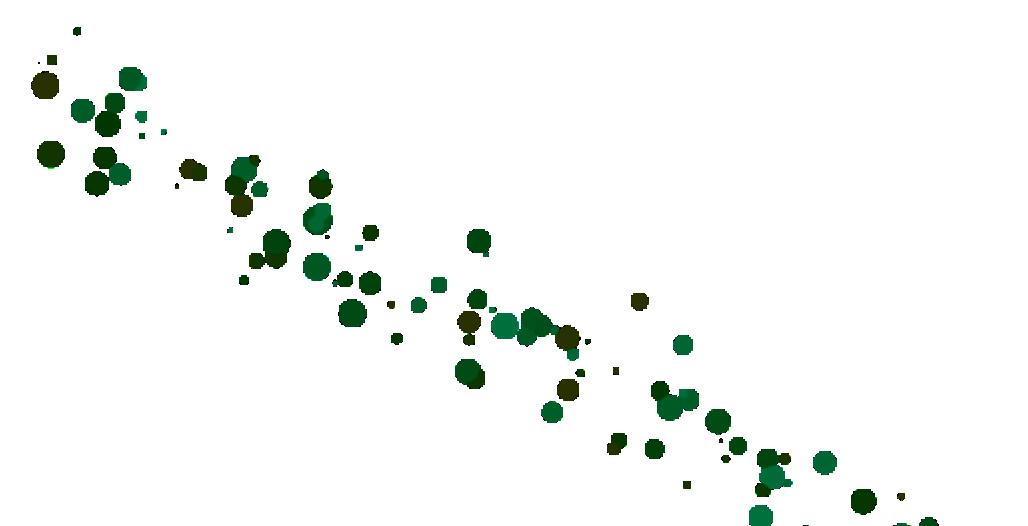
4
Climbing the Ivory Tower: Views From the Top
 MARLA FIONA ANDERSON, BA ‘22
MARLA FIONA ANDERSON, BA ‘22
The Entrance - Getting Accepted to the University of Chicago
For most of my life, I didn’t even know that the University of Chicago existed. This changed during my senior year of high school, when I received a letter in the mail from QuestBridge, a non-profit helping high-achieving, academically motivated students from low-income backgrounds gain access to some of the nation’s “top institutions.” At first, I thought it was a scam, but after taking a leap of faith and completing a lengthy application process, I got matched to UChicago, the school with a reputation for diversity, in a city with a reputation for violence.
Why did UChicago accept me? Well, I was diverse and a high achiever. I graduated high school in the top five percent of my class of 250 students, the only Black student that year to do so. I was also involved as President of the Speech and Debate Team, President of the Fellowship of Christian Athletes and Students, and member of the Marching and Concert Bands. I volunteered heavily with the American Red Cross, won several awards and earned multiple distinctions as the “first” person to do fill-in-the-blank-thing in each organization. In fact, I’m the only person that has ever attended UChicago from my high school.
My application essay was a letter to my mom titled Dear Mom: Jamaican Me Crazy. In the first line, I wrote “I’m 17 years old and I’ve never been to a birthday party.” I went on to talk about all the things I missed out on growing up due to being raised in an overprotected household and eventually came to the conclusion that my mom was “sending me into a tornado where I [would] be flung around by the underlying truths
of life. And there’s nothing I can do but hope and pray that I fall into the right ring of debris, and land safely on the ground.” I was right, but I would later consider it weird that I had to put my traumas on the line to gain acceptance, and I often wonder what my peers wrote about.
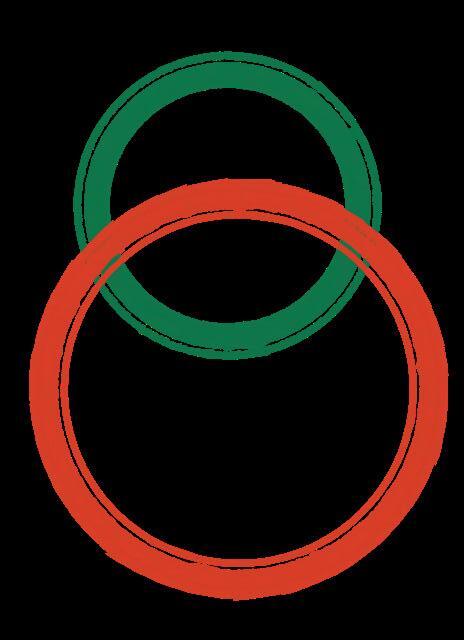

I was socially, emotionally and culturally unprepared for what I would face in the next four years. Though I grew up surrounded by mostly white Southern influences and, at the time, felt very comfortable in majority white spaces, it wasn’t the white community that welcomed me when I came to campus. In fact, my first ever party was in a Black student’s dorm room during UChicago’s 2018 Admitted Students Weekend, where I got crossed, lost, and thankfully redirected by a campus security guard. I didn’t know then that this would become the theme for the rest of my four years—trying new things, making mistakes, losing myself, and with guidance and support from others, coming out on the other side better for it.

The Climb - Navigating the Institution
First Year
Turns out, there were no tornadoes involved, but there were lots of stairs. Thankfully, I didn’t have to climb the first few alone. I was one of 50 students accepted to the Chicago Academic Achievement Program (CAAP), a bridge program for students from low-income, and rural backgrounds. On the first night, June 24, 2018, we all sat on the stairs of Behar House lounge in Campus North and introduced ourselves. I introduced myself as the severely overprotected girl looking forward to independence and exploring Chicago. Because of CAAP, I felt safe, connected, and prepared for matriculation in the fall. While there, I also posted the first video to
my new YouTube channel, where I would eventually become the first Black student to post videos about race matters at UChicago.
A few months later, I started getting to know the rest of my peers. According to a census on UChicago’s Inclusive Pedagogy site, in Fall 2018 the undergraduate student population was 39.3 percent White, 19.2 percent Asian, 14 percent International, 13.7 percent Latinx, 6.5 percent Multiracial, 5.2 percent Black, 2.1 percent not specified, 0.1 percent American Indian, and 0.01 percent Hawaiian/Pacific Islander. This site uses this information to encourage professors to “be proactive” and “consider including course materials written or created by people of different backgrounds and/or perspectives.”
As an Anthropology major, most of my classes relied on knowledge surrounding different backgrounds and perspectives. After taking my first few social science classes, I was attracted to the concepts I was learning and would come to love discussions surrounding race and the African diaspora. Systemic racism started making more sense to me, and I started seeing it in even more places than before.
I was friends with a faculty member from my high school who was posting anti-immigration propaganda to her news feed. As a first-generation Jamaican immigrant, who had a decent relationship with this person, I was hurt. The concept that all teachers love all their students quickly dissipated for me. I would later guard who I would trust pedagogically. I decided to share some of my perspectives on my own feed, with an audience that included many of my white peers from home. One person said that college was turning me into a “liberal snowflake” while another suggested that instead of using welfare benefits to get me a plane ticket, it might be easier to send me back on the boat I came on. Despite the
5
fact that I didn’t know what either a liberal snowflake or Electronic Benefit Transfer (EBT) was and that I entered the country via airplane, these messages hurt.
Around the same time I learned about the University of Chicago Police Department (UCPD) shooting Charles Soji Thomas, a Black student who was experiencing a mental health crisis in 2018. Due to a combination of my genetic history with mental illness, experiencing direct racism for the first time, and understanding more about systemic issues through my coursework, there was a period where I would walk around campus actively fearing for my life because my white peers or police officers might try to harm me. After sitting with these anxieties for some time, I decided to make an appointment with Student Counseling Services (SCS). By the time I got a chance to meet with SCS, I was paired with a non-Black, male therapist. Though my racial trauma needed the most psychological attention at the time, given the therapist’s identity, I didn’t know where to start or the best way to explain. I remember talking, crying, then leaving and feeling less hopeful than I did when I first walked in. After that, I went to one more session with SCS but after coming to the same result, I did not go back again.
While all this was happening, the love I had for my Black identity and community became stronger as I spent more time around Black students, professors, staff and culture. I fueled my needs for social interaction by joining the Organization of Black Students (OBS), the African and Caribbean Students Association (ACSA), Black Professional Society, and the Society of Scientists of Color. I even ran for firstyear representative in OBS and ACSA, and even though I wasn’t elected, I continued to attend as many events as I could. I would eventually sit in several leadership positions in multiple organizations, on and off campus, where I was tasked with planning and executing the same types of events which I enjoyed attending and benefitted from.
Second Year
Towards the end of my first year, I learned that since I was an Odyssey scholar, if I moved off campus and found an apartment with rent that was low enough, I would get a refund every quarter that would be enough to cover my housing and living expenses with a little bit left over. The alternative to this was staying in the dorms and continuing to pay the school a few hundred dollars every quarter. For myself and many other low-income students, this was an easy choice, so about a week after the end of my first year, I moved into my first apartment with two of my friends as roommates. The best part about moving off-campus is that when the pandemic happened, I didn’t have to pack all my belongings up or leave Chicago. Aside from the fact that doing remote classes from my mom’s studio apartment in New York would be nearly impossible since we would be sharing a small space and she was also working from home, after the killings of George Floyd, Breonna Taylor and Ahmaud Arbery, I didn’t need to ask her for permission to go out and protest. Instead I got to be right there in the middle of it. In fact, I attended one on May 30, 2020, the same day when Provost Ka Yee Lee made an announcement about our community and events in Minneapolis and Chicago. In this announcement, she stated that “The vitality of the South Side is fundamentally linked with that of the University, and we esteem the deep relationships and partnerships that the residents of the South Side and members of the University community have built together.” This phrasing was extremely inappropriate given that it portrayed the university’s relationship with the South Side as one built together in the spirit of collaboration, when historically, it has been one of oppression. We received another email a few days later from the Dean of Students office along the same lines as Lee’s announcement. My first reaction upon reading it was, “Why did they say people of color when the experience being talked about is exclusively Black?” It wasn’t until a later announcement on June 26, after students identified this gross lack of acknowledgement, that the university named anti-Black
violence for what it is. In 2021, the university released this announcement: Opposing Racism and Acts of Violence Against People of Asian Descent. Aside from the direct acknowledgement of the issue and stance in its title, in the latter announcement, the Provost says “we must rededicate ourselves as a community to oppose violence, racism, and bias. We stand together on behalf of all people who are vulnerable to acts of violence and bias.” Though I’m glad to see the University learning from its mistakes, I would have felt a lot more supported if those sentiments and commitments were shared with the Black community in 2020 as well.
On the social side, I dedicated a significant portion of my time to attending events hosted by one of the Black sororities that are active on campus. I was attracted to the idea of a community of Black women dedicating time and energy to building and uplifting themselves, each other and their communities and having fun doing so. I wanted in. Some time later, after submitting my application, I received the call I’d been waiting for, but not the news I was expecting. I was informed that my application was not accepted, and while I was encouraged to reapply in the future, I was not invited to be a member of Delta Sigma Theta Sorority, Inc. at that time.
Disappointed with this news, I still wanted to engage in a community like this. I knew I needed more space to grow. My only options at the time were to either wait until their next rush cycle, or rush a graduate chapter. I chose to instead create my own space, by starting a new organization. On June 14, 2020, less than 4 months after receiving that rejection call, I was meeting with my friends, Gabby Mahabeer and Dayo Adeoye on our first Zoom call to discuss the establishment of what would become the Georgiana Rose Organization, a mental-health focused student organization for Black women on the UChicago campus. Our organization would be non-exclusive and open to all, and we would build the space to accommodate each person as they were, and prioritize the healing and support of each individual and


6
their social, cultural and political growth.
Third Year
Starting a new RSO while balancing other executive board commitments, quarantine requirements and social limitations, racial violence, internship hunting, and my first romantic relationship, my life commitments were once again taking a toll. I decided to reach out to SCS again, and this time I asked specifically for a Black woman therapist. On June 22, 2020 after successfully, getting through SCS’s external referral process, I had my first appointment with my first ever Black woman therapist. Finally, I had the space I needed to begin my healing journey.
Despite the widespread and demanding nature of the COVID-19 pandemic and related social issues, expectations for student academics and involvement were still high. However, the remote learning format offered some forms of escape. I remember a few times being in class and getting triggered by comments made by both professors and other students, and being thankful for the ability to turn my camera off and physically take a break. I could roll out of bed right before classes and meetings, listen to a lecture while taking a walk, and sometimes even be in two calls at once. I could be involved in more activities without getting physically overwhelmed.
At the end of winter quarter, I started a new work study position as a Student Centers Building Manager. Part of my job was to remind students to wear their masks and ask them to leave the building when it was time to close. I cannot count the amount of times I was either disrespected or undermined by white and international students, alumni and visitors. While I enjoyed this position otherwise, it exposed me to how shamefully some people treat the staff members, most of whom are Black, and it makes me sad. They do so much to keep our lives comfortable and deserve the utmost respect and care. Without them, the university would not be able to run!
Fourth Year

I’d learned enough about the finance world by my third year to receive a career track internship offer as an investment banking summer analyst at UBS Financial Services, Inc. After a summer on Wall Street, I found that I was more concerned with the mental health of the employees and the firm’s strenuous working environment than I was with investment banking. I decided to drop Economics, focus on my Anthropology major, and take as many Psychology-related classes as I could to begin pursuing a career in the Behavioral Sciences.
Right before the quarter started, Parul Kumar, former President of Undergraduate Student Government (USG), reached out to me about an open spot on the Executive Slate. She thought I might be a good addition to the space due to my connectedness with campus communities and my willingness to voice “radical ideas.” After running on a platform of supporting mental health initiatives and marginalized student voices, the College Council elected me as the new College Council Chair.
At this point, I was also preparing for grad school applications. After spending time with my family during the summer, I

was inspired to write my B.A. Thesis about how mental health is talked about in Black Caribbean student communities, so I could include my research in my application. However, I needed more experience. After one of my professors invited us to a virtual Lab Night event, I was drawn to the Chicago Center for Youth Violence Prevention (CCYVP) because of its focus on reducing youth violence and improving Black lives. After a conversation with the Program Manager, I was offered the role, and accepted it. Since I was financially unstable and both roles allowed me to do schoolwork in my downtime, I decided to continue being a Building Manager and aim for 15 hours of work each week between the two.

At first, this all seemed doable, then it wasn’t. My mental health plummeted. On the night of May 11th, while sitting in Ex Libris Cafe, I sent an email to the head of my department explaining that “[u]nfortunately, due to overcommitting myself with my spring quarter schedule, I did not finish my thesis in time and will not be submitting a BA Thesis for Anthropology. Instead, I hope to finish it as an MA thesis or other scholarly work at a later date.” I felt like I let down myself, my parents, my research participants, and my advisors. I felt like a failure.
The next day, I received the results of my MAPSS application. I was accepted to the program, but not to the Psychology track, so I wouldn’t get a lab placement. According to every person I spoke with in the field, lab experience was a necessary requirement for acceptance into a PhD program. While I was exposed to Behavioral Science Research as a Research Assistant with the CCYVP, it wasn’t a lab. Still, even with a lab placement, I would not have been able to accept this offer since the scholarship I was offered would only cover $30,000 of expenses, and I would be responsible for the remaining $40,929. What more could I have done?
This was my breaking point. I decided that I would no longer be graduating that quarter anymore and even told my family that they could cancel their flights. I tried to
7
“I could roll out of bed right before classes and meetings, listen to a lecture while taking a walk, and sometimes even be in two calls at once. I could be involved in more activities without getting physically overwhelmed.”
explain to them how I was feeling in terms of a battery: I was no longer recharging fast enough to have the energy needed to produce any fruitful results, and I needed rest. I planned to take an incomplete on either one or two of my finals, and use the next year to complete my thesis, achieve the other goals I’d set for myself that remained unaccomplished, and revolt against credentialism and elitism in academia.
After sharing my plans with my therapist, she suggested that I meet with my trusted mentors to hear their recommendations and that I follow them. My mentors reminded me of the violence I’d experienced in my time at the university, and that it might be easier for me to speak up about them as a non-student of the institution since I would be protected from direct retaliation. I left those meetings more focused on the idea of finally being free from UChicago, and recharged with the energy and support I needed to get there. I ended the quarter with my first ever 4.0.
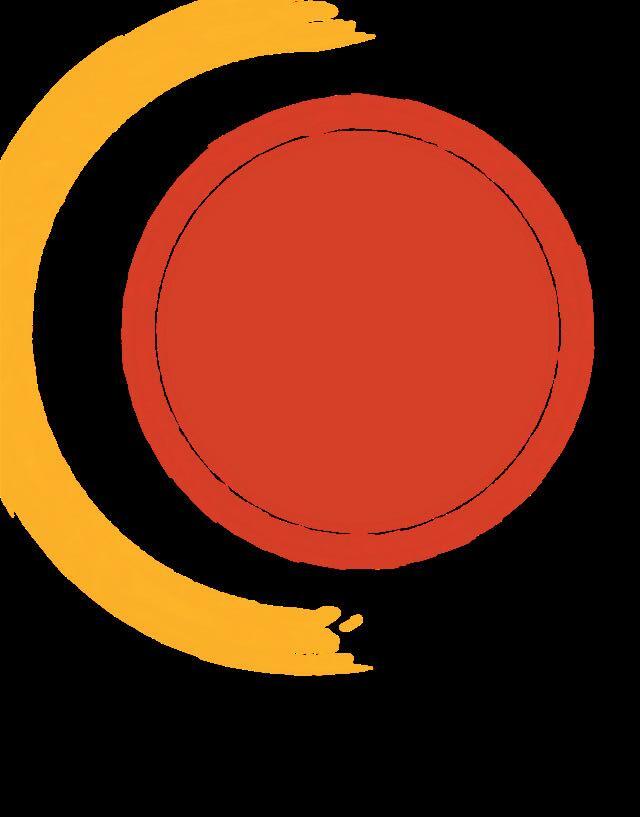
Top - Conversations with Administration

Following the death of Shaoxiong ‘Dennis’ Zheng on November 9th, 2021, conversations on safety increased around campus. As a high-ranking member of USG, I was involved in many of these. On November 16, 2021, a week later, the university announced a permanent increase in policing and surveillance and an expansion of the shuttle program and Lyft Ride Smart Program. These came before Zheng’s memorial service on Thursday, November 18, at Rockefeller Chapel.
I met President Paul Alivisatos in person for the first time at the Campus Discussion on Safety and Security on November 17th, 2021, where they discussed with the Chicago Police Department (CPD) the steps they’d taken and would continue to take to enhance safety and security on campus. In fact, those are my locs in the cover photo—I was one of the few student leaders invited to attend in person. Alivisatos shared that the university “invite[s] all parents and current students to be part of the conversation about what will help them
feel like they can be safe and do their best work here” (stated at 32:30). However, we were immediately excluded from this since both recent history and this discussion promote further violence in our communities.
Among many other macroaggressions, I was most offended when David Brown, Superintendent of the Chicago Police Department, made multiple jokes in response to the question on racial bias in their policing of Black and Brown communities (35:15 - 37min). What’s funny? After this, I started experiencing symptoms of a panic attack. As the only non-police Black person present in the room, I felt it was my duty to say something, to fight. At the end of the discussion, I raised my hand. After no recognition, I stood, and I don’t remember exactly what I said, but I began to speak. Audience members started rushing to leave and one person even told me that this wasn’t the time or place. I asked why since this was the current topic of discussion, and insisted that my voice be heard. Physically shaking and extremely emotional, I did my best to explain our systemic crisis, demanded that more voices (including those of Black students) be included in further decision making, cursed at the president and the university for their continuation of the violence, and stormed out in a fit of frustration. This wasn’t my proudest speech, but I believed it was necessary to speak up about the flaws and injustices of what had been said. If I could’ve done things differently, I would’ve still said “this is absolute bullshit,” but then I would’ve went on to calmly ask the unanswered question I wrote on the provided Q&A sheet an hour before: How does the university plan to prioritize the voices and experiences of students, faculty, staff and community members from marginalized groups in its decision making?

On March 4th, 2020, in USG’s first private meeting with Alivisatos and my second interaction with him, Tyler Okeke, who was Vice President of Advocacy at the time, asked the president if he would support measures to improve the transparency of UCPD, ranging from adopting the Freedom of Information Act (FOIA) to releasing the budget. The president’s
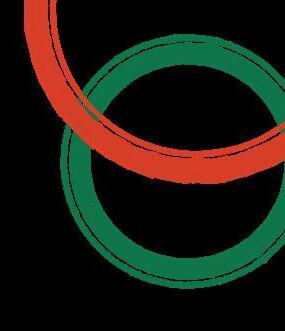

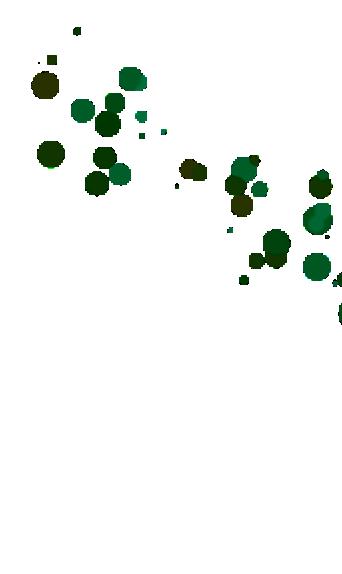
response was that they use UCPD how they want to use UCPD, and would not be adopting FOIA because the university is a private entity. However, in the November discussion, Eric M. Heath, Associate Vice President for Safety & Security and Superintendent Brown made it clear that the two departments agreed to collaborate on “long term strategic plans to address crime in the neighborhoods surrounding campus” (7:20). Shouldn’t a private entity (UCPD) that shares camera footage, license plate readers and other data while engaging in joint patrols and traffic missions with a public entity (CPD) be held to the same standards as that public entity (7:05)? I mentioned in this meeting that USG, elected representatives for the entire undergraduate student body, had a firm stance against increasing police and questioned why that, along with stances from other student groups about the negative effects of policing and anti-Black rhetoric like OBS and #CareNotCops were not being taken into account in their decision making. The president responded by saying that while our personal opinions on this matter differed, what he was interested in was creating wealth in the community. It’s always about the money.
You know that phrase, “It’s lonely at the top”? My four years at UChicago taught me that getting to the top isn’t about gaining popularity or climbing the ladders of some imaginary hierarchical system. It’s about taking our backgrounds and experiences and gaining as much perspective as we can in the spaces and conversations that we find important. As a first generation, low-income student with a need for safe spaces to grow socially, emotionally, and culturally, things like mental health and supporting marginalized student voices are important not only for my platform, but also for me. I was able to sit across the table from the highest ranking members of university administration, the people with the power to make substantial changes, share my story and discuss recommendations for future improvements. In terms of this, I can’t imagine many other students, specifically Black students, getting the amount
8
of exposure to the university, its administration, and its violence like I did. Still, I left campus with the sense that my voice, experiences and immediate communities were not administrative priorities.

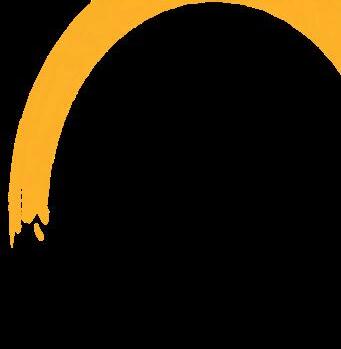
At some point, I realized that the administration, members of USG, and other student leaders had very similar roles: sourcing information on university life to make it better. The caveat is that some of us are getting paid millions to do, care, and listen less. If the university administration was listening like they say they do, they would hear what students, faculty, and community members have been saying for decades: the only way to ensure a reality of safety, rather than simply a “sense” of it is to radically heal our communities and end systemic violence. The success of this relies on all of us, on campus and off, working together to investigate, understand, unlearn and rebuild each facet of our current system to change it for the better.
View - Processing this Information


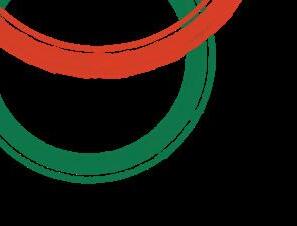


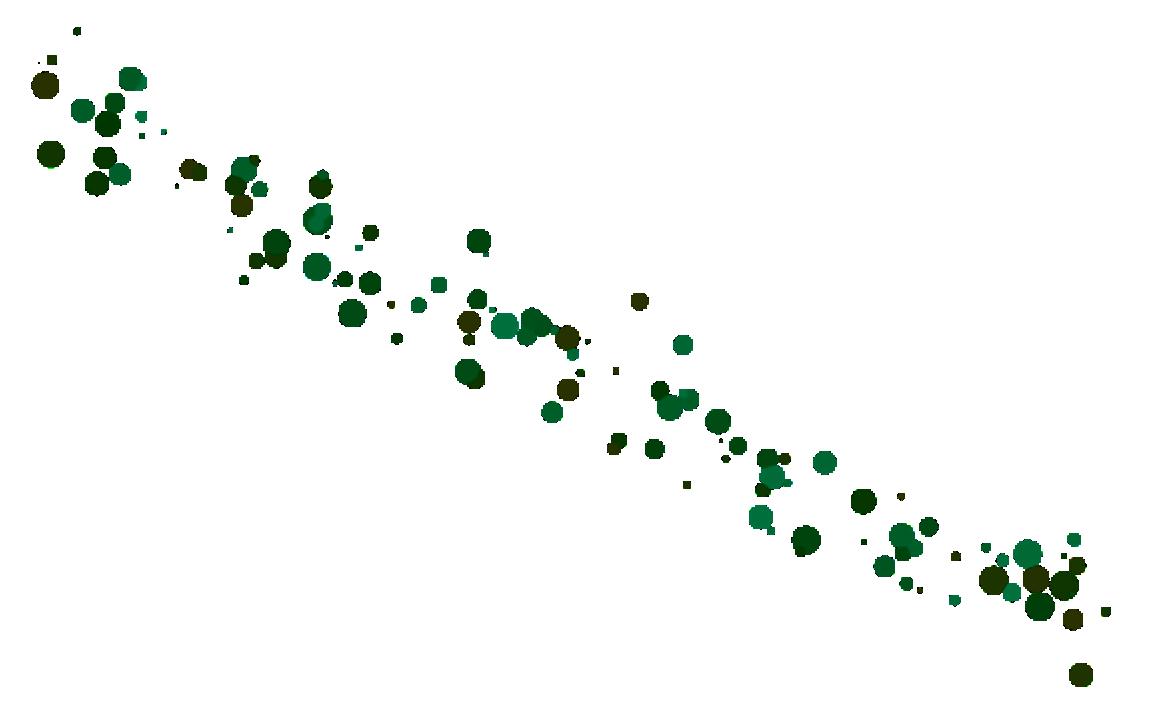
Around the same time, I saw that some of my closest peers were celebrating the completion of their theses. Did I do college wrong? What could I have done differently? What could I have deprioritized?
If I didn’t commit to exploring social spaces, I wouldn’t have gained the social and emotional learning skills that I missed growing up. If I had quit any of my jobs, I’d be even more in debt than I am now, and lacking the experience necessary to move into my desired field. If I’d quit Student Government, I wouldn’t have the knowledge I have now about administration. And if I’d quit GRO, I would have done a disservice to myself and the people I believe will benefit from the organization in the future. The leadership experiences I had have molded me into the best leader I’ve ever been. And the external financial, familial, and other things that came up were out of my control. Every single one of my experiences was necessary for me to develop this detailed view of university matters. I can’t pinpoint what exactly I could’ve done differently, but there’s more the university
could have done to support me, and by extension, other first generation, low-income, and Black students, in my identity and experiences.
Firstly, the university needs to hold themselves accountable to their part in the violence instead of gaslighting Black and brown communities. The original University of Chicago was founded in 1856, but closed in 1886 due to financial issues. Among the Old University’s incorporators were:

Stephen A. Douglas - slave owner and Illinois senator who argued for the continuation of slavery in the 1858 Lincoln-Douglas debates. Douglas donated the initial land and financial endowment to fund the Old University.
William B. Ogden - the first mayor of the City of Chicago.
John H. Kinzie - the second president of the Town of Chicago and the son of John Kinzie. John Kinzie purchased (some believe forcefully) the house and lands of Jean Baptiste Point du Sable in 1800 through his frontman, Jean La Lime. Du Sable was the first permanent non-Indigenous settler of Chicago, and was of African descent. John Kinzie later murdered La Lime, who was also an interpreter between the Indigenous People and Fort Dearborn in Chicago. This is known as the first murder in Chicago.
John C. Burroughs - the first President of the Old University who served as Assistant Superintendent of Schools for the Chicago Board of Education from 1884 until his death. In 1889, Burroughs also supported fundraising efforts for the erection of the current University of Chicago.
On July 7th, 2020, the university announced the Removal of Stephen A. Douglas Plaque and Stone which was mounted in the wall of the Classics building. According to the announcement, “As John Boyer, Dean of the College and author of The University of Chicago: A History, notes, Douglas died in 1861 and had no connection to the University of Chicago that was founded in 1890 as a new institution with a distinct mission.” How does a stone memorial of a man with no connection to a
university find its way to that university’s campus? In fact, according to the same book by Boyer which is quoted here, more than half of the new university’s trustees and donors (including John D. Rockefeller) had a relationship to the University of Chicago prior to 1890. This is the UChicago legacy, built on murder, theft, and lies, and while it’s not a legacy to be proud of, it’s a legacy that belongs to the university and one that it should own up to.
Secondly, they should provide students with the full extent of support they need to succeed. On June 3, 2022, I attended the Odyssey Senior Celebration at the Rubenstein Forum. There, President Alivisatos stood on stage and promised a room full of Odyssey graduates and their families, including me and mine, that the university would support us throughout the rest of our post-graduation journeys. I thought about my dreams of pursuing a career in the Behavioral Sciences, possibly returning to the university in the future to teach in its non-Black Psychology department, and bringing a missing perspective to the next generation of Black psychologists. I thought about how I received the results of my MAPSS application the day after our last meeting with the president in which I shared that I applied and he suggested that more could be done to prepare students for graduate school applications. I thought about how UChicago had the resources to make my dreams a reality and didn’t. This promise had already been broken to me.
Thirdly, the university needs to better support students’ individual and communal needs. Inclusive pedagogy doesn’t stop at expanding course materials. It also requires substantial effort in building and maintaining quality resources and spaces to accommodate and nurture the different backgrounds and perspectives that students come in with. Since application essays notoriously include information on these, I wonder what would it look like if the university used that information not only as a basis of application-based decision making, but also as a tool to provide personalized resources and support to each incoming first year. While there are some
9
students who come here only to learn, and don’t need much additional university support, some students, like me, will rely almost completely on university resources, and to make sure every student can truly thrive here, it’s important to fully meet each student where they are. Historically, students have recognized these needs and taken it into their own hands to meet them, but there is an entire department of Campus and Student Life that is tasked with doing this and needs to do more.
Fourthly, they need to do all this while encouraging a more true culture of collaboration with the South Side community. For instance, in 2022, South Side residents ranked mental health as the area’s top concern for both children and adults in a study done by UChicago’s Medical Center. Given this, and the nationwide shortage of professionals trained to provide mental health support, there’s room for UChicago to strengthen its commitments to diversity and inclusion in SCS and its Behavioral Science departments, to ensure that interested students, like me, receive all the training and support they need to best prepare them for future positive change within these fields. What would it look like if the university supported faculty and student research and innovation initiatives that directly benefit the South Side community, radically? Or accepting more students from surrounding communities who are committed to their communities, in mass? UChicago has been here for over 166 years and refers to itself as an “anchor institution on the South Side.” If the scholarship produced was being transformed into community impact from day one, both the university and the surrounding communities would be much better off today. Instead, the community has faced decades of divestment and now carries the burdens of poverty, violence, and low educational and vocational opportunity. As the largest employer and most violent institution on the South Side, the university is responsible for making amends.
Exit - Life after UChicago
Transitioning from UChicago has been incredibly difficult for me. Many of the resources I was dependent on are now gone. I graduated job-free and debt-secured with no solidified plan for post-graduation. Most of my peers have gone on to work or study either at UChicago or other institutions, and are breaking new ground and doing amazing things. I am so proud of them.
After months of job searching, surviving on SNAP and Medicaid benefits, I once again found myself seeking a space that didn’t really exist and became motivated to create it. I am now walking in my divine purpose as founder of Mickle Muckle, a
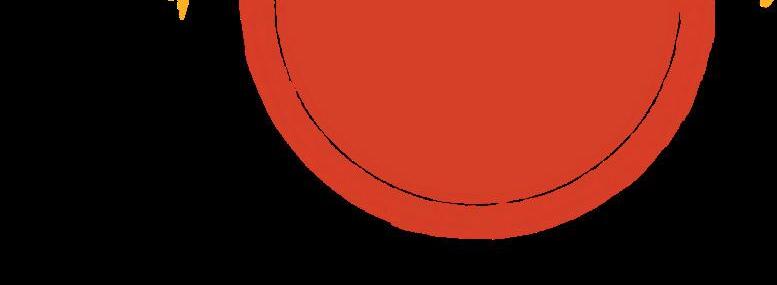
I will end with this:
Black and Brown students, faculty and staff : Don’t be complicit, make your voices heard. Find your people and free yourself. Learn about this institution and its history and keep the administration accountable for their actions and policies. Stop trying to meet other people’s standards for you, especially when many of them are rooted in oppression. Make your mistakes and learn from them. If you knew better you wouldn’t have made the mistake in the first place.
White and International students, faculty and staff : Remember every day that people have suffered and continue to suffer to keep your life comfortable. If you continue to be impartial to that, you are part of the problem. Seek guidance on what a microaggression is and stop committing them.
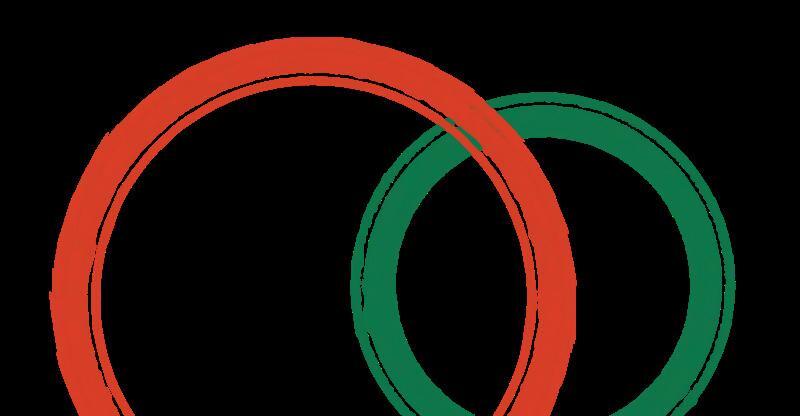
non-profit organization which aims to cultivate spaces of healing, learning, and mutual aid to enhance the lives of Black youth and prepare them to make positive and sustainable impacts in their communities and the world. With the knowledge, experiences, and relationships that I have built and sustained so far, both on campus, on the South Side, and in my other communities,

I am excited and optimistic about what the future will hold. All things considered, I can truthfully say I feel blessed and honored to have attended the University of Chicago.
The University Administration : At the recent colloquium celebrating the the 25th anniversary of the Pozen Center for Human Rights, Ayça Çubukçu, associate professor in Human Rights stated: “We’re living in a moment when international organizations are unable or unwilling to hold the most powerful states accountable. As far as the future of human rights is concerned, we need to think beyond these institutions and critique them at their roots.” The university is not exempt from this. President Alivisatos, my question remains: Will you go down in university history as another white man that endorsed systemic racism? Or are you prepared to do something different? Is UChicago prepared to make radical change? Since its founding, the University has participated in and benefited from the commodification of the lives, labor, land, knowledge, education, health, culture and experiences of Black and brown people, on the South Side and beyond. There is a debt that is owed, and I can imagine that investing each university resource and every penny of the endowment for the next 25 years will only begin to make a dent.
10
“Remember every day that people have suffered and continue to suffer to keep your life comfortable. If you continue to be impartial to that, you are part of the problem. Seek guidance on what a microaggression is and stop committing them.”


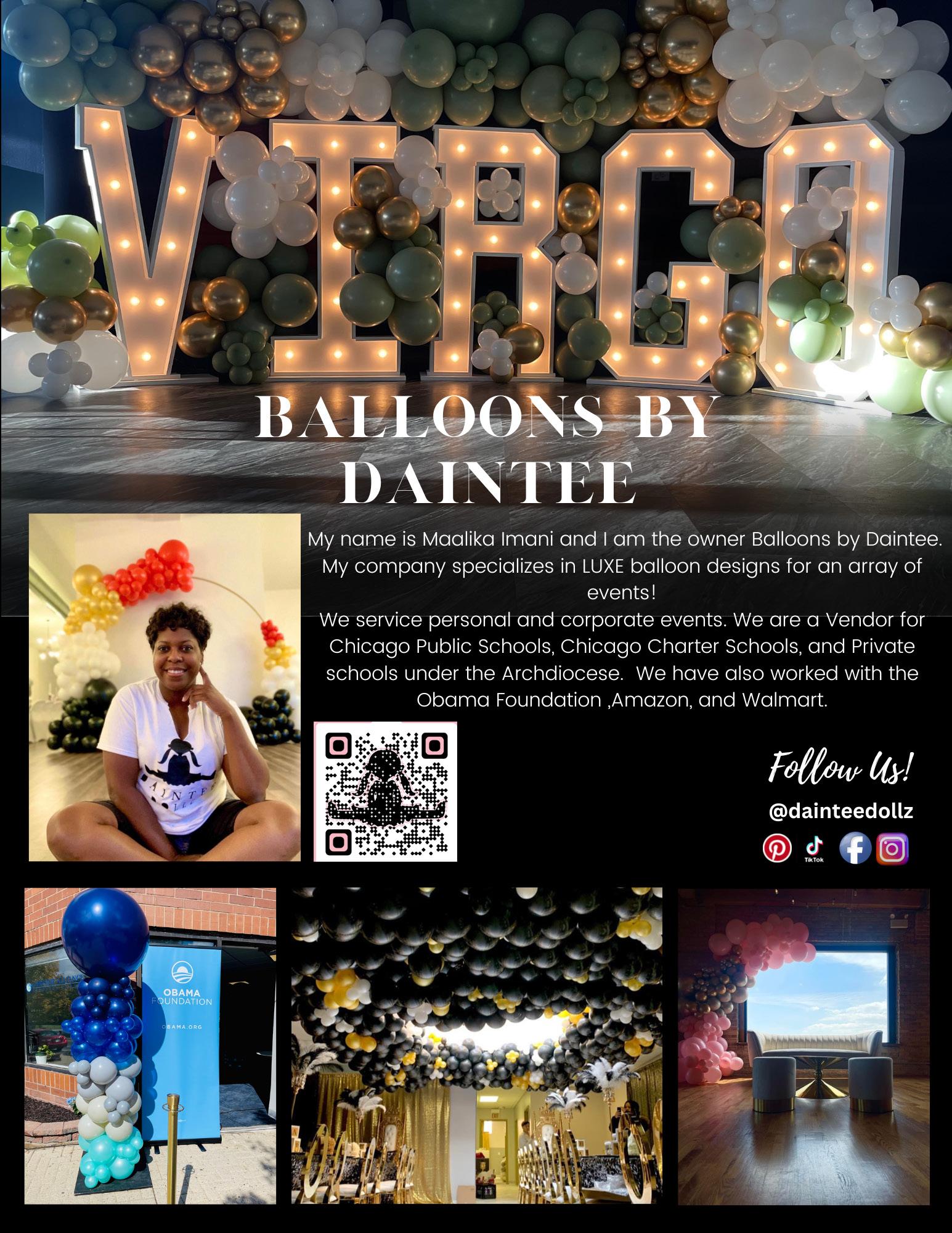
11
What It Means to Be Black (Who Gets to Claim It)

IBUKUN ODELEYE this argument is invalid.
Black. Is it the description of a phenotype? Is it the definition of an individual who comes from a particular background? Is it a culmination of experiences? Does possessing Black genes make one Black?

In our current society, there are many ways people define Black, and many different opinions on what qualifies a person to be considered so. Some may argue that a person is Black because their physical features present that way, while others may argue a person is Black simply because they have Black ancestry. Some may say that one can be Black by proximity, whether that is growing up in a Black community, or being raised by Black parents. Some may say they are Black because they have been treated as such their whole life. But what does it really mean to be Black, and who gets to claim it?
One argument is that being Black isn’t based simply on appearance but also on one’s personal characteristics. Some people argue that even if a person is Black-presenting, if they have alternative interests to what is stereotypical to Black people, then they aren’t “truly Black”. The problem with this argument is that it limits the potential of Black people as individuals, characterizes us as a monolith, and reduces the characteristics of Black people to a set of actions instead of a physical identity shared by a variety of people who have varying personalities. Being Black is not merely liking rap music, dressing a certain way, using African American Vernacular English (AAVE) every time you speak, being athletic, growing up in a low-income environment, or any of the other stereotypes used to categorize Black people. If that were true, it is then possible for a non-Black person to “act Black” and by default feel as though they partake in the Black experience. It is not possible to be Black by proximity. Relating to Black experiences doesn’t make you Black, so



However, while being Black is not simply a set of character traits, I do believe it is possible to be out of touch with one’s Blackness. There is an experience, a culture that surrounds being Black; though there are many variations based on nationality and ethnicity, as Black people, we can relate to a certain culture that is unique to us. This culture means different things to different people, but in the same way that many other racial and ethnic groups relate to each other on the basis of race or ethnicity, the Black Diaspora is connected through cultural awareness, which can be described as a knowledge of one’s traditions, customs, heritage, and history.
other Black people. Because of this, many choose to assimilate themselves to Eurocentricity. They begin to despise the things that socially make one identifiable as a Black person: their hair, their culture, and even connections with other Black people. This assimilation causes one to be “out of touch”: When they go into the world where race is first base in categorizing a person, they cannot cope because they don’t understand what it means to be Black outside of the physical traits. Many of them struggle to find solace in other Black people because their whole lives they have been deprived of their Black identity.
This cultural awareness is a part of what it means to be Black.
Oftentimes, when a Black person is not raised around this cultural awareness, they do not develop the inclination that many Black people share. This can cause a feeling of disconnect due to being sheltered by their family, social status, or environment from the struggles, culture, and experiences that Black people face as a community. This lack of exposure deprives one of a safe space and community that can only be found among
On the flip side of this, there are people who think because they grew up in a Black community, or possess some Black genes, they by default they must be Black too. We live in a society where your phenotypical race plays a huge role in your treatment. There are so many struggles the Black community faces on the basis of phenotype. If a person is to go into an interview for a corporate job and the interviewer is racist, they are going to be treated based on what the interviewer can infer from how they look. White-presenting or racially ambiguous people are somewhat free from the stigma and stereotypes that come with being Black because they are not identifiable to the potentially racist others. There is a certain level of privilege that a white-presenting or racially ambiguous person is granted because, without any prior knowledge of background, they are not mistreated the way a Black person would be, regardless of whether or not they possess Black genetics. If a person has to actively validate or prove their Blackness with their grandma’s pictures, it is because they are not phenotypically Black, and they should probably take a step back and reevaluate what they think qualifies a person as Black.
Many people still use the one-drop rule and other harmful ideologies to categorize
12
“There is an experience, a culture that surrounds being Black; though there are many variations based on nationality and ethnicity, as Black people we can relate to a certain culture that is unique to us.”
someone as Black. The only mixed-race people in the 1950s that were able to pass were the ones that the white people could not identify. This proves the point that society treats (treated) you based on your phenotype. And who can blame them for doing so? No one wants the burden that comes with being Black. It is a privilege to be able to decide when and where you want to be Black, and many people knowingly or even unknowingly use it to their advantage. If you are half Black genetically but you phenotypically present as something else, no one is looking at you and judging you as a Black person because your genetic makeup is not present in your looks. You may be part of a minority community, but if you have pale skin and loose, blond hair, the world does not discriminate against you in the same way. Your natural hair is not being called unprofessional, you are less likely to be called slurs, your intelligence is not being questioned, and the stereotypes that a Black person has to deal with do not apply to you on the basis of race. The only way you would be associated with the Black community is if you were seen with your Black/mixed family members or if you showed a photo. You have the ability to deny your Blackness when it is convenient, and no one would bat an eye. You are absolved from a lot of the race-based discrimination the Black community faces because you are not a Black person. Now that doesn’t mean you don’t feel the effects of racism and the impact it has on the Black community, like a lack of significant resources, but your societal image is not compromised because of your physical appearance.
There are people who feel that because phenotypically Black people are affected by issues like employer discrimination (on the basis of race) and can therefore relate with Black people from this shared experience, they get to categorize themselves as Black. This is harmful because it reduces Blackness to a set of “universal” experiences and struggles, treating Black people as a monolith. When a person who is not a part of a minority claims to be part of the marginalized community, it undermines the struggle that that minority goes through. There is a distinct difference between culture and experience. Relating to the experiences of a Black person


doesn’t make you, yourself, Black if you too are not also phenotypically Black. There is no such thing as being Black by proximity to experiences because if that were the case, many other minority groups could claim Blackness since the issues they face are comparable, which doesn’t make any sense.

This is not by any means an argument that mixed-race people should not acknowledge their heritage, but one can never fully understand the Black experience without possessing the identifiable, physical traits. Meghan Markle is a prime example. She is a mixed woman who could very easily pass as white to some people. She even stated that she didn’t claim to be Black and wasn’t considered Black until she was launched into the spotlight. Yet many Black people adopted her into the community, despite her not
Black. A person is Black because when the world looks at them without knowing their history, what their parents look like, what they experience, it sees a Black person. A person is Black because it is a phenotype, because they exhibit the features and physical qualities that are shared amongst the Black Diaspora.
Story Behind the Story
SYDNEY COOK
originally identifying as Black. Now, she speaks on racism and her experience from the viewpoint of a visibly Black person because she has had a taste of what it’s like (and for that I salute her) and has used this view to build a platform for herself. But the reality of the matter is that her physical appearance hasn’t changed, and it is very likely that she would never have experienced the things she is now dealing with had she never been put under public scrutiny on the basis of her racial background. There are many people today who only claim Blackness for the immediate benefits; no one wants the long-term burden that comes with it.
So while the Black experience is something we share as Black people, that in and of itself is not what makes us Black. A person is not Black simply because one of their parents or grandparents is. A person is not Black because they like things that are stereotypically

Collection of Photos
CYRAH
13
“So while the Black experience is something we share as Black people, that in and of itself is not what makes us Black.”
GAYLE
Black Art Showcase
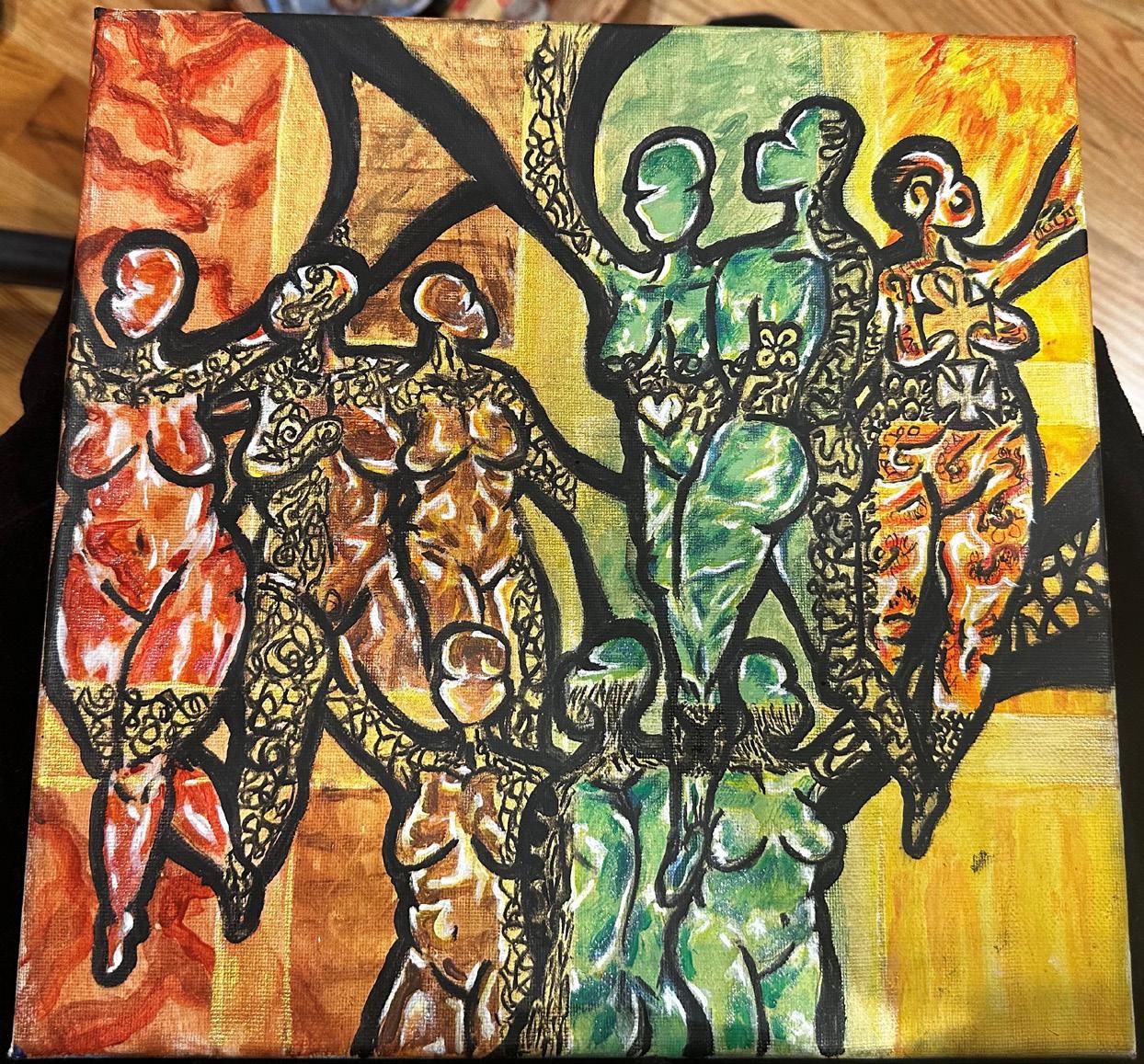
K al H aile
Through every terrain, obstacle, and major event, Black woman will prevail. Every direction we turn our heads they are there, watching, guiding, smiling, crying, and protecting. “H’er Whey” is an ode to our ancestral mothers who look over us then, now, and wherever their children’s head lay.
U r U nna a nyanw U
My piece was done with digital media and the art program Krita. In my piece, a white hand is holding a candle, melting the Black woman’s skin, representative of the forceful removal of Africans centuries ago. Despite the eternal candle continuously melting her skin, she paints it back herself, similar to the ways different Black communities of the diaspora have rebuilt and embraced their individual cultures over the years. Like Sankofa, the many unique Black communities are retrieving strength and beauty for themselves despite the hardships imposed upon them by outsiders.
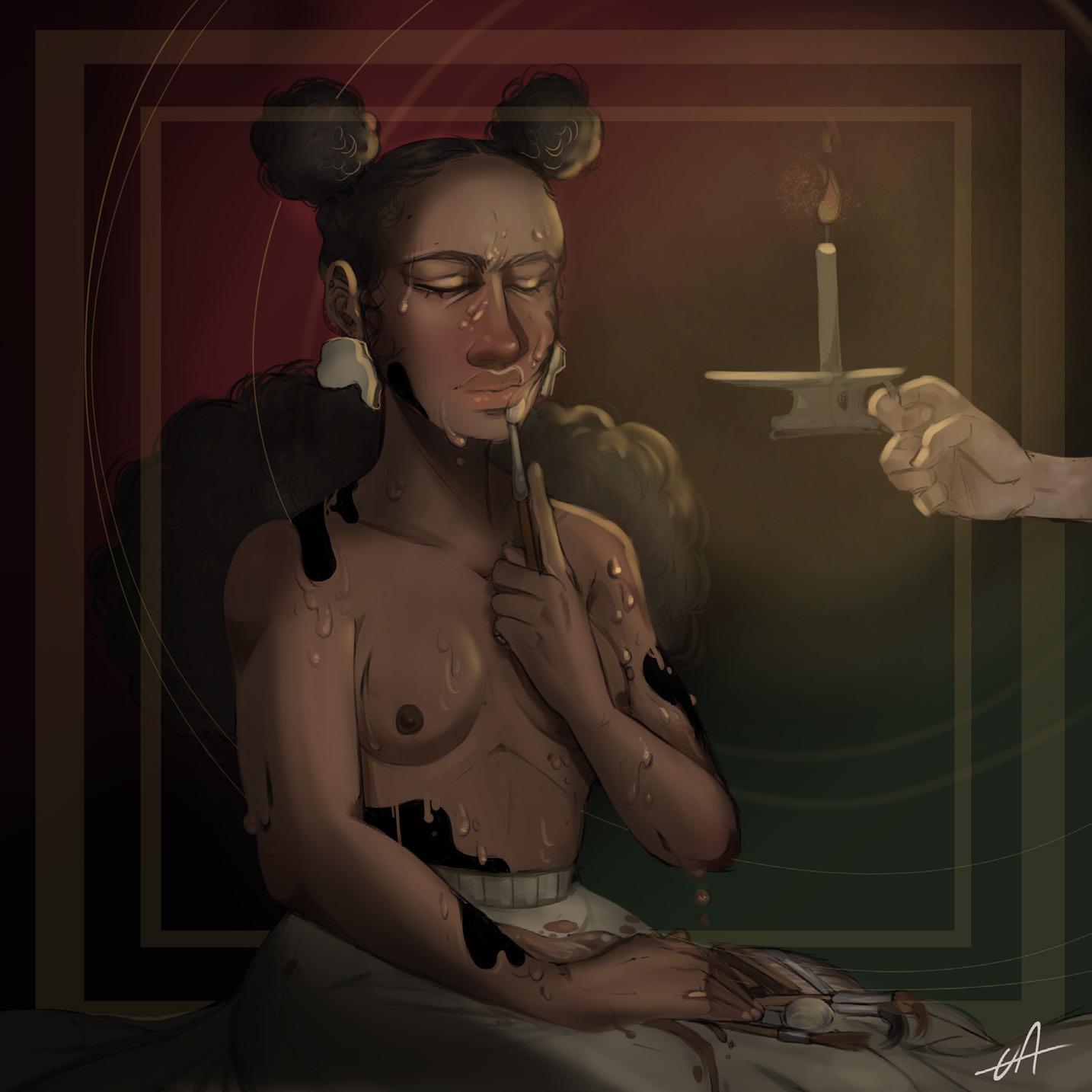
14
KAL HAILE
S avanna H B owman
“Decriminalization
2020

of the Durag”
Dried flowers and acrylic on Canvas
Pieces 1 and 2 of the “Decriminalizing the Durag” series
These portraits seek to juxtapose the delicacies of nature and the perception of Black men. Simultaneously, it sheds light on a cultural staple: the durag. This is a prominent piece in Black culture with a history that can be traced back to the 19th century.

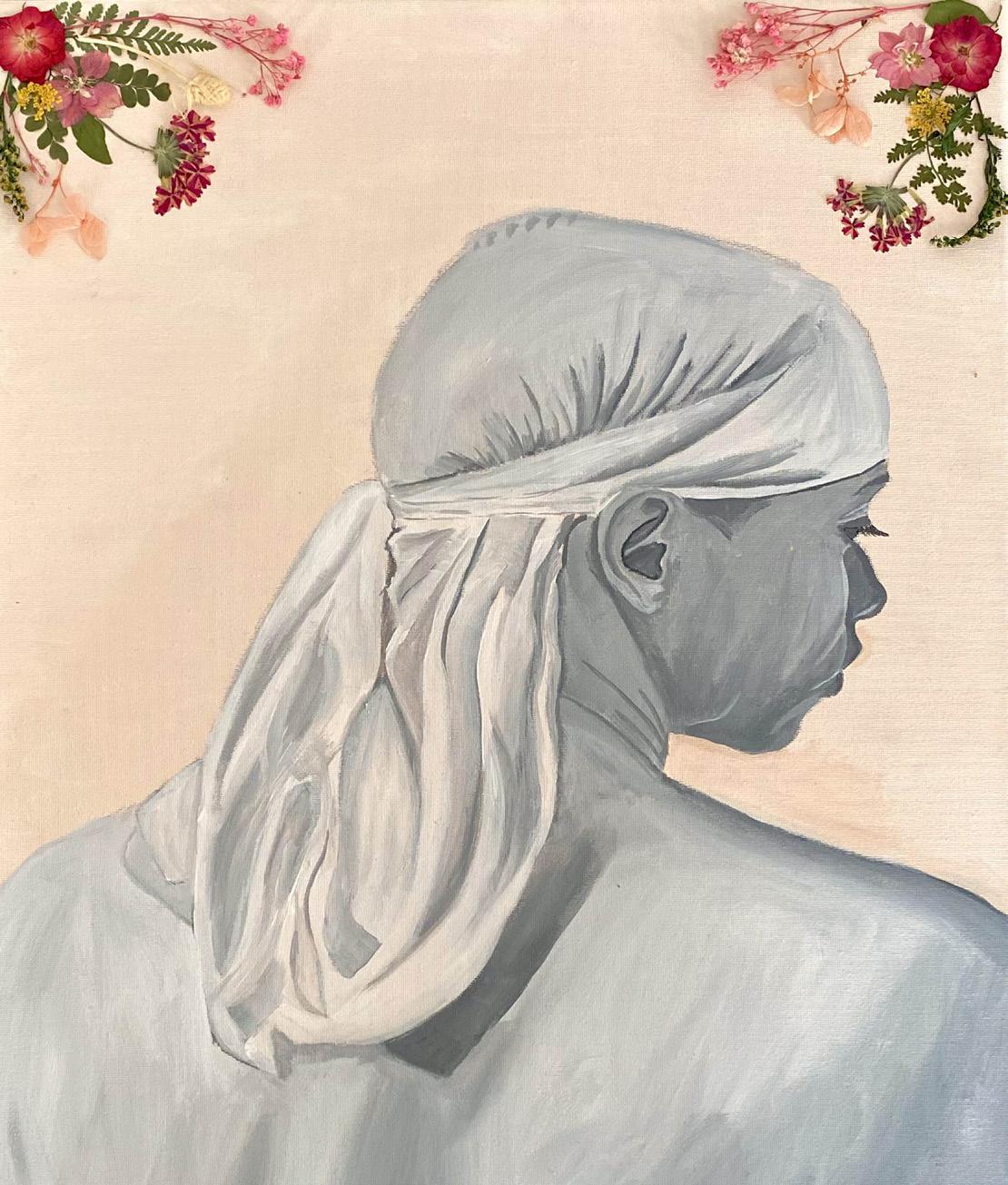
The pieces use the intimate and unique placement of eyes and flowers to depict our connection to the earth and its influence on our perception of the world. We water our eyes with our lived experiences hoping to grow lush gardens full of culture, beauty, and Blackness but understanding that darkness seeps in from time to time.
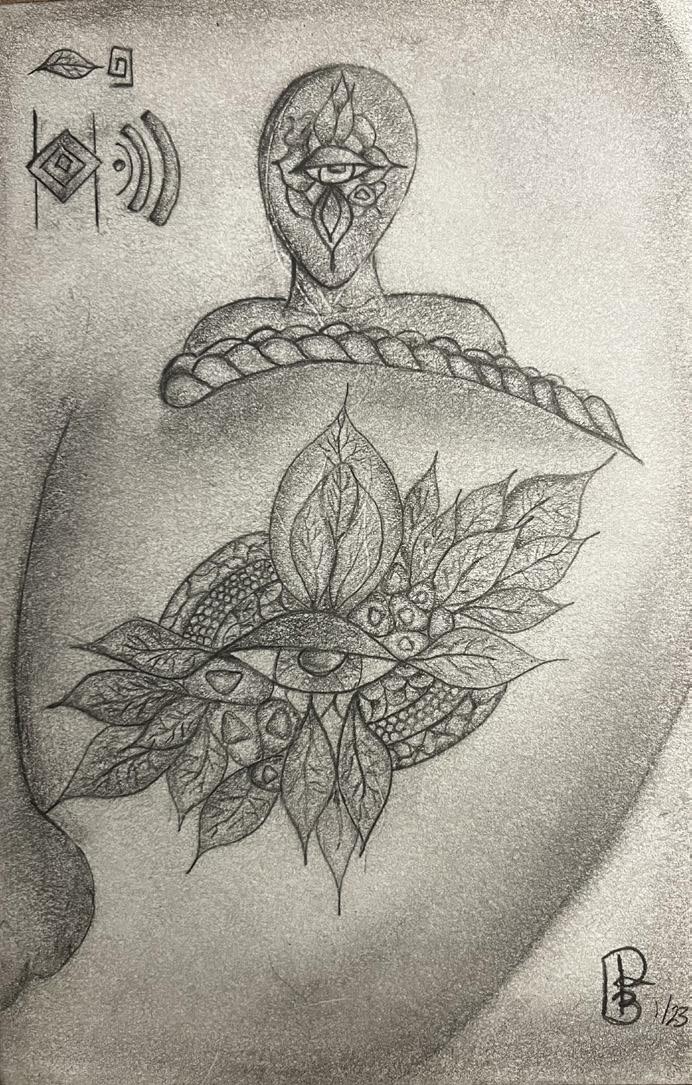
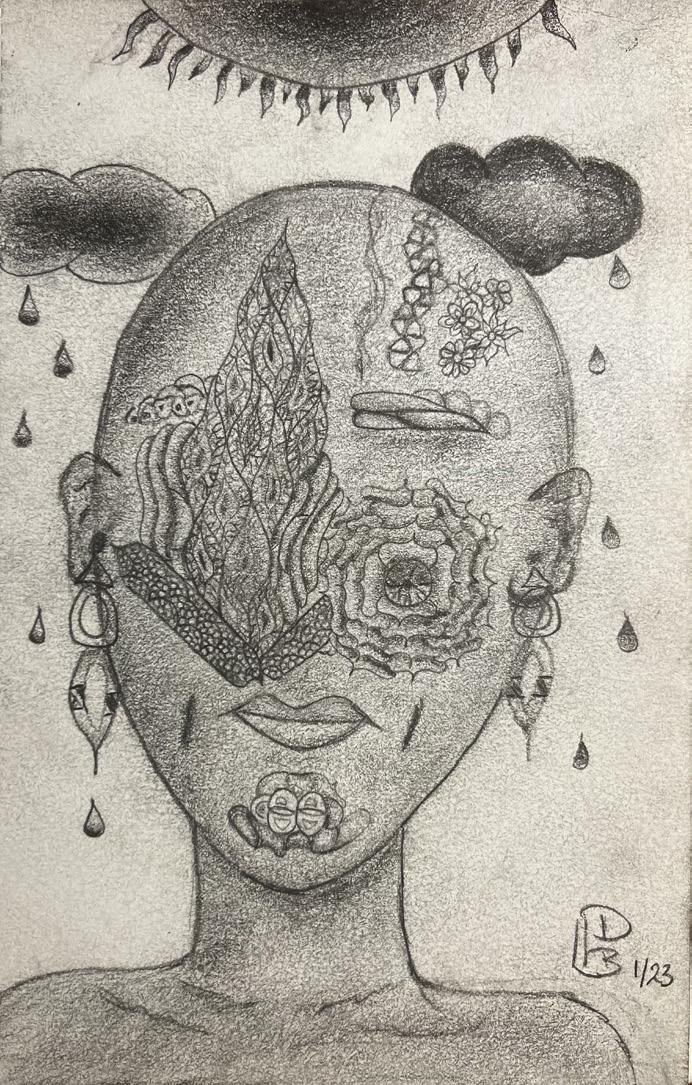

15
D e S tin B U n DU “Green Eyes”
6x8 2022 Graphite, oil graphite on Cartridge paper
S ara H G aUD ron

This collection of images serve as hallmarks in my photography journey. For every picture, I can vividly remember what mood I was in and the excitement that I felt to capture the next shot. More importantly, these pictures represent the memories that will connect me with so many beautiful black people I have met on this campus. I have had the privilege of directly engaging with their beauty, talent, and energy in one of the most intimate forms of art. For that, I am grateful that with every step I take further into my artistry, I do it emboldened by the essence of black euphoria all around me.
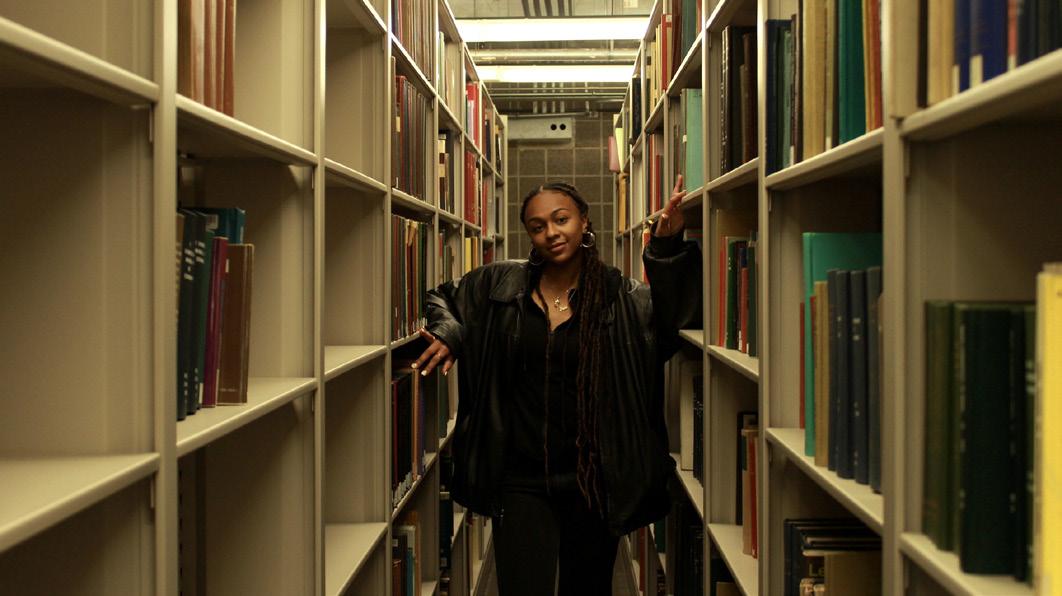
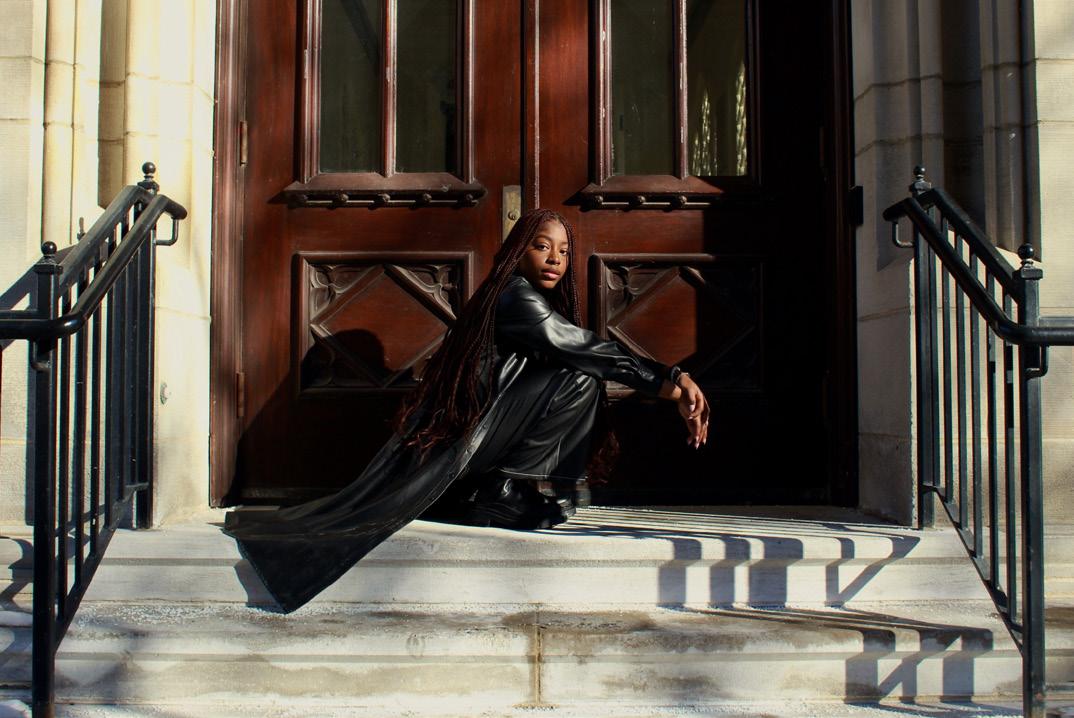

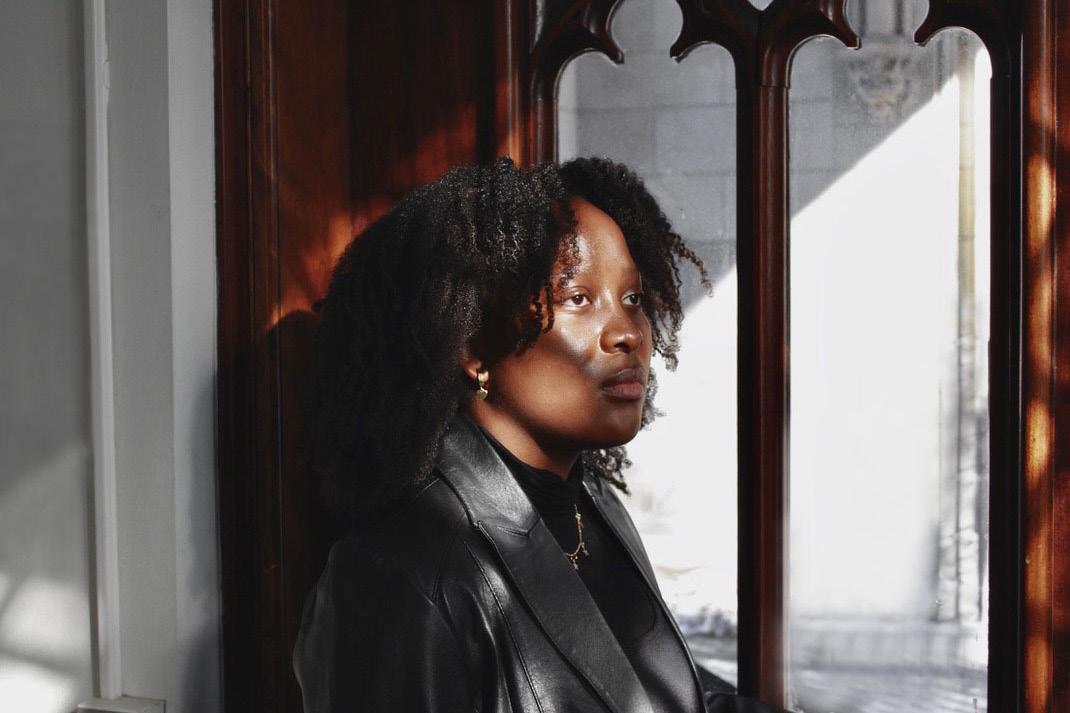
16
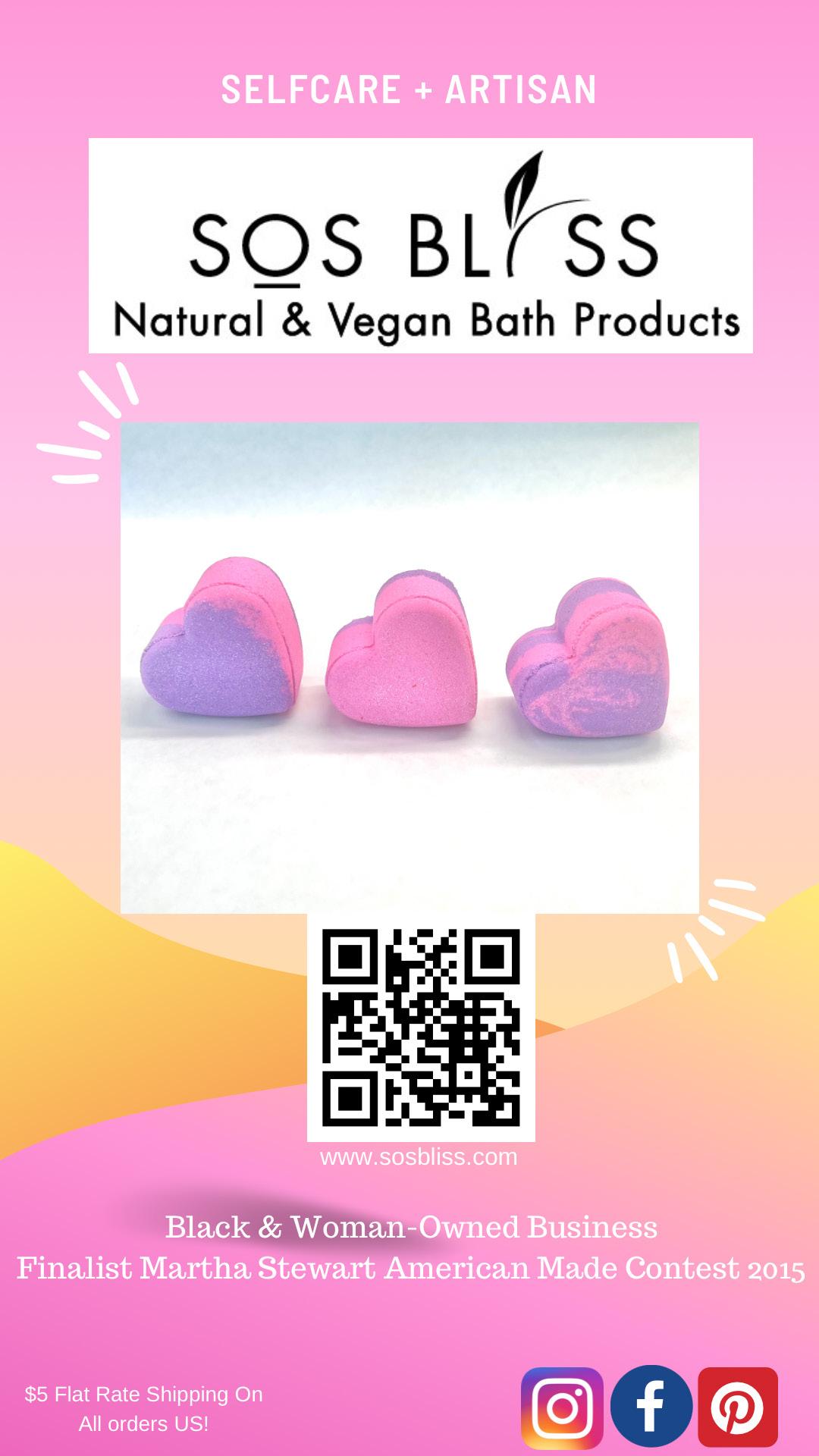
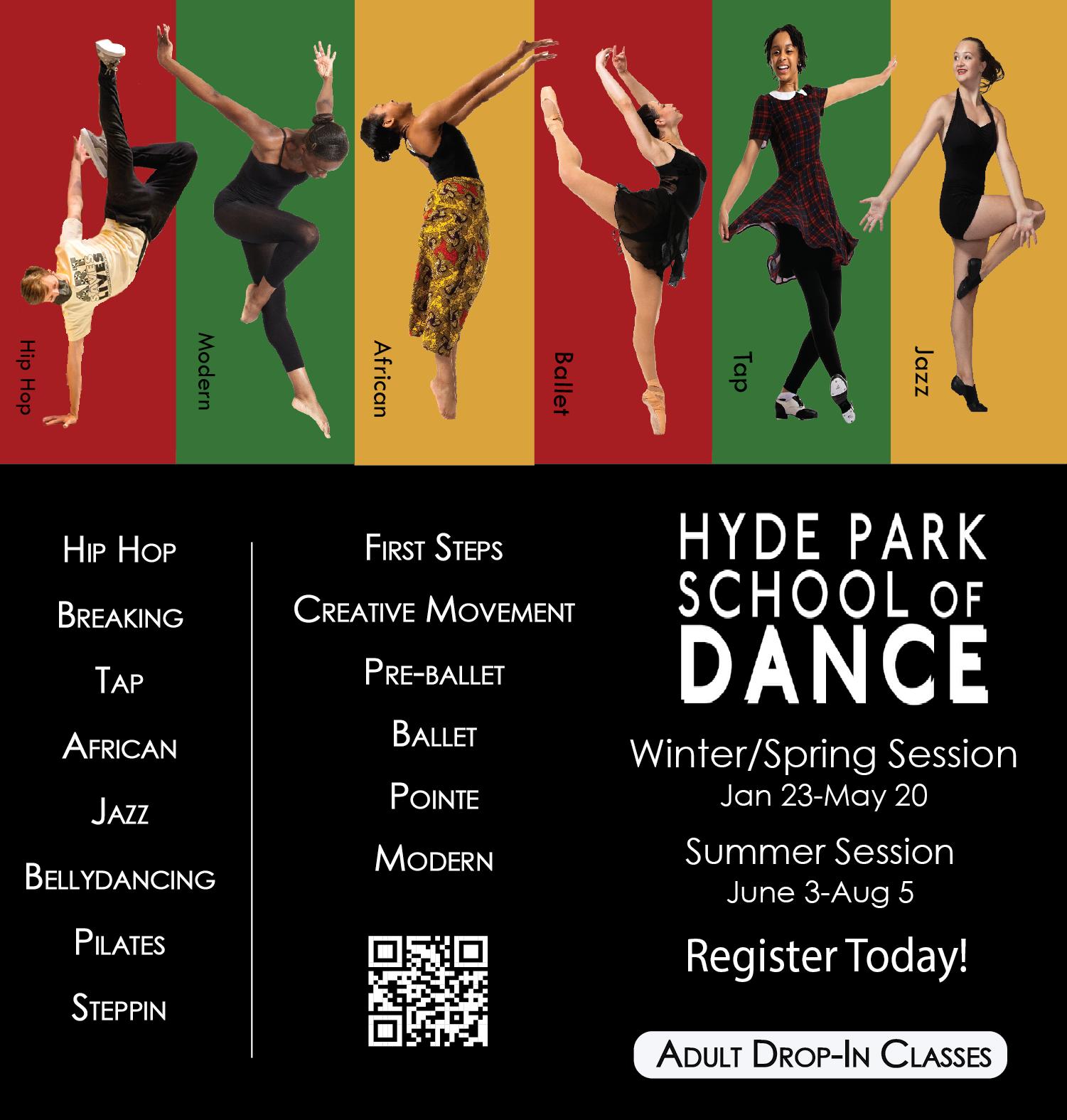

17
A (Sort Of) Nigerian Princess Diary
SOLANA ADEDOKUN them.
A major part of Black History Month is celebrating the achievements of Africans and African people across the diaspora. And there’s a lot of Black excellence–which is the idea that Black people who have a high level of success, achievement, or talent should be highlighted for other members of the diaspora–to celebrate.

Yet there is one aspect connected to Black excellence that is worth emphasizing. We call ourselves kings and queens, yet, for most of us, we do not have any clear-cut connection to any royal African roots. In fact, a joke heard time and time again is a Nigerian prince trying to contact someone, his long-lost family member, to share his wealth. But for me, being contacted by a Nigerian royal, an actual family member, is very real and something that has happened to me.
Now, granted, it wasn’t exactly like The Princess Diaries where I was immediately whisked away to my homeland in order to become an active member of a royal family. That being said, my dad did casually mention over Thanksgiving break two years ago that my uncle we’d be visiting later in Nigeria was a king (and actually had been a king for two years—thanks for sharing late, Dad!)
Once I heard this, I had so many questions. I wanted to know about him, my family, and the specific group of Yoruba people my dad’s family comes from: the Gbagura. When I got to Nigeria and met my uncle after not seeing him for some time, I asked him so many questions that he got one of his head chiefs to come and help him answer
Here is the story of my family, my people, my uncle the king, and why Black African royalty still matters in our celebration of Black History Month and today’s world.
In Nigeria, there are three main tribal groups: the Hausa in the north; the Igbo in the east; and the Yoruba, the one I’m a part of, in the southwest. Within each of these tribes, there are many, many subgroups, and each subgroup usually has its very own

migrated to the present-day area between Ibadan and Abeokuta, both major cities in Yoruba territory. In the early 19th century, the Gbagura people became a major force within the area and attempted to form an Egba Federation. They did this in order to obtain independence from the Ilaris, who were emissaries of the Olooyo, another tribal group.
The Gbagura overtook and fortified Abeokuta, solidifying their independence and remaining a powerful force in Nigerian politics. In fact, the first Agura of Gbagura, Oba Jamolu, ruled from 1870–77 was from my uncle’s—and therefore my—family lineage.
Today, the Oba presides over a dominion of 19 townships. “As the prescribed authority over Gbaguras, my primary responsibilities to my subjects are to ensure peaceful coexistence amongst the citizens and development of the various communities [and]...settlements of land disputes among the citizens as they arise,” Oba Bakre wrote.
specific traditions, including how they traditionally choose their ruler. Because of this, there are a lot of tribal leaders/kings, called obas in Yoruba, around the country.
My uncle’s full name and title is Oba (Dr.) Saburee Babajide Bakre, Jamolu II, Agura of Gbagura. Specifically, he is the king of the Gbagura people, a subgroup of the Yoruba people, in Egbaland in Nigeria. He and I are related on the maternal side of my father’s family.
According to the history told by my uncle and his court, the Gbagura people
Additionally, the Oba can give titles to “deserving” Gbagura people at home and abroad in the diaspora, making the concept of Black kings and queens, at least politically, a reality.
Since Gbagura functions much like other kingdoms, the Oba has the final say on any matter. Despite this, the Oba has a complaints committee that can adjudicate disputes. It is made up of the Oba and five chiefs he has selected. He also meets monthly with the heads of each township to head the Gbagura Council of Baloguns and Chiefs to discuss matters of state.
18
“Here is the story of my family, my people, my uncle the king, and why Black African royalty still matters in our celebration of Black History Month and today’s world.”
With the rise of the concepts of Black kings and queens, one can wonder, what does it mean in this day and age to actually be Black royalty, and what role does it play in the greater Black Diaspora?
Besides many political powers that make him stand out from the other chiefs, the Oba also wears different traditional dress than the other chiefs. An Oba always wears a crown, complete traditional dress, a walking stick, a horse tail, beads, and special shoes. Additionally, because he is forbidden to touch people outside his family, he holds a greeting stick to greet his subjects and others outside his domain.
However, one of the most fascinating parts of the Oba’s rule is how my uncle was chosen. There are only two ruling houses that can produce an heir to become the Agura of Gbagura. They are the Egiri Ruling House, made up of the Jamolu, Ijade, Abolade, and Adeosun families, and the Jiboso Ruling House, made up of the Olubunmi and Shobekun families. My uncle and I belong to the Egiri Ruling House, just like the first Agura of Gbagura.
Once the Agura Oba dies and a 90-day mourning period is observed, the Kingmakers of Iddo Traditional Council of Chiefs, made up of six Ogboni and six Ologuns (chiefs), allow applications to be taken for the position of the Oba. Qualifications are based on criteria coming from a candidate’s respective ruling house, educational qualifications, and work experiences. Then, after a round of interviews, seven out of the 16 candidates are requested to step out of the race, leaving only nine. The nine go through “additional screening”, and the final three are brought to the Ifa Oracle, who determines who will actually be Oba
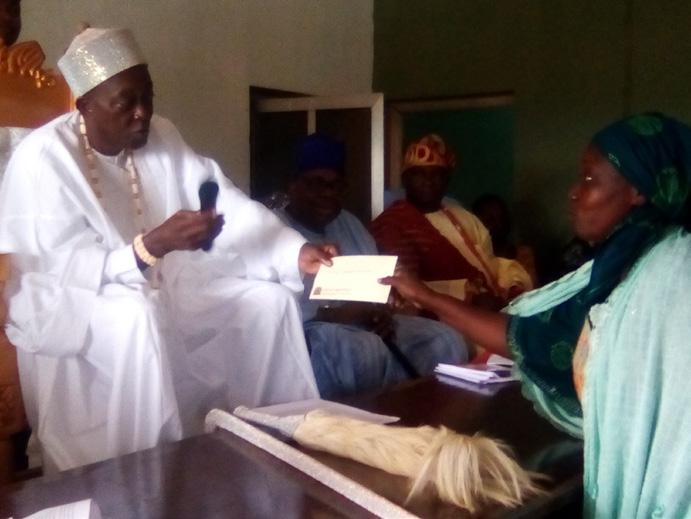

“Another phase in the Obaship process was the seclusion stage which lasted for ninety days in which I went through the rites of Obaship as Agura of Gbagura. My freedom of movement…[was] curtailed,” Oba Bakre wrote.
Before assuming the throne, the current Oba lived a fairly normal life. He was born in 1960 to Prince Rasaq Olayinka Bakre and Alhaja Latifatu Bakre Adeghite, both from Gbagura. He spent time in Ibadan, Abeokuta, and Isolo for school until 1981, and received a degree in business administration in 1986. He worked for the Nigerian Customs Services and became chief superintendent of customs, leading him to work in various parts of Nigeria. Today, besides ruling, he spends time with his wife and family, along with devoutly practicing his Islamic faith.
This system is interesting because of how differently it operates from the traditional, European monarchies Americans are used to hearing about. In other words, obas, at least in Gbagura, aren’t raised as royalty and have a fairly normal life. This practice is something that ties into and reinforces the idea of Black royalty: Black Americans may not be born into as favorable situations as other American citizens, but instead, they find themselves taking initiative and seizing opportunities given to them to achieve the greatness connoted with Black royalty.
Despite this rich culture and system of governance, the world today is trending more and more towards democracy, putting less of an emphasis, politically and socially, on kings and queens of yesteryear. A notable example of this is former prime minister of the United Kingdom Liz Truss calling for the abolition of the British Monarchy when she was younger. Because of this, what does it mean to be not just a king in our modern world but a Black king?
During British colonialism, much of the power local Obas had, including being
selected by their own people, were transferred to the British colonial government and, subsequently, the Nigerian national government. For the Oba, he believes that it’s important for traditional institutions to play major roles in how Nigerian people are governed.
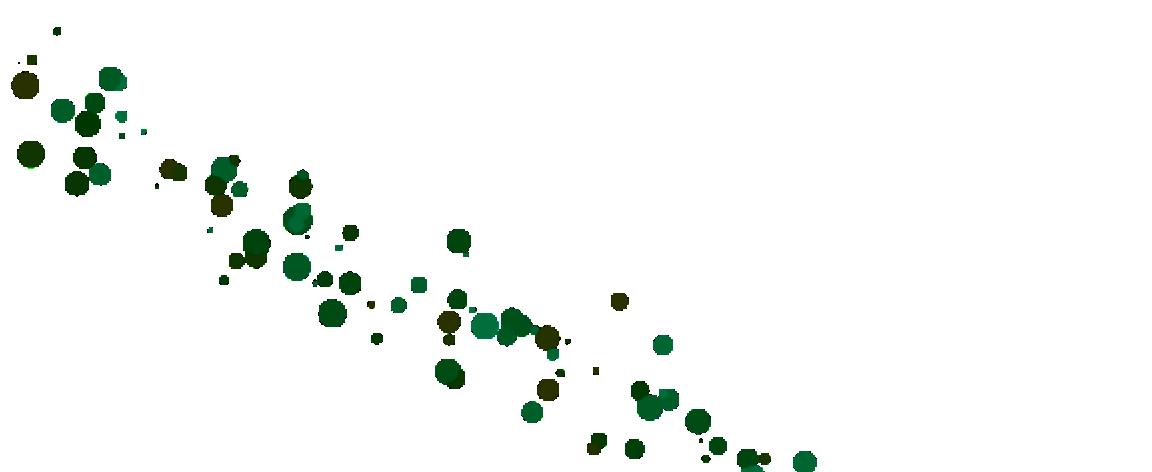
“Because of the closeness of the traditional institutions to its people it is germane to assign specific duties to them which should be spelt out in the Nigerian constitution. [D]uring the colonial period, Obas were appointed as President of the District Council in their area of locality,” Oba Jamolu wrote. “My people have a crucial role to play in the elections of who to govern them based on the principle of democracy.”
Though on a much larger scale, Oba Jamolu’s actions are similar to that of what we see in African-American culture of the idea of a Black king (similar to a Black queen): a Black man who possesses admirable qualities that makes him not only a great leader, but a person others in the Black community can look up to. In other words, it’s possible to suppose Black royalty serves a much more socio-emotional component than its African counterpart. Royalty connotes a sense of leadership, success, and excellence, an idea that serves as a method for Black Americans to empower themselves.
With many tribal cultures during the slave trade being subsumed into more of a monolith, it is both fascinating and a testament to Black Americans’ resilence keeping that tradition alive to remind ourselves that we are more than what the world may pigeonhole us to believe that we are.
As it relates to Black History Month, I feel it is important to acknowledge and learn about these ancient, yet living, relics of Black culture. It is important to empower ourselves at home but also uplift and educate ourselves on members of our diaspora that have major influences on society.
19
“This practice is something that ties into and reinforces the idea of Black royalty.”
UChicago Black House Campaign
Securing a Physical Black Space at UChicago
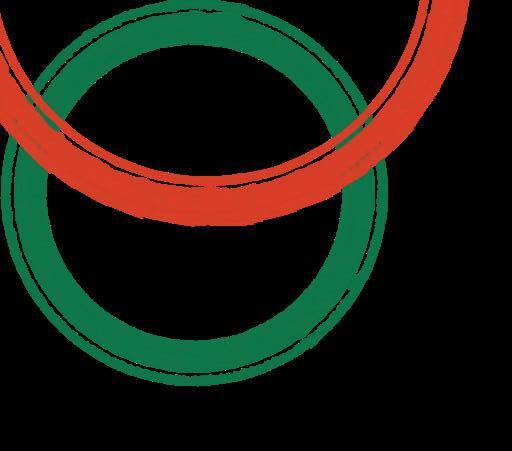
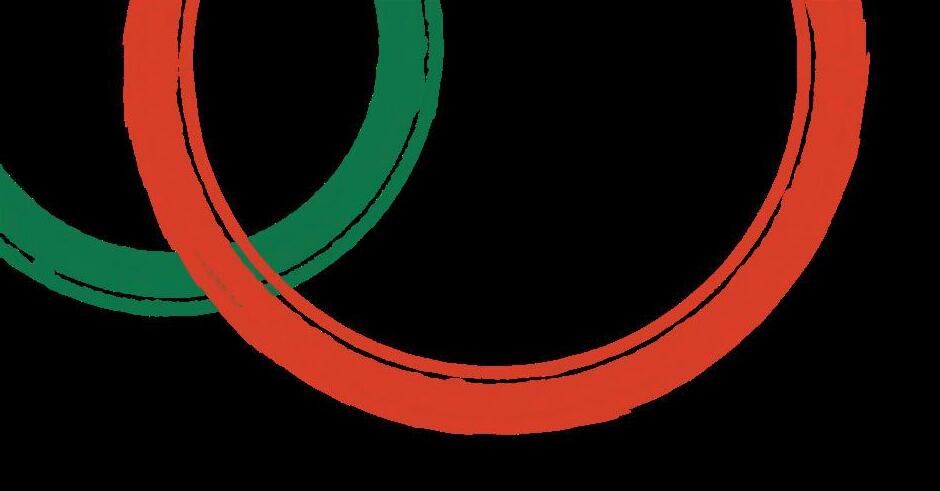



ARSIMA ARAYA got the better end of it. However, it is no longer enough—and never was.
“How can we have a Black House if we can’t even have a Black meal,” –Charles
Hendon ’25
This scolding, yet endearing, quote is all I can think about when asked to write a preface to the report on the Black House campaign that I have the honor of forerunning out of two of the premier Black student RSOs: Organization of Black Students (OBS) and the African and Caribbean Student Association (ACSA). Charles Hendon, a brilliant French and Spanish major and aspiring educator, is referring to my not coming to fourth meal. Every night, a significant majority of the on-campus Black students get together late at night to catch up, talk, and just be in the presence of one another. It’s nothing too formal; it’s always “come as you are.” We’ll softly play music, while someone else asks the group ridiculous questions that start the most heated debate, and everyone is in shock when the food is actually good. It is an integral part of our day, and even when I’m busy, it’ll be Charles reminding me to show up. This is about as close as Black students on campus get to having a space for ourselves. We borrow, occupy, and thrive in the rooms of McCormick Lounge and the Center for Identity and Inclusion, but this enjoyment is finite. When the clock strikes or room reservations get canceled, we are left to our own devices. Scrambling to organize nights in our lounge and coordinate party arrivals to make sure we can celebrate the end of midterms together. These temporary homes are what define the Black student experience. This reality precedes us, and alumni will be quick to remind us that we
In April 2022, the OBS Action Committee launched a campaign for the establishment of a Black student house on campus because of the lack of a designated affinity space for Black students. After three failed attempts to do so, the Black UChicago community has organized in unprecedented ways, with the community alongside us providing their narratives and expertise to ensure we are creating a house
Woodlawn residents from even imagining what the interior of a world-class University could offer them. The story as it’s currently written between UChicago and the South Side is entrenched in racist policy and practices.
This house will strive to rewrite this story in our next chapter, burst the UChicago bubble, and restore the fractured relationship with our neighbors in the South Side. It is of utmost importance to us, the Black UChicago community tends to these wounds and gashes done at the hands of the University. However, we cannot task ourselves with this labor without access to the plentiful resources of UChicago. Consistent organizing and advocacy will be required even after the house’s establishment, which is why this campaign is run collaboratively by OBS, ACSA, and the Black UChicago community, as well as our neighbors in the South Side. This project extends beyond academic education to political and critical consciousness to analyze the layers of harm and history that will be undone under the roof of our house.
that serves not only Black UChicagoans but our neighbors in the South Side.
“The UChicago Bubble” is a euphemism for what is the cage of UChicago and a barrier to our neighbors in the South Side. If you take a moment to look at the archive between UChicago and the community, it is as early as 1936 in the Chicago Defender that residents petitioned to have the University bar access to housing for people of color. In 1995, the Law School had a 10-foot barbed wire fence to bar
The story I am telling you today is what the facts are. You cannot dispute the harm done, and it is up to us to reimage and be advocates for a university we can all be proud of. This is and always will be a collective effort that cannot come to fruition or succeed without the investment of our students, faculty, staff, alumni, and community members. The Black House will house the next generation of dreamers, creatives, academics, and they will know this was a labor of love and dedication of so many amazing and empowered Black people. I wish you plenty of laughs, cries, revolutions (small or large), and I know y’all better not leave it a mess either!
20
“This house will strive to rewrite this story in our next chapter, burst the UChicago bubble, and restore the fractured relationship with our neighbors in the South Side.”


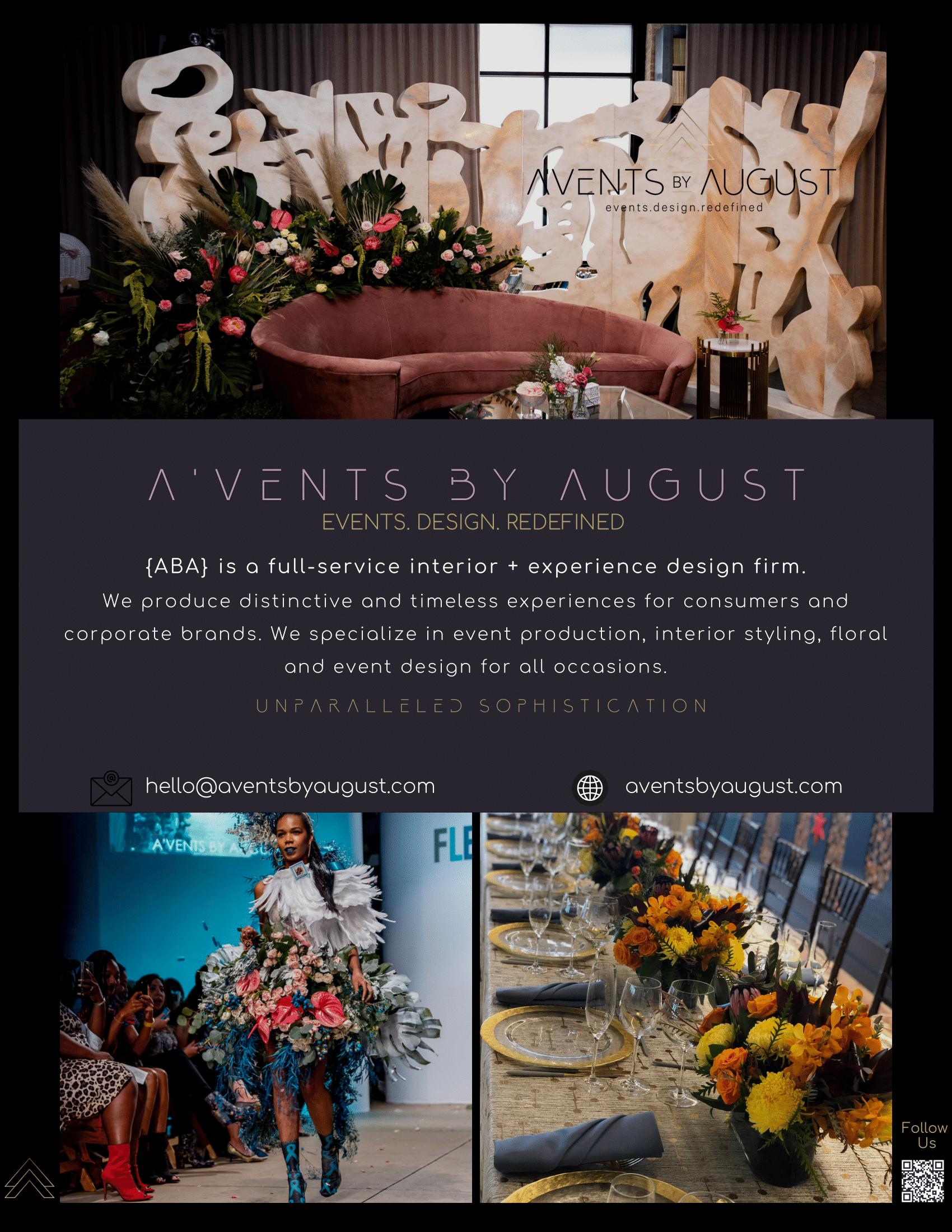
21
How the Fun Died: Mental Health and the Black Experience
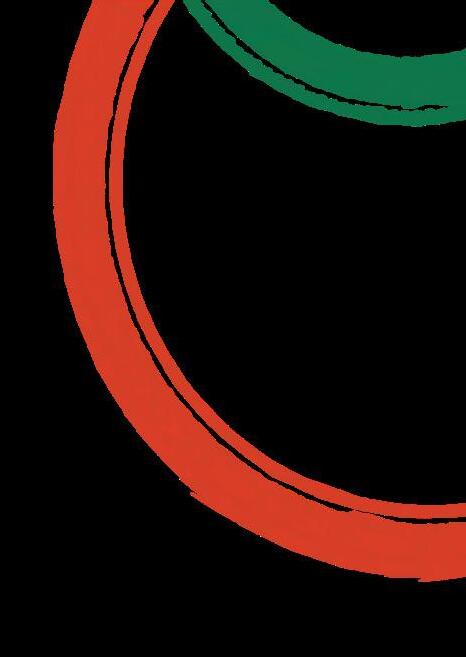
“Where fun goes to die!”
Probably not something you want to hear in a psych ward.
KHADIJAT DUROJAYE own personal baggage that they had not resolved by the time that they had started raising my younger brother and me. My parents were physically and emotionally abusive when I was a child. This led to me having a harder time forming positive emotional connections with others, a fear of authority figures, cognitive issues, and struggling with depression and anxiety.
These words were spoken by a man wearing a UChicago sweater sitting across the room from me during group therapy. I later learned that he graduated from UChicago 40 years ago and, like me, majored in Physics. He made sure everyone knew that we were both Physics majors at UChicago; he’d bring it up during every group therapy session. After I had left the hospital, I thought about him a lot, and the fact that that was what he chose to say to me after learning that I was a UChicago student.
The phrase has always made me cringe. To me, it’s representative of the culture of romanticizing suffering that exists here at UChicago: bragging about how busy you are, how little sleep you’re getting, competing with other students, and setting unrealistically high standards for yourself. To hear it from someone so much older than me made me realize that that culture has probably existed at this school for decades. All of this, along with stories like Cassidy Wilson’s and Charles Thomas’s, are proof that The University of Chicago is unwelcoming for students with mental health issues, especially if you’re Black.
I believe the mental health services at this institution are inadequate. School administrators and Student Wellness practitioners often shift the blame onto students instead of taking accountability. There are multiple necessary policy changes that need to be made to create a positive environment for all students with mental illness.
My struggles with mental health are deeply rooted in my cultural identity and upbringing. My parents immigrated to Chicago from Lagos, Nigeria in the ’90s. With them they brought the trauma that came with growing up in post-colonial Nigeria. They both had their
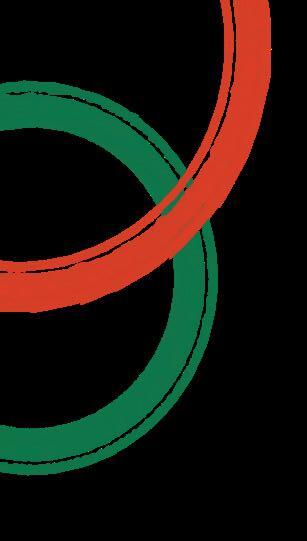

Along with the abuse came the struggle to assimilate to American culture while also preserving my parents’ culture. American culture is drastically different from Yoruba culture, and a lot of that has to do with Yoruba’s emphasis on seniority. Parent-child relationships are not at all collaborative. I saw mine more as authority figures and less as people I could rely on for emotional support. They also didn’t make much of an effort to teach me or my brother their language or culture, which I believe contributed to the creation of an atmosphere that lacked love and understanding in my home environment.
Any child of African immigrants knows that mental health can be a difficult topic in our communties, and I’ve been told that my parents are particularly “African.” I was raised with a lot of pressure to perform well academically (you have three options, which all African immigrant children are familiar with: doctor, lawyer, or engineer) along with, “If you don’t listen, I’ll send you back to Nigeria.” I told my parents that I struggled with mental health before college, but they refused to accept that there was anything wrong. I did meet briefly with a (non-Nigerian) therapist in high school, but my parents would either go into the meetings with me and complain about how I wouldn’t assimilate to their culture, or ask me questions about what I discussed in the meetings (it was usually about them) when I got out of them, so I stopped eventually.
When I got to college, I had trouble finding a community in which I felt I could be completely myself. When I first matriculated in 2018, only 8 percent of the students in my class were
Black. I thought college was a place I’d be able to learn to be myself and grow in a positive environment, but instead I had to learn to tolerate racist comments from my peers and cultural isolation. Addition- ally, Nigerian-American and African-American cultures are very different, and I had trouble relating with African Americans because of the cultural divide; I was foreign, and they were not. Growing up, I was “too white” to be a Black person (probably because I was African) and I didn’t feel like I was accepted by African Americans, which I think a lot of Black immigrants can relate to. I did find some comfort with Asian immigrants and international students I had befriended, but every cultural group has their prejudices and I had to deal with microaggressions in these environments as well.
The problems I faced socially were intensified by what I was experiencing in class. I’m studying astrophysics and when I was a first year, there were usually only a handful of Black students (and very few women) in my 100+-person classes, which only worsened the social isolation. I had a lot of support from professors and grad students in the astrophysics department before I had started at UChicago, but this didn’t keep me from internalizing the feelings of not belonging I felt in lecture. I eventually stopped going. I kept telling myself I was too stupid to do the work and I was afraid that if I tried to ask for help, I’d look stupid, so I eventually stopped doing it. A lot of my worth was tied to performing well academically and I wasn’t doing nearly as well as I would have liked. To deal with the depression that came with this, I turned to substance abuse and self-isolation, which only made things worse. I continued to rely on these unhealthy coping mechanisms until the end of spring quarter 2019. I also started over-reporting hours at my lab job that quarter because I couldn’t afford to support myself due to my mom losing her job. I’d known that something was wrong for months and I finally
22
decided to get help when I realized that my lifestyle was not sustainable, so I scheduled an appointment at Student Wellness (then called Student Counseling Services) for the end of May, after finals that quarter.
I had a positive intake appointment experience. The person I met with was sympathetic to my needs, and she recommended a support group for people of color that I decided not to attend. Looking back, I think this support group was exactly what I needed, but at the time I thought I’d be looked down upon for attending the support group. She seemed to care a lot about what I was going through and checked in on me months after I met with her the first time. Since I told her I struggled with race, she told me she’d help me set up an appointment with a Black psychiatrist.
I didn’t know it at the time, but this psych intervention would completely change the course of my academic career.
I first met with the psychiatrist at the end of June 2019, a month after my intake appointment. I went into it optimistically despite what I had heard from other students. Before she evaluated me, she told me she’d ask me questions from a list she had memorized and take notes while I answered them. I thought this was a little unusual, but I had never seen a psychiatrist before, so I figured that this was just how those appointments were supposed to go. I was evaluated for anxiety, depression, and ADHD, but I don’t remember being evaluated for trauma. When we got to the ADHD questionnaire, she started to insert herself into things. At that point, it seemed like she was comparing my experience to her own instead of just evaluating me for an illness. She continued to compare me to herself and her family and share unnecessary facts about her personal life. She told me that all her children were all diagnosed with ADHD and anxiety and told me that her daughter was coming to UChicago next year. She also told me that she had to repeat a year of medical school because she found out that she had ADHD. She spent a lot of the appointment tooting her own horn; she said that she thought late ADHD diagnosis was correlated with high IQ. It was like she was turning a medical diagnosis into a personality trait. I didn’t realize at the time that this was inappropriate. I was honestly just glad I had someone to relate to and was
happy I wasn’t alone in my experience, but the lack of professionalism carried into every other encounter I had with the psychiatric system.
Black women generally have a harder time with misdiagnosis, so I can understand why she was so attached to the ADHD label. She seemed like she wanted to help, but did not seem to consider how being so unprofessional may have affected me. It only took 90 minutes (60-minute intake appointment, and 30-minute second appointment) for her to diagnose me with “ADHD and anxiety.” Later, when I asked her what kind of ADHD and what kind of anxiety I had, she told me it was “just ADHD and anxiety” even though I knew there were multiple types of ADHD. Over the course of the summer, she’d respond to my emails less and less frequently, which I found frustrating, but knew was common with Student Wellness psychiatrists. Because of this lack of accessibility and dismissive approach, I felt that it’d be best to find a new psychiatrist. I didn’t know I could find another one at the University at the time, and I had also heard a few Student Wellness horror stories, so I figured it’d make sense to get help outside of the College. From the recommendation from another student, I was able to see a psychiatrist at a clinic downtown.
Though before this change, I told my psychiatrist I wanted to apply for accommodations with Student Disability Services (SDS). She told me that the school wasn’t very good at accommodating students with disabilities, yet I applied anyway with her notes. When I met with the Deputy Dean of SDS about a month after applying, she informed me that notes from a psychiatrist weren’t enough. I wasn’t familiar with the psychiatric system, and I didn’t know anything about disability accommodations.
She told me I’d have to get a full neuropsych evaluation, but that it’d be a long time before I’d be able to get one at University of Chicago Medicine (UCMed). I instead looked elsewhere to get a neuropsych eval done. I was able to finish the evaluation process and was recommended accommodations, but not without trouble; it took me almost four months to get through the evaluation process and I still had to tolerate microaggressions from the people who were evaluating me.

I wanted to use my second year (20192020) at UChicago to show that I could grow,

and overcome the challenges I had faced first year, but the complete opposite happened. Instead, my life spiraled into chaos. My focus shifted from academics onto my mental health, and I was obsessive about it. I had almost no emotional support; my friends weren’t very supportive and my parents were the root of all my problems. I was running to psych appointments downtown and neuropsych evaluation appointments halfway across the city by train. I was over-reporting hours to afford rent, psych appointment copays, groceries, going out with friends, entertainment, and more. My psychiatrist sent me to get a blood test and we found that I was vitamin D deficient and very underweight because of the medication I was initially prescribed by my psychiatrist at Student Wellness, who never sent me to get a blood test or checked my weight.
I was spending excessively, I had a lot more energy than I normally would’ve, I overcommitted myself, I was taking on more projects than I could handle. I struggled academically because of all of this. My problems related to academics from first year only worsened and the stress of my family’s financial situation led me to over-report hours more and more. I realized after this happened that these were symptoms of mania caused by the medication that the psychiatrist I saw at Student Wellness prescribed me.
But still, my professors were not very accommodating. I tried to complain to a University administrator with the help of a mentor from an RSO I was in, but was redirected to my adviser and it didn’t get anywhere.
Yet, at the end of winter quarter 2020, I was called into one of the University offices. I was informed that I had to be reported to the College for over-reporting hours. I got an email from a University administrator soon after to set up a meeting. During one of my first meetings, while I was crying in their office about a problem at home, they asked me if my dad was absent, something I interpreted as a racist comment, and they seemed to realize it after they had said it. Instead of pointing it out, I kept quiet about it.
The disciplinary process worked for me similar to the way it’s described in the student manual.
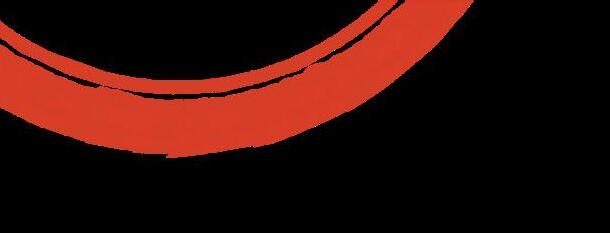
After writing a statement, I met with two University administrators that I’d have to go to

23
trial (instead of being let off with a warning).

I was told that I could bring a friend, family member, or significant other, and that I’d have to notify them ahead of time if I planned to bring an attorney, but I was too embarrassed to tell anyone and went in alone. I met with the subcommittee a few weeks later. I tried to let them know that my mom losing her job was a huge financial stressor at the time. After we met, they released a statement, recommending disciplinary probation, but I’d have to wait until the full Committee met for a final decision.
A few weeks later, after the Associate Dean told me that the Committee meeting would be postponed due to COVID-19, I found out informally from an email that I was suspended, effective immediately. After receiving an official letter from the full Committee notifying me of the terms of the suspension, I did try to appeal, arguing that my mental health and not being accommodated for it was the issue along with my my mom losing her job, but it was not successful.
The following year was the worst of my life at that point. My self-worth was tied to academics, because of that Nigerian parent influence, and being suspended meant that my life was over. My mental health worsened over the course of that year. I was constantly under stress; I had an ongoing lie about “taking a year off” and at the time that made me isolate myself. I had given up completely on my life and my mental state worsened. I was left without UChicago’s resources and was too worried about the pandemic to find a job (it’s mandatory to work while you’re suspended). I was too afraid to find a job outside of UChicago because my parents worked in healthcare and I didn’t want to get them sick. Mental health isn’t something you talk about with your Nigerian parents, so my family was not a source of support at the time. I had no emotional support outside of friends; I spent a lot of the year running away from my parents. Eventually I left home and returned to a traumatizing living situation in Hyde Park, where I had racist roommates. I was also hit by a car in August of 2020 and developed other physical health problems from the event, which only added to an already stressful situation. I was diagnosed with bipolar disorder with psychotic features at some point, but I think that a lot of my symptoms came as a result of the
trauma and stress that I was experiencing (and with the birth control that I was on). I looked into suing for malpractice, but I didn’t know what to do and didn’t have the resources to at the time. Eventually, I took a medical leave of absence as we started having in-person classes again, missing out on a lot of necessary social interaction. My medical leave was somehow worse than the suspension. I felt neglected, but unfortunately my experience is not uncommon. A few students at Brown University have also experienced the neglect that I did when I was on leave. I have a tendency to socially isolate, and because I was neglected the isolation slowly worsened my mental state. I was completely cut off of the university’s resources, including access to Student Wellness. The most I could do was call the Student Wellness Therapist-on-call hotline and they only offer emergency services that aren’t at all therapeutic.

experiences are sometimes traumatizing, but I’m happy to say I had a somewhat positive experience. I’d lost all hope for my career at that point. I felt that meeting a UChicago alum with the same major as me was a sign that I could still do what I wanted, especially because we had a conversation about UChicago astrophysicist Eugene Parker, who I found out died the week I was in the hospital soon after I left. I was determined to return to school after the hospital visit. While I was in the hospital, I spent a lot of time trying to collect the proper documentation so that I might be able to return. I tried to return to school in the spring, but was not properly informed of the process of returning from leave beforehand, so I went into it without notes from a psychiatrist or therapist and my request to return was denied.
My parents’ financial abuse was a point of stress for me, and they were the only support that I had. Instead of relying on them, I worked, jumping from sublet to sublet every few months in Hyde Park, relying on donations from organizations and crowdfunding to support myself. The isolation that I experienced during this period is almost impossible to describe. At some point around this time, I did call the Student Wellness therapist-on-call hotline because I desperately needed someone to talk to. But instead of being consoled and directed to resources, I was told that I shouldn’t commit suicide because if I did, my younger brother (who’s also a UChicago student) would be 50 percent more likely to do the same. I tried to explain what happened to me with other people as well, but the stigma surrounding mental health, and my diagnoses were a social barrier.
The stress of social isolation landed me in the hospital in March of 2022, when I met the UChicago alum in the psych ward. Psych
But I was still determined to get better and come off of leave. I’d talk to as many people I could about it even though I’d get turned away. The more I talked about it, the more I realized that what happened was not my fault and that I was facing an institutional issue. I didn’t get the help I needed when I needed it, and I experienced prejudice and stereotyping which only delayed the process of healing. The “care” that I had received from SDS and Student Wellness left me traumatized and vulnerable to other traumas. There’s been absolutely no accountability from Admin or Student Wellness and my mental state has worsened. Almost every day while I was on leave, I thought about how my life would have been if I hadn’t gone to Student Wellness. I attempted to return again in winter 2023 and while I’m officially off of medical leave, I’m still experiencing some difficulty.
What happened to me is surprisingly not uncommon. Schools aren’t always sympathetic to students’ needs, and unfortunately students usually don’t have the resources to sue. Mental health services at UChicago seem to have improved since my suspension in 2019, likely because they merged everything. I’m happy to see it, but there’s still a lot that needs to change. Although social support is especially necessary for immigrants—especially Black immigrants who might experience more stigma in their communities—they’re much less likely to make use of mental health services due to miseducation about mental health. Like anyone else, Black people first turn to friends and family to talk
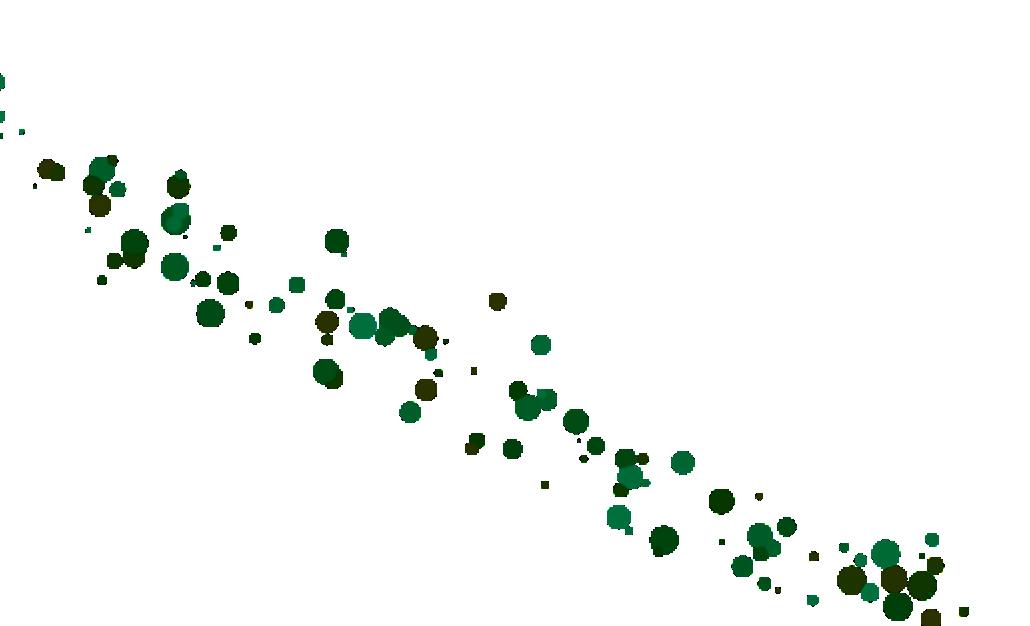
24
“The isolation I experienced during this period is almost impossible to describe.”
about mental health struggles, but if we don’t have supportive friends or family, it’s necessary for schools to provide the proper services to students who really need them.
In the process of trying to find support, I heard anecdotes of other students going to Student Wellness and having to taper off their medications because their psychiatrists were not communicative or, worse, being forced into medical leave and not being allowed to return. I’ve also discovered that this isn’t a problem unique to UChicago; students across the country with mental disabilities face discrimination and usually don’t have the resources to fight back.
A group of Yale students were suing, and Yale made some policy changes in response. A former Yale student recounts her story of her involuntary withdrawal in “Yale Will not Save You,” one of several essays in The Collected Schizophrenias (my favorite book). Her story led me to several others and was the inspiration for this piece. Change is obviously possible; here are some changes that I think would benefit UChicago students.
First, I think a larger selection of psychiatrists and shorter wait times would be a great benefit. When a student is experiencing an emergency, a month is a very long time to wait for an appointment.
All students who go to Student Wellness for medical assistance should first be screened for trauma and directed to the trauma-informed services if necessary. Student Wellness doesn’t seem to offer services specifically for victims of trauma. Stanford has something called the Confidential Support Team, and Harvard also has trauma informed practitioners. UChicago students, especially sexual assault victims, would benefit from a service like this.
Additionally, SDS or Student Wellness should offer their own neuropsych evaluation services. If a student is diagnosed with an illness at Student Wellness and wants accommodations with SDS, they should be able to be evaluated at school and not have to wait a year to be evaluated at UCMed. Finding the time to travel across the city to neuropsych eval appointments while taking four classes was very difficult for me.
There needs to be more guidance for students on medical leave. As I mentioned earlier,
I felt neglected while I was on leave. My leave was originally only meant to be a quarter, but because the terms of leave weren’t explained to me very well my leave turned out to be over a year long. I felt like I was in a waiting room for a lot of that time. I didn’t have a supportive family and was working to afford therapy, psychiatry, and medication, for almost a year when I could have just been going to Student Wellness and seeing a therapist every week for a month. Working only stressed me out and made me worse. I think to prevent this from happening to other students, school administrators or possibly Student Wellness should check in on students regularly and confirmation that a student is seeing a medical professional or has access to medical services should be required. If a student doesn’t have access to their own services, students should be allowed access to Student Wellness’s services for the entirety of their leave. I personally thought I needed a consistent in-person therapist, but because I didn’t have one, I should have had access to the university’s medical services, but I did not.
I think the process of applying to return also needs to be reevaluated. If students have access to medical services and are checked on regularly, then it won’t be necessary for a student to reapply to enroll in classes again afterward.
Additionally, there needs to be more communication between Student Wellness and SDS, and the terms of medical leave need to be made clearer. I was persuaded into taking medical leave by the head psychiatrist at student wellness during autumn quarter 2021. I wanted to take the time off to recover from what had happened, but I had a bad relationship with my parents and didn’t want to go through them to use my insurance. While I’m not sure if I can say I was forced into it, I was traumatized, and I didn’t really know what was going on. I was made to feel like I didn’t have any other option. This is not uncommon. The terms of leave should be made clearer. I was supposed to use this time to recover from trauma but was further traumatized because I didn’t receive the help I needed. Student Wellness currently only offers services to students who are enrolled. Students with mental health struggles should not be treated like liabilities and instead need to be treated as people with disabilities.
There needs to be more accountability with
psychiatrists. I’ve had multiple friends complain about their student wellness psychiatrists. Hearing these horror stories prevented me from going back to student wellness for help. Students’ complaints need to be taken seriously. The person to whom I tried to report the psychiatrist I saw was patronizing and completely ignored my needs, so nothing changed. When I told them how my psych diagnosed me he said “maybe that’s just her style.”I heard that the psychiatrist I saw originally still diagnoses students the same way.
Finally, I think we need an environment of understanding. The UChicago administration needs to take mental health issues into account during trials. My problems were belittled, and I was subject to racist questioning when I was on trial.
This is just my account. “Black” is not a monolithic group. It’s more a diaspora of people who may experience prejudice in similar ways. I wanted to highlight that people from different parts of the African diaspora along with people in general who may struggle with mental health and receiving the right care might experience institutional issues. I can only speak for myself as a child of two Nigerian immigrants. I hope that this piece can help anyone who can connect with it in any way and raise awareness about a problem that I don’t think is very commonly discussed. Thankfully I’ve recovered from a lot of what I’ve been through and I hope that this piece can help anyone heal from whatever it is they need to heal from and encourage anyone to share their story.
Hopefully, this article will shed light on this problem and Student Wellness will take the necessary steps to resolve this issue. No student should seek help and end up regretting their decision. Students should know that help is there and that for students who come from backgrounds similar to mine, having reliable support outside of family is absolutely necessary. Making mental health services more reliable and more accessible for students who need them is absolutely necessary. Mental health is as much a medical issue as it is a sociocultural one. It’s important to have conversations about our experiences so that we can normalize them, move past them, and foster a positive, more loving community.

25
Black Intersectionality, Policing, and Being Black at UChicago
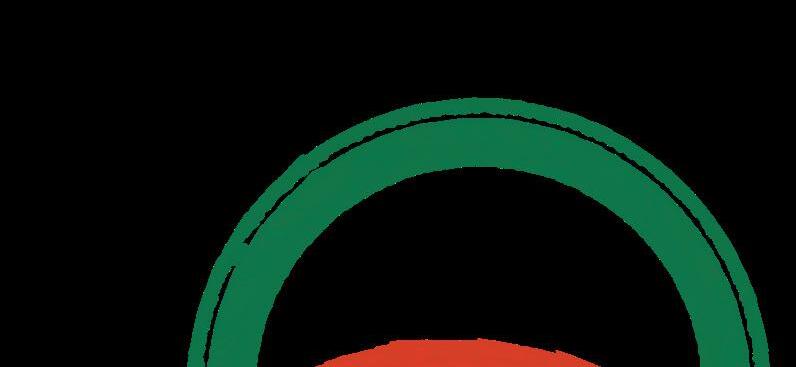



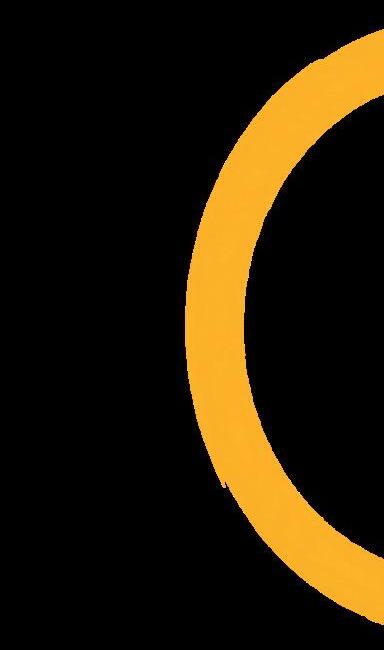

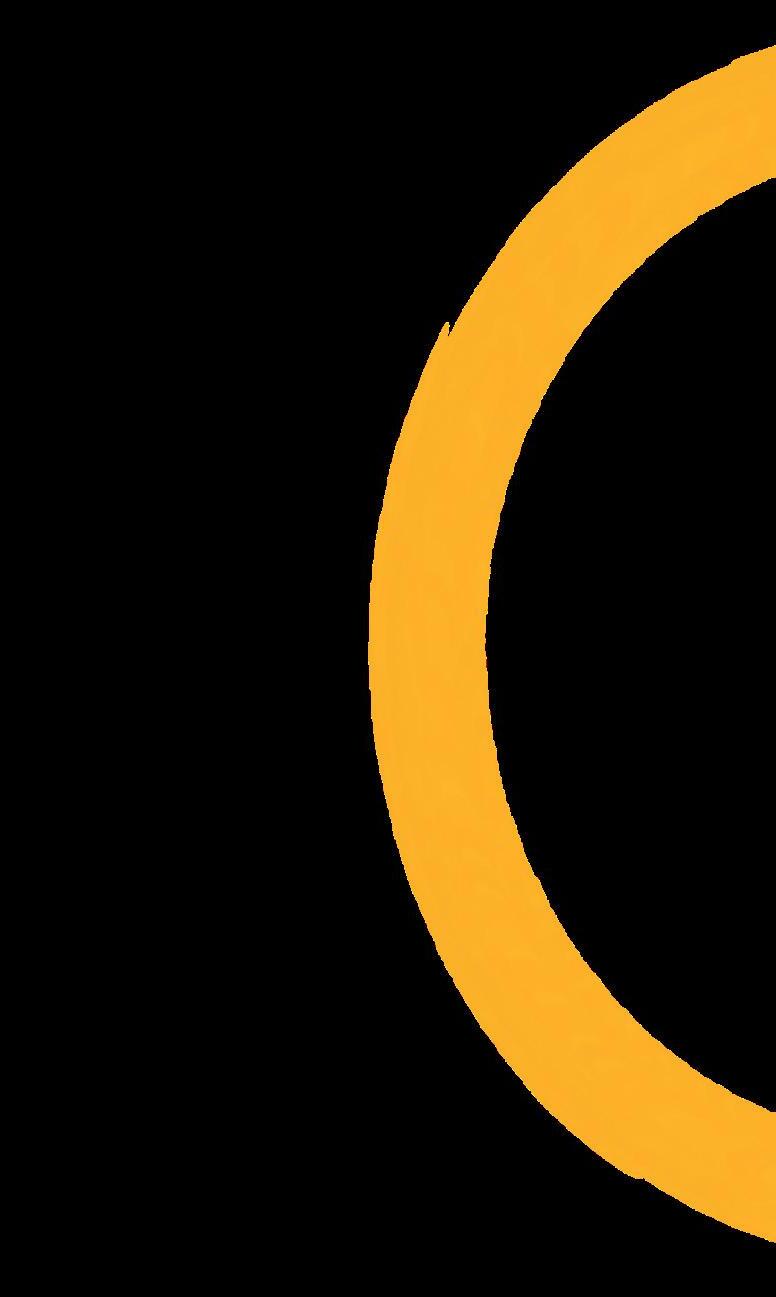

 DOTSON
DOTSON
all you can do is stare. the street lights reflect off the sleek asphalt and slick oil, a mother and her children idle nearby, a bike nearly runs over your foot, and all you can do is stare.
i cried in public at church once and my mother cried with me. singing something divine stomping her gospel feet under a devoted god spell fanning herself with a damp tissue. and jesus cried with me loved my water so much that he laid me back in my puddle and deemed the salt something holy.
i cried in public at a bookstore once and they offered me a story. the fiction shared my burden but it didn’t speak. i made it’s ink bleed a dripping noun left to dry a tear trapped in the spine a hard cover turned soggy.

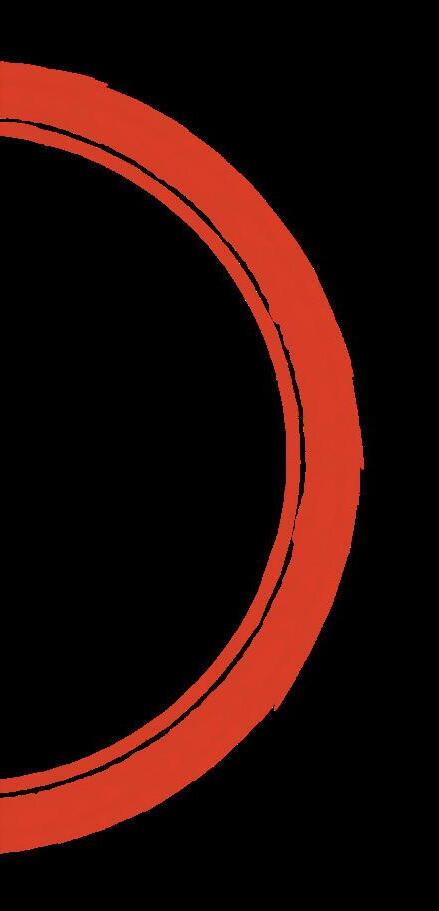
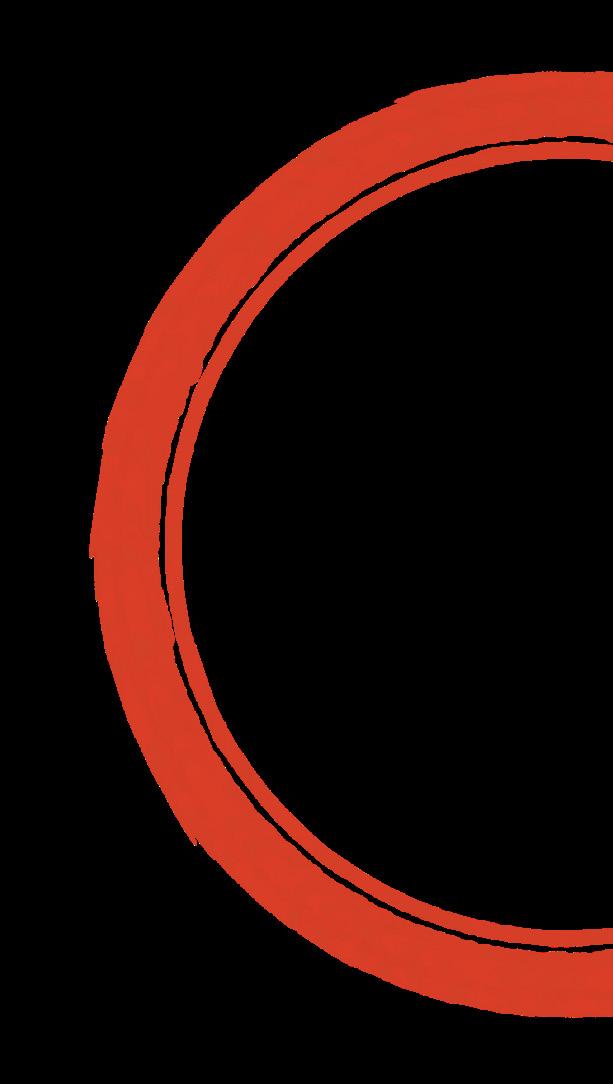
i cried in public on the moon once surrounded by a galaxy as black as me surrounded by stars made from collided everythings. my tears fell up returning to my pupils, they fell up pixels of a rainbow, fell up remembering the last time they were truly weightless, something like an elderly dandelion, a droughted womb, a fertile afrofuture.

yet, for some reason when i cry in public at my pwi all you can do is stare. as if your paying me attention is paying reparations, as if my tears mean i am melting, mean i am made of the same shit as you, mean i am. and that’s a threat, and that’s a promise.
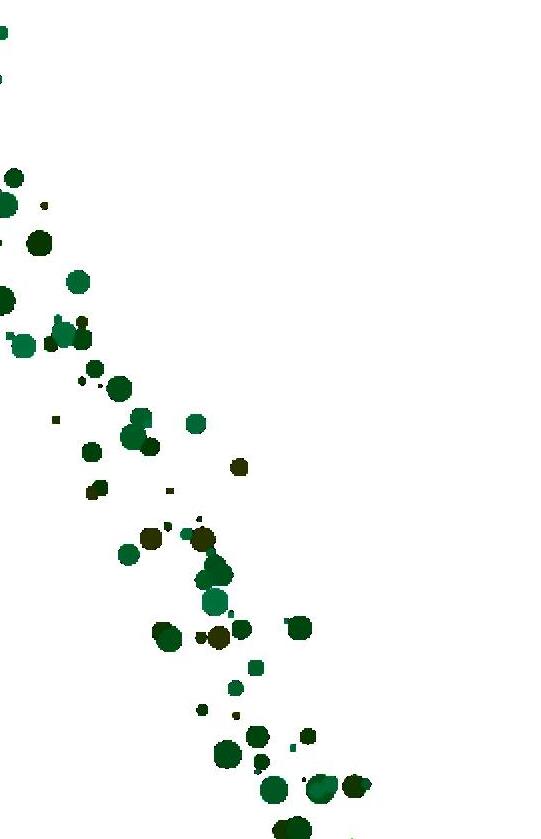

26
LAUREN
it’s raining at seven thirty dark. i’m crying in public at my pwi and

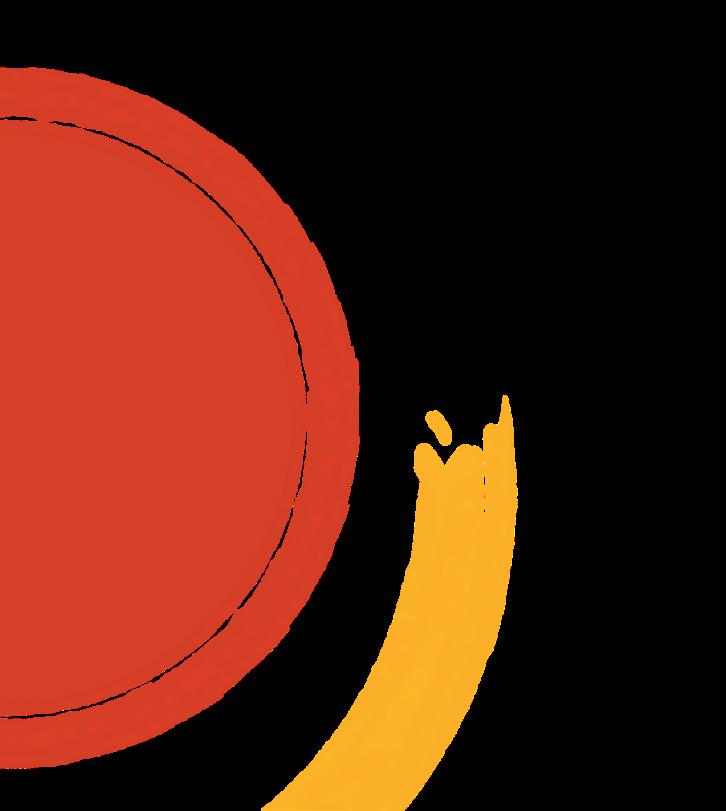
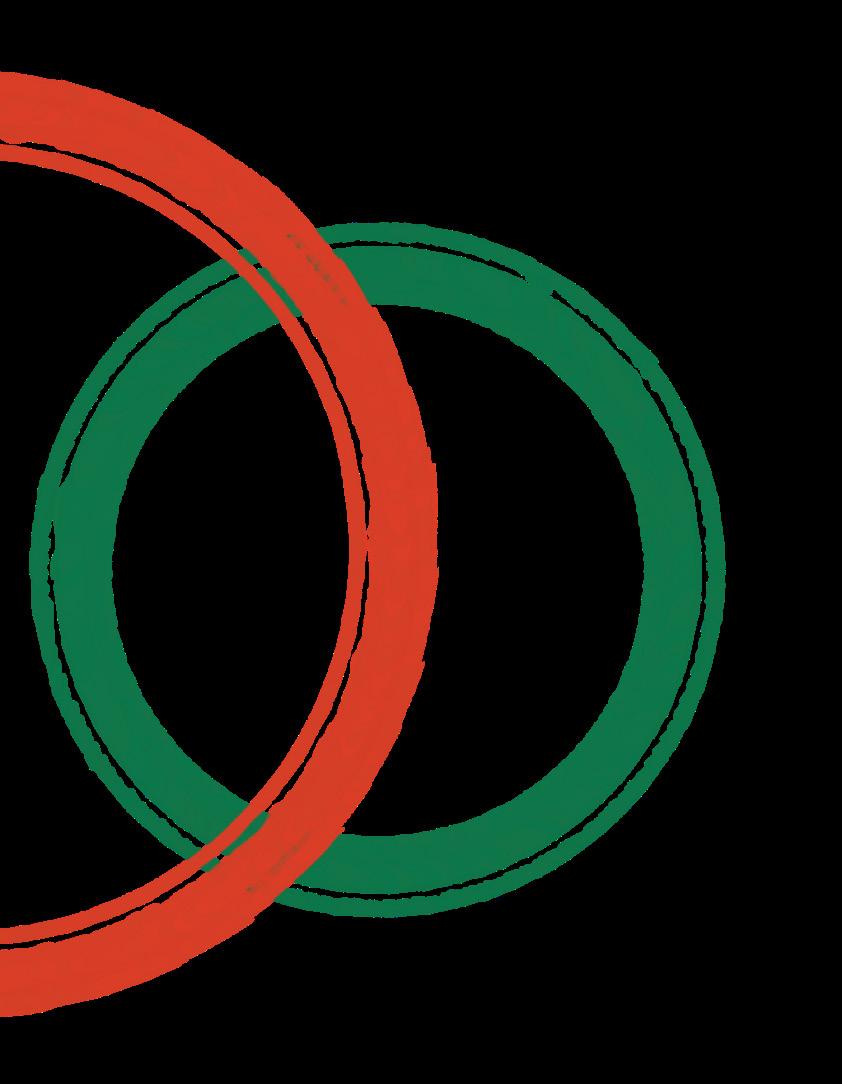

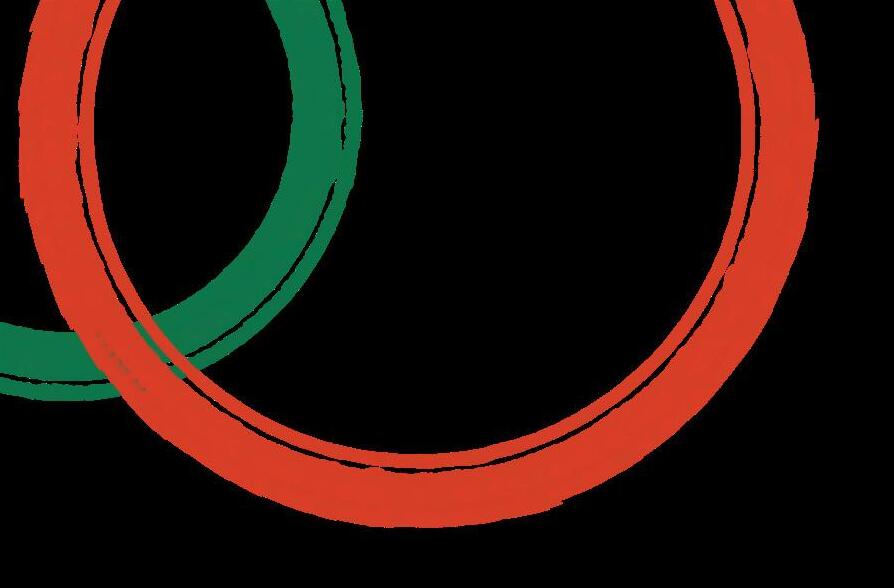
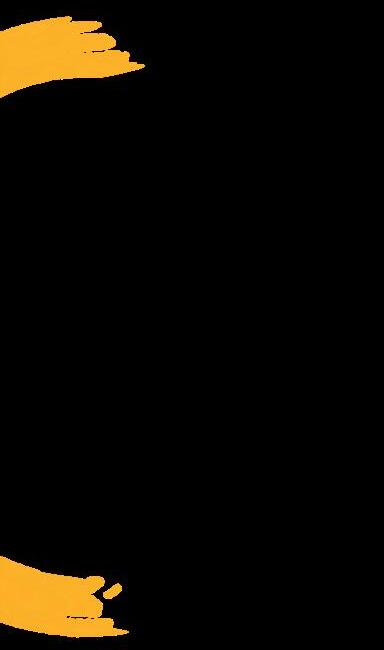


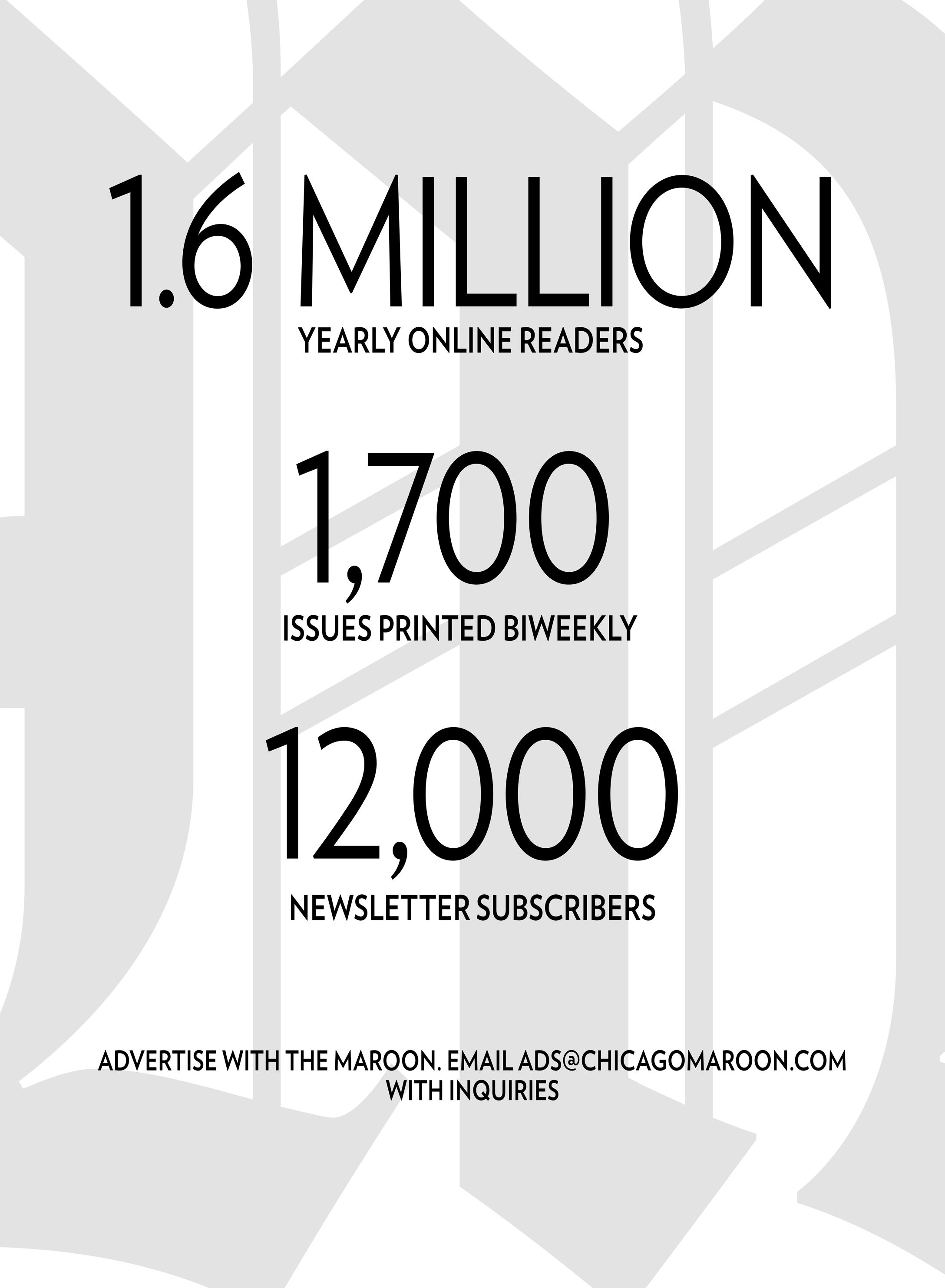
27
Racial Violence for Students of Color


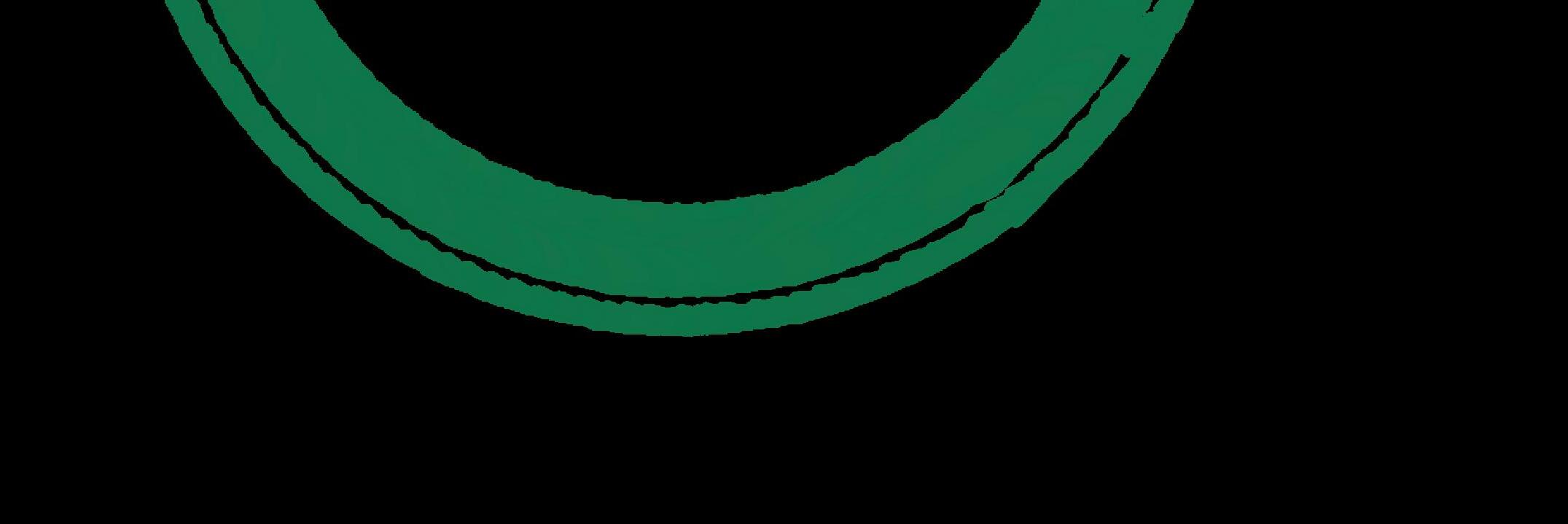
 URUNNA ANYANWU
URUNNA ANYANWU
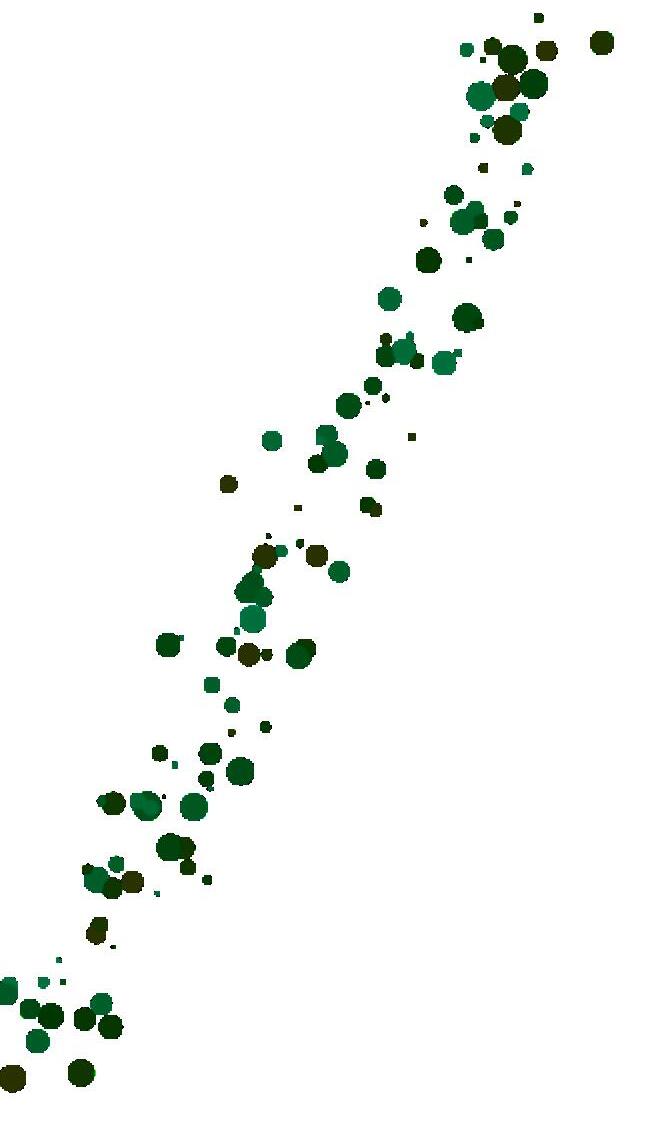
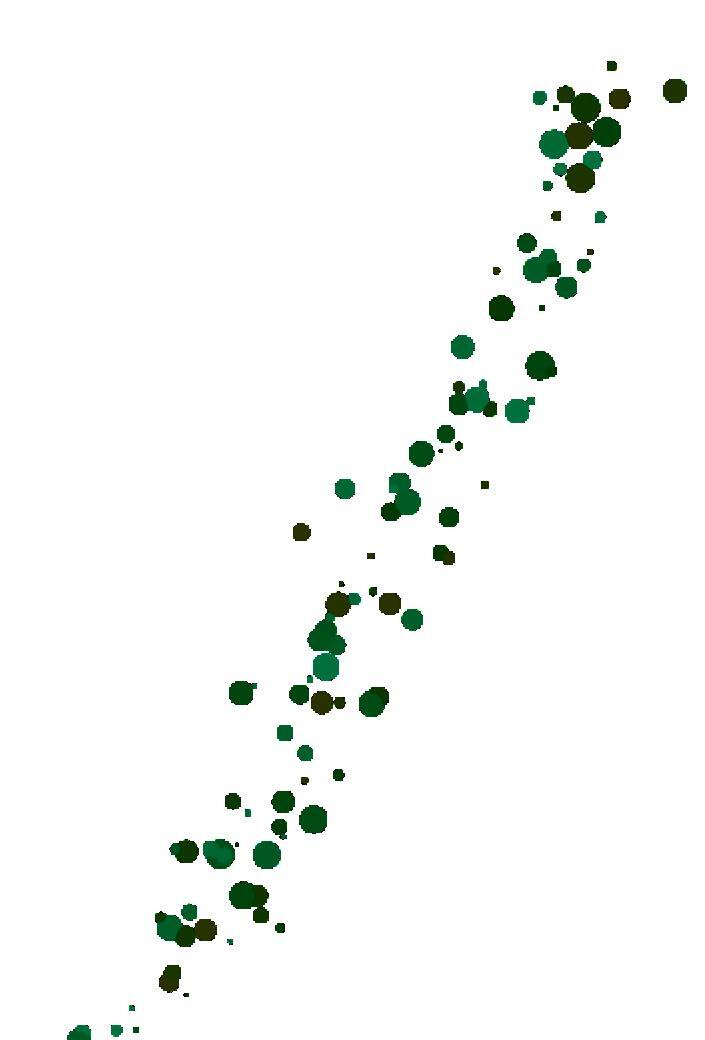
My name is Urunna Anyanwu, and I’m a second year, class of 2025. My piece was done digitally, which helped me in achieving the chaos I wanted in the piece. As a student of color in PWIs since elementary school, I’ve constantly stood out against my peers. Even in non-hostile situations with harmless people, I’ve constantly had to “watch my back” because of how quickly racism and colorism is capable of happening to students of color. Everyone is watching, anything bad could happen at any time, simply because of one’s racial status.
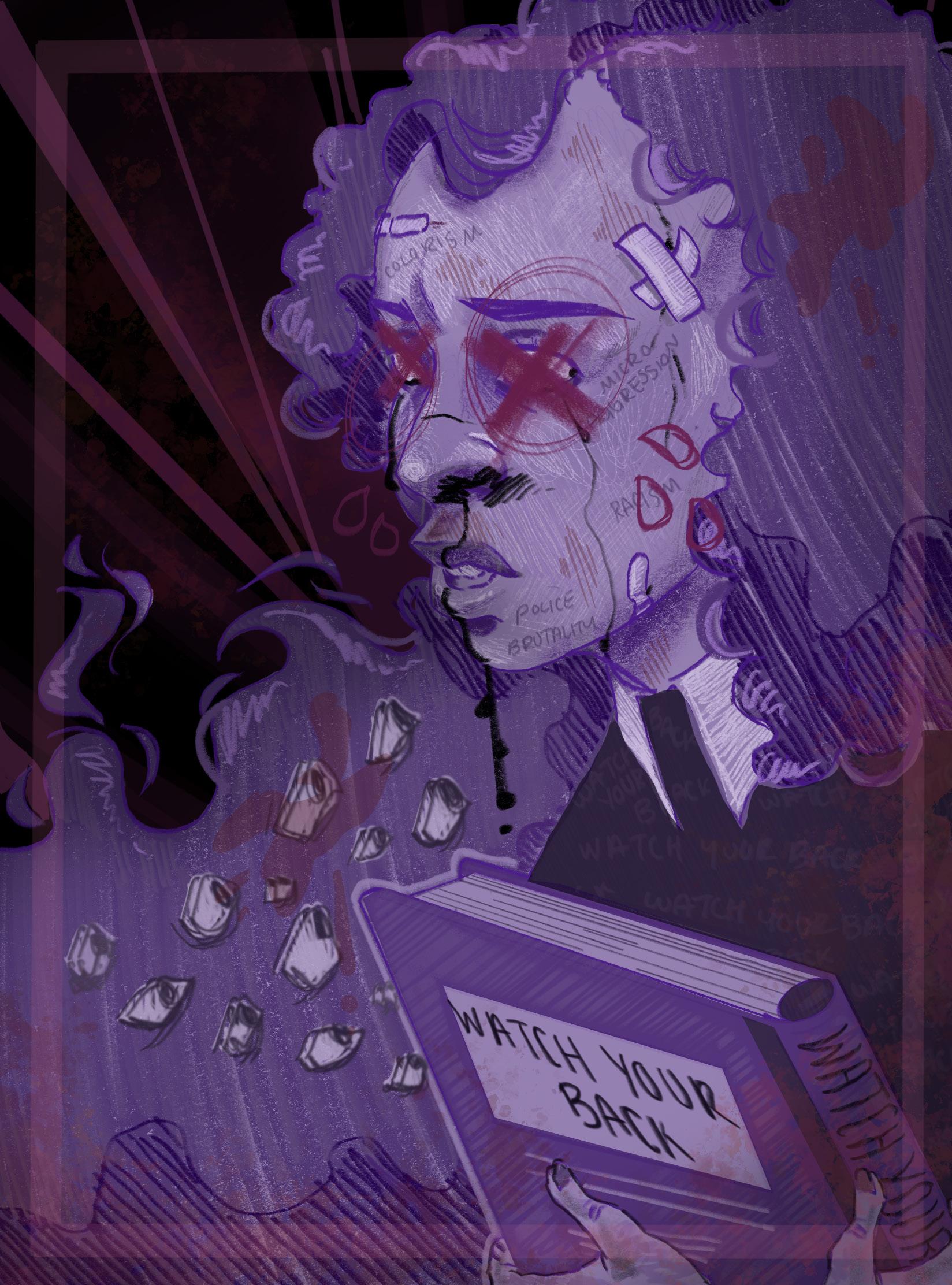
28
Celebrating 20 Years of ACSA
To its fellowship, history, and future

MALAZ NOUR as an organization where people from all different backgrounds could come and fellowship together, and I think that we really accomplished that. UChicago was a place that could really make you feel like you didn’t belong, whether that be in the classroom or just physically taking up space on campus, and I think we created an ACSA that helped students of African and Caribbean backgrounds feel empowered to take up space.”
Intergenerational communities have been formed in Sudan’s (ahwash) for centuries as brothers and sisters, nieces and nephews, and cousins with questionable degrees of relation run under and around the feet of their elders. The children raised in this environment, regardless of how related (or unrelated) they may be, have an inexplicable bond. They consider themselves to be siblings by virtue of simply being raised in the same yard. They grow up to be present in each other’s lives despite the physical distances formed by being part of the diaspora, present to support each other through every hardship and celebrate every milestone. However, this practice of creating family through proximity is not unique to Sudan by any means: it exists in Nigeria’s compounds, Jamaica’s yaads, Somalia’s aqals, Eriteria’s gezanas, and so on. It has existed here at the University of Chicago in the African and Caribbean Student Association (ACSA) for the past two decades.
Established in 2003, ACSA has celebrated the growing diaspora community here at the University of Chicago by providing a place for students to find home even in the midst of unfamiliar territory. Over the years, the organization has grown to include annual programming such as Black Convocation, hosted in tandem with the Organization of Black Students, and the Culture Show, a showcase of the diaspora in all its beauty. They also provide student support through career workshops, study breaks, and mentorship programming.
Core to ACSA’s mission is the desire to bridge the gaps between student experiences. Adaora Ekonwu, A.B. ’20,one of ACSA’s co-presidents from 2018 to 2019, noted that during her term “We set out to build a brand and to be known on campus
This sense of belonging that Ekonwu references is the crux of ACSA’s magic, which makes it possible for a student, years down the line, to find mentors, connections, and even answers to a story for The
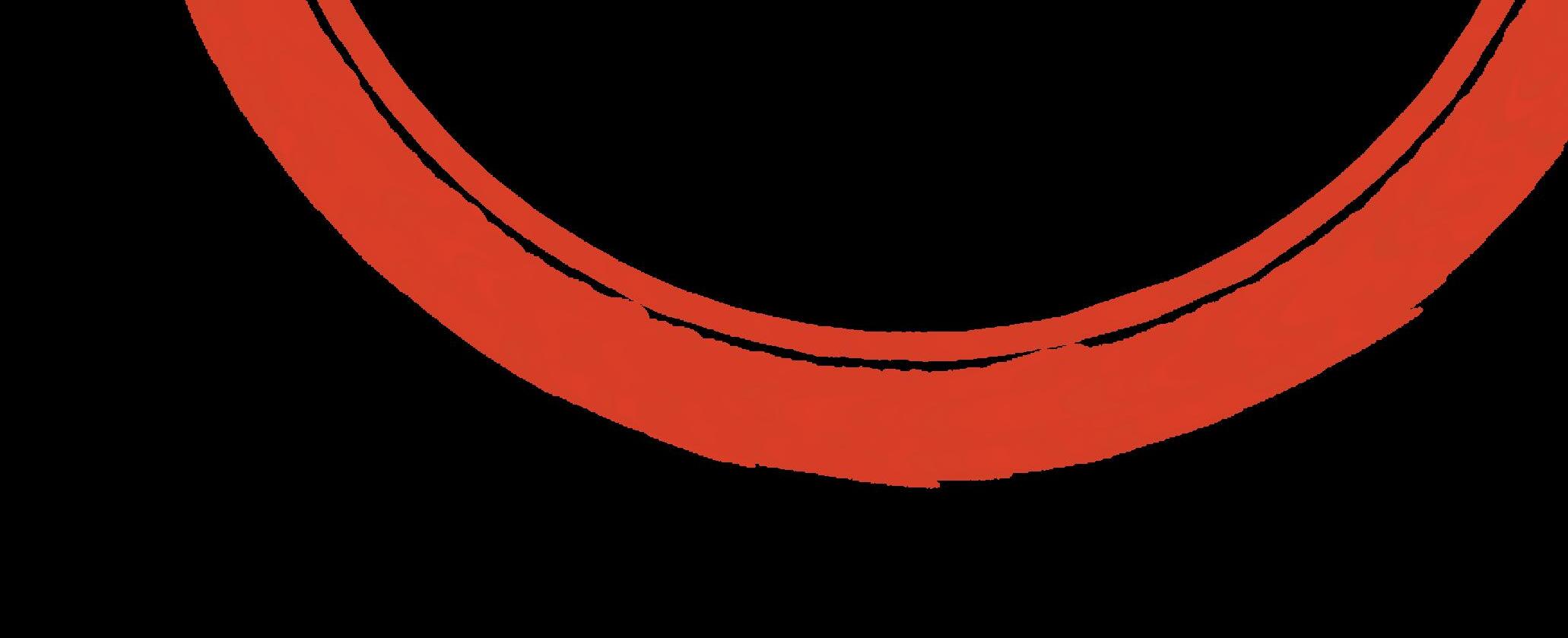
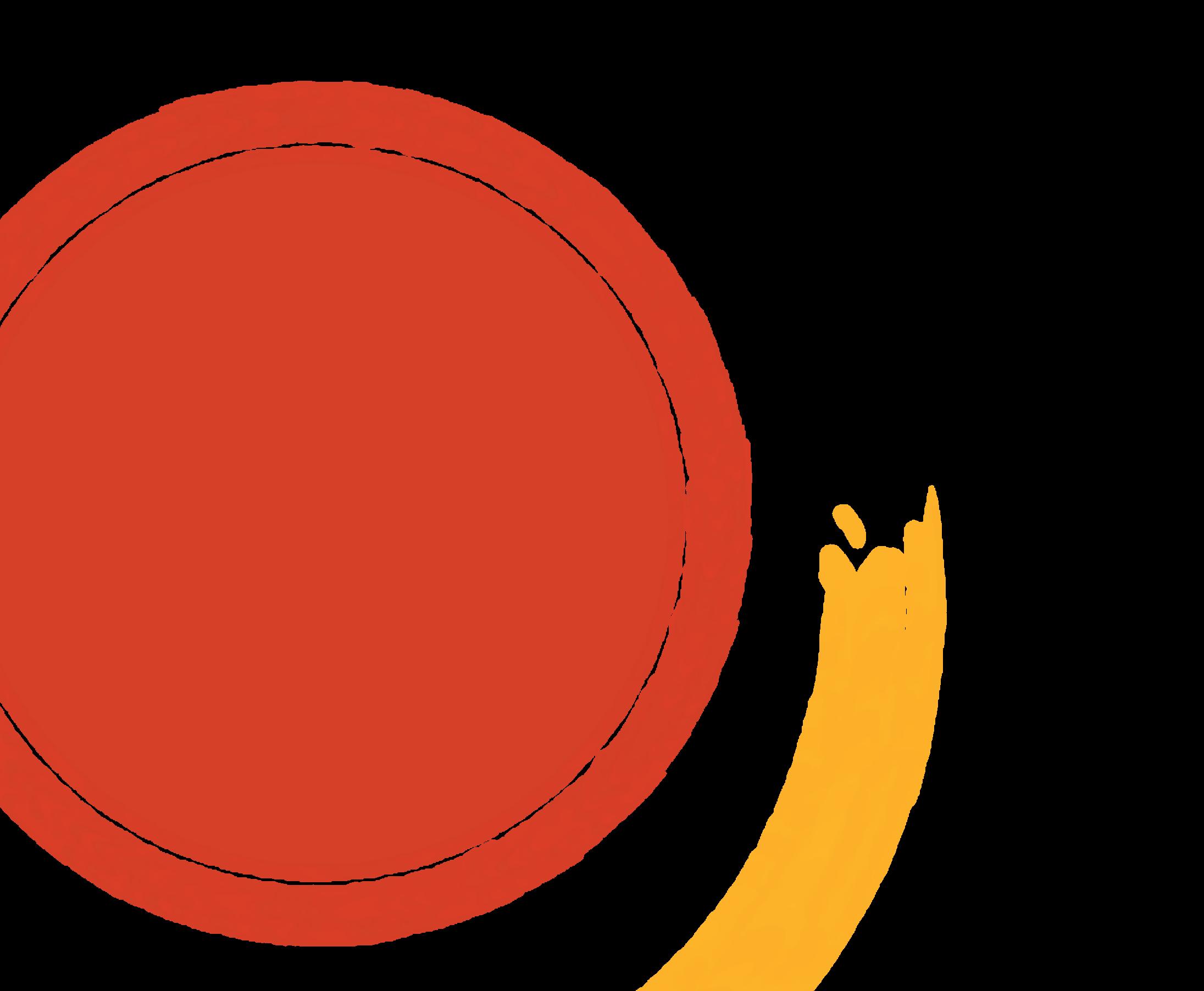
at the University of Chicago has experienced exponential growth and ACSA has only grown in light of the incoming diverse backgrounds. There are students from all corners of Africa and the Caribbean, and the Culture Show has reflected that cultural diversity as the performers represent their tribes, their islands, and their countries.
The history of ACSA is rich in its representation of the African and Caribbean student body of the University of Chicago. The students that walk these halls are imaginative and innovative in the ways in which they choose to claim space. We look forward to a future where we no longer have to claim, fight, or demand for space with the institution of the Black House, but in the process of attaining that future many different students will walk these halls. We are here for a fraction of our lives, no matter the life-long impact this university will have on us. For every student that experiences the community of ACSA during their time here, ACSA will in turn be changed and shaped by them.
M aroon It also influences graduates, like Ed Chung, A.B. ’20, to create homes for themselves even in the next chapters of their lives. Chung became the president of the Caribbean Law Student Association at Harvard Law School based on his experience with ACSA. He said, “ACSA was really like a home for me. When I first joined there were no Caribbean members and it was mostly African, so I made sure to recruit Caribbeans to diversify the board… It was an overall positive experience for me and kept me grounded at a time when UChciago was not diverse at all.” Chung makes a great case. In the past five years, the Black community
So where does the future of ACSA lie? Current co-president and third-year Ade Osadolor thinks, “For me it’s all about finding more inclusivity and representation in the community. I would love for more people to be interested in ACSA and ACSA’s mission as well as being able to uplift our community whether that is in any social, academic, or professional endeavors. I want to be able to build an even stronger financial foundation for ACSA so we are able to invest more in the community and part of that is the advancement of the Black Community Center campaign.” ACSA’s future is bright, as bright as those of its members, and I am looking forward to the next few decades of this organization that will only continue to grow.
29
“For every student that experiences the community of ACSA during their time here, ACSA will in turn be changed and shaped by them.”

30 30
Gray Child

VICTORIA (TORI) HARRIS
“The sign was particularly concerned about how everyone was marrying everyone else, and soon America wouldn’t have any black, white, yellow, or red people anymore – just gray ones.”

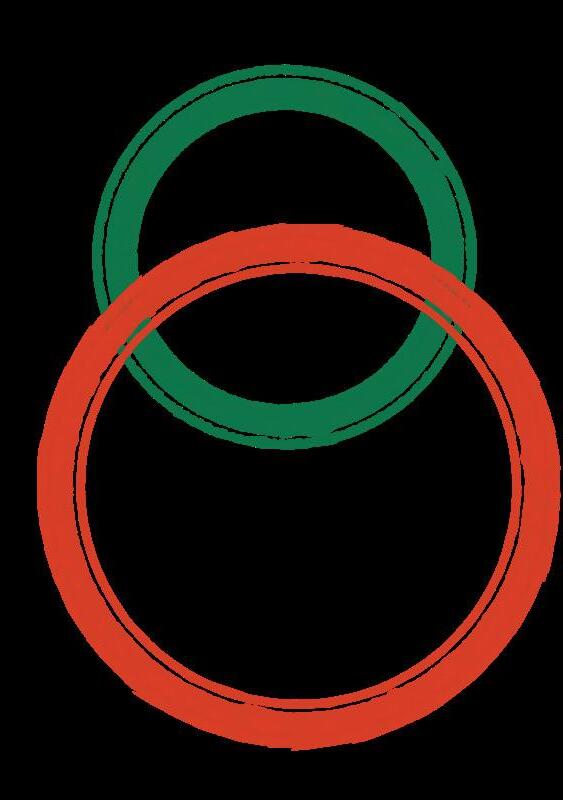


- Cherie Priest, I am Princess X
Poor, gray child.
Mixed and mixed and mixed until you’re just addled

What’s it like to be defined by your background?
You have no background.


You are only misshapen parts, Fragments of backgrounds stitched together To create a raggedy jaggedy figure central to them all.


Background:






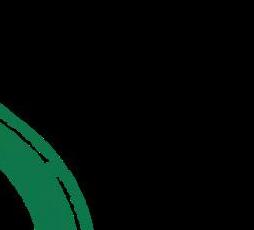




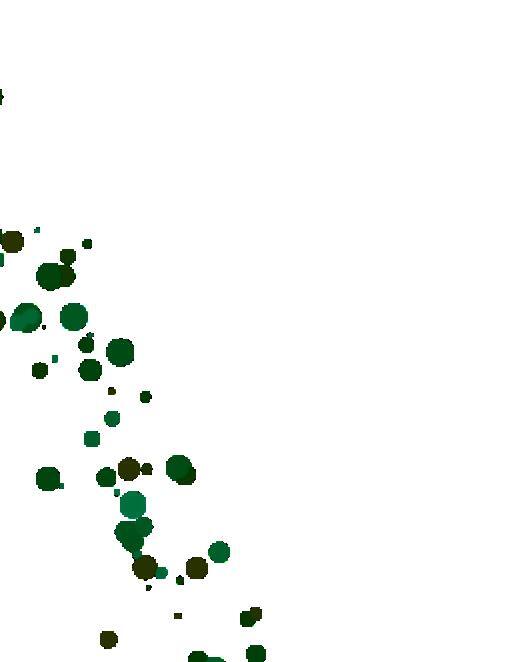
Before I was born, my parents were told they couldn’t make it work. My mother would be seized from her safe suburbian sunset And be dumped barefoot, broke, and bearing in a trailer park; My father would be left without a worthy Black woman When the going gets rough (and it would).
It’s funny how a baby fixes things. I was born, and suddenly being half and half was fine For both sides. Suddenly, everything was okay. Wonderful, even.
As though my mother can’t leave us now with a Black baby

As though my father can’t capsize us now with a White baby. Never mind that I had nothing to do with the equation; Suddenly I was central to the solution.
Poor, gray child.
I bet you get all the awards:
Every scholarship they have thrown at you
Every contract they have thrust under your nose.
You can be the race that is most convenient
Whatever is the most convenient in the moment.
Where is your brilliance now?
You never were brilliant. There is no brilliance in this Melted eddies of Black and Brown and White. It’s so easy to be whatever’s convenient.
But remember, my child: There is no brilliance in broken reflections.
Convenience is a tricky thing.
I am conveniently light-skinned, Conveniently more palatable to the White taste.
Only, that’s not quite it, is it?
I am more tolerable by miniscule parts.
31
In comparison to other Blacks I am the better scenario. Barely.
I am better until they learn that Black this light doesn’t just “happen.” That my parents are traitors to their race. I am brilliant and bright Until they learn my mother is White. I am a special kind of Black magic That dulls when I am stuck in the spotlight. Convenience is a double-edged sword.
Poor, gray child. You are not enough, You can never be enough.
You are fifty, twenty-five, twelve-and-some-halves You are not whole, Let alone wholly White

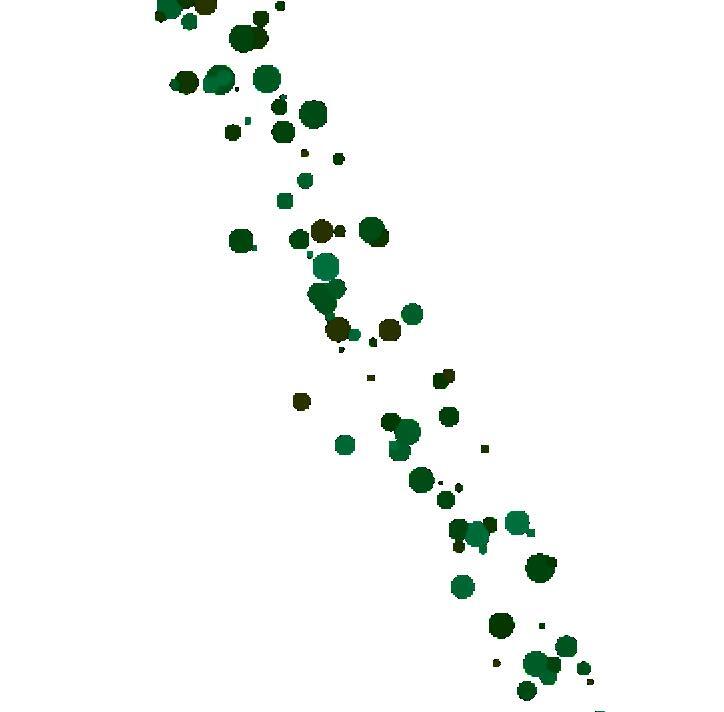
Wholly Black



Wholly Chinese or Cherokee or chose one of any.
What’s it like to have no background?








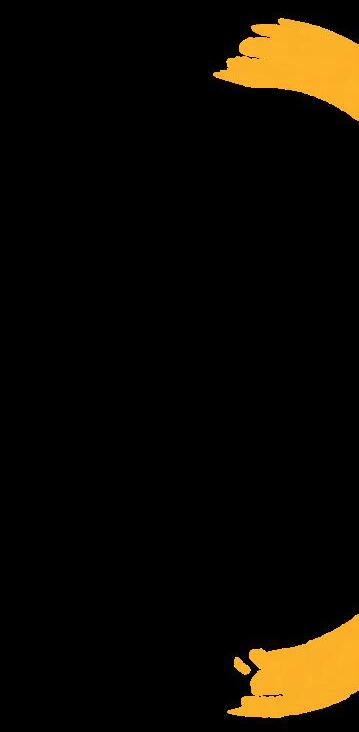

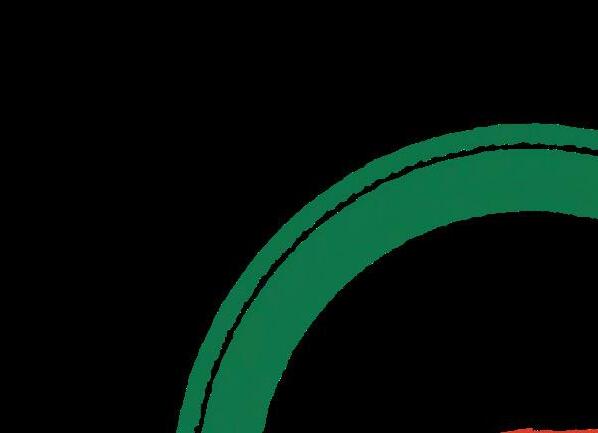
It is not that you have no background, It is that your backgrounds are incomplete. A banged-up patchwork of two, three, five different cultures


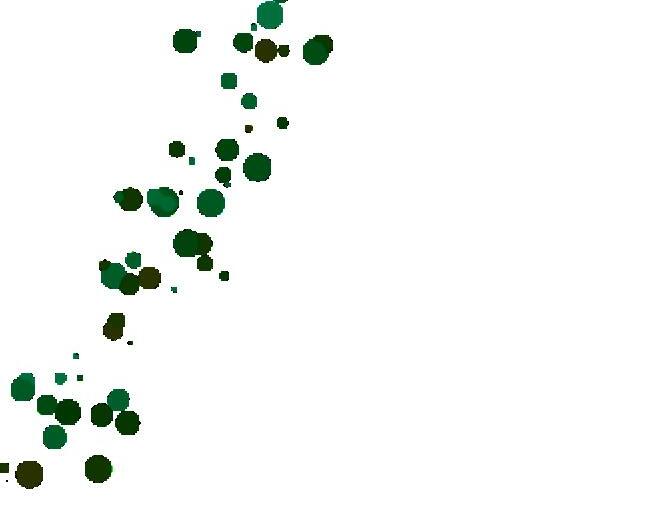

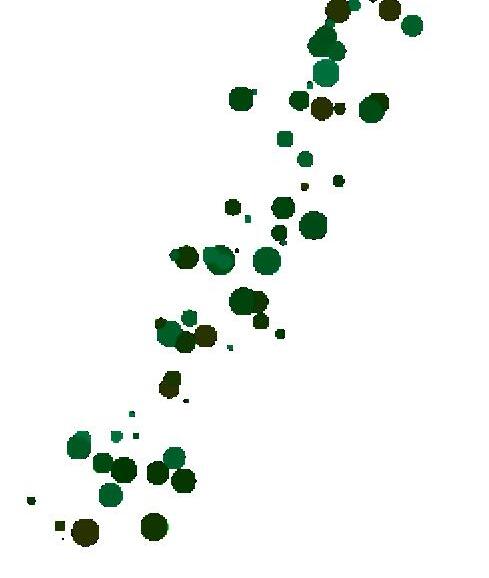
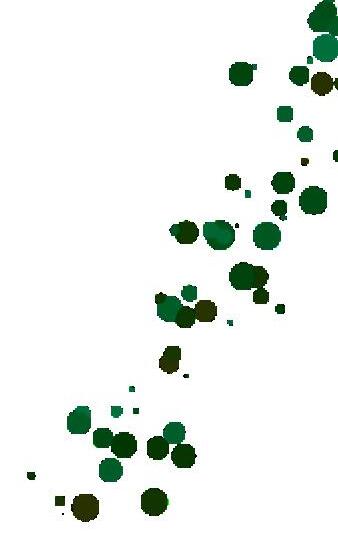

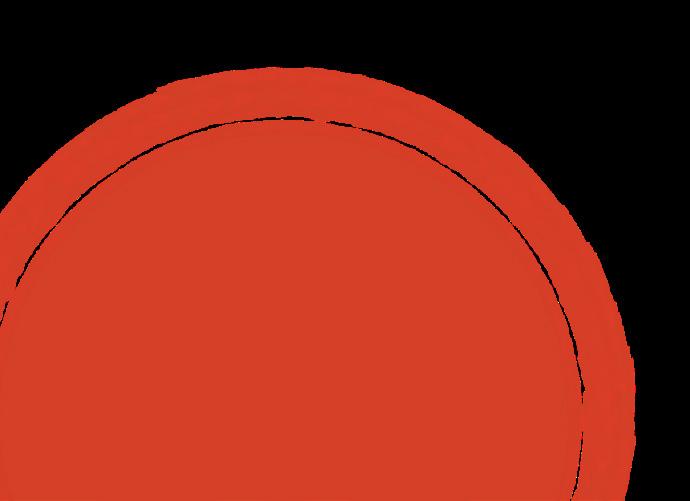
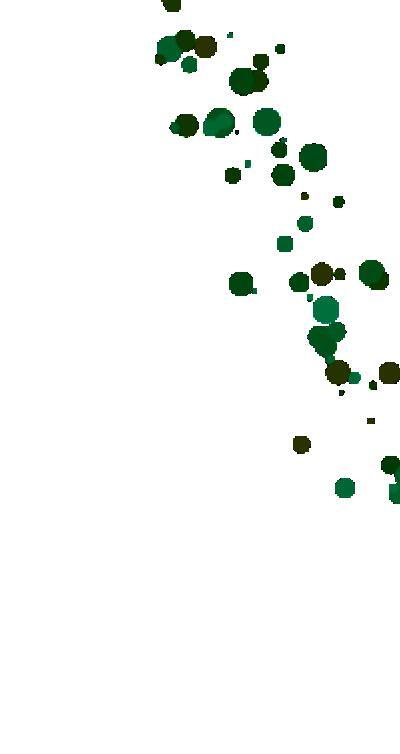
Knowing how to pass Never knowing enough to be.
What they don’t tell you is everything you miss When you try to be both.
I grew up resisting one or the other I am equally both I am equally me. But in truth, our society is constructed in boxes And no matter how flexible I am I can only fit into one at a time.

I have just enough Cultural currency to buy into both. I will never truly belong to either.
Poor, gray child. You get the worst of all worlds. A contradiction of the highest degree.
What’s it like to know you shouldn’t exist?
You shouldn’t exist.
You defy scores of different principles
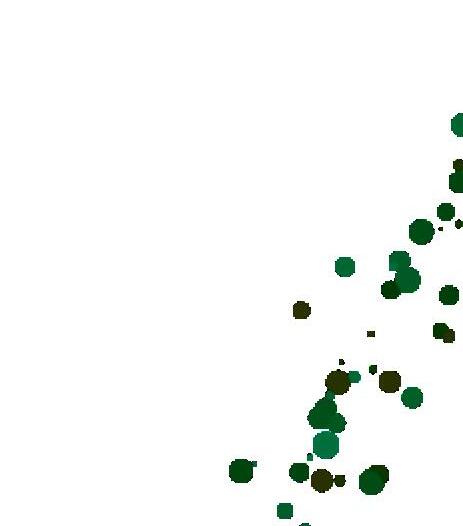

All at the same time.
You were illegal in dozens of states
Within the past century.
Racial theory says that we are immutable White is not Black, Black is not Asian, Asian is not Latino





Yet here you are.
An all of the above baby.

32
Consider Trevor Noah.
I read his book Born a Crime once. Our backgrounds are decidedly distinct, Yet I had never before felt a kin to anyone like this, Memories so akin to each other It was as though he had copied them directly from my head And laid them bare on the page.
He shouldn’t have existed. I am societally illegal–He was literally illegal, The kind of Coloured that gets you killed In a country where categories are drawn by fire and fences.


Still, he kept living his Milk-and-chocolate life Defined by racial relativity and chameleon changes Lightning-quick as he crossed Johannesburg streets.
He embraced being all of the above. The ability to pass.
Navigating the silted eddies of Black and Brown and White. Fading in and out of the background like second nature Like gray fog slipping through buildings. It was painful. It was easy. It was the only way he could survive.
Now, he inhabits the space in-between, Halfway between White and Black. I don’t know if it’s peaceful But at least it’s quiet.

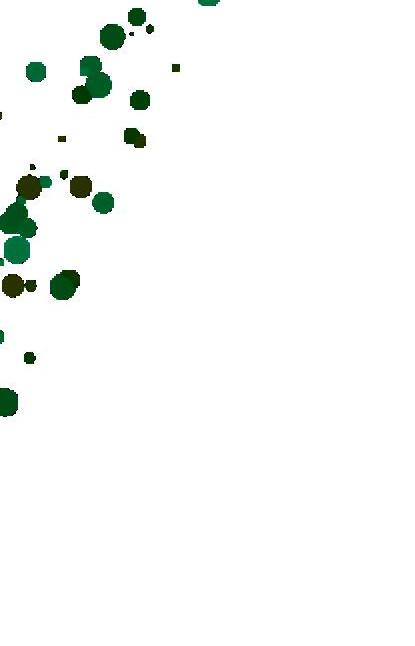
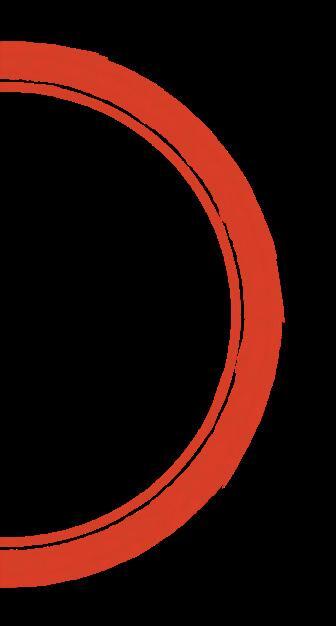


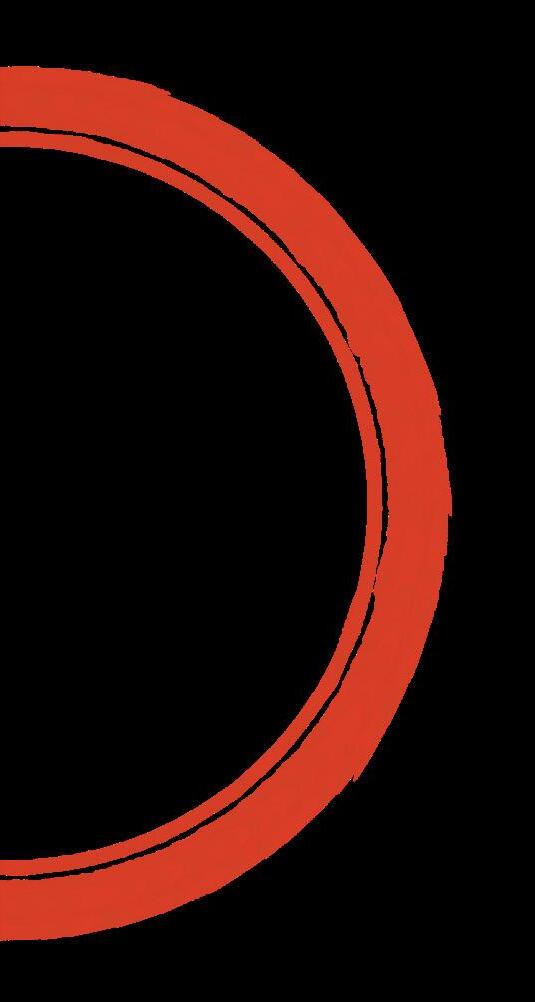


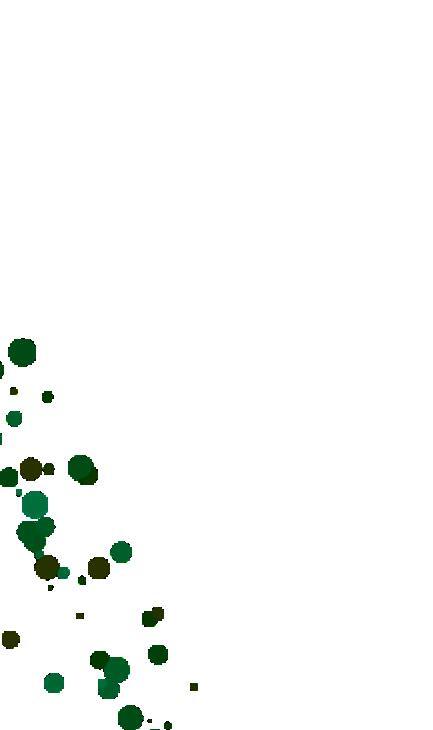

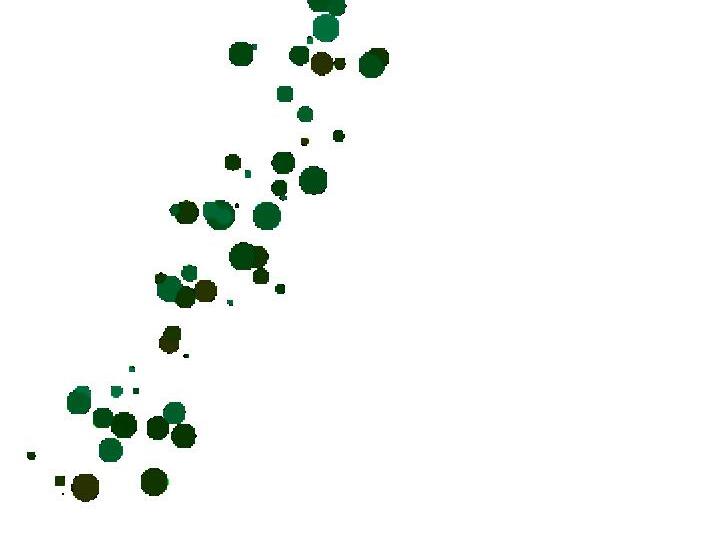







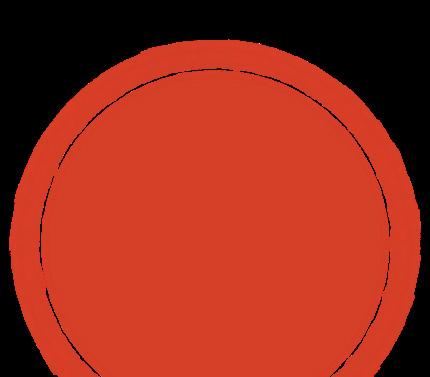
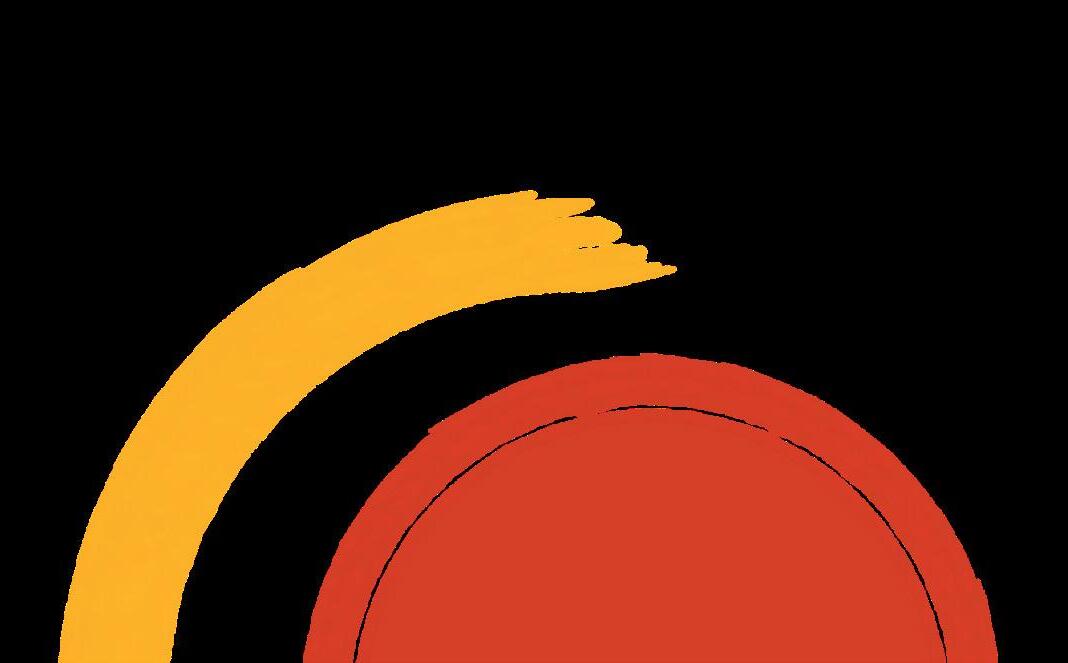

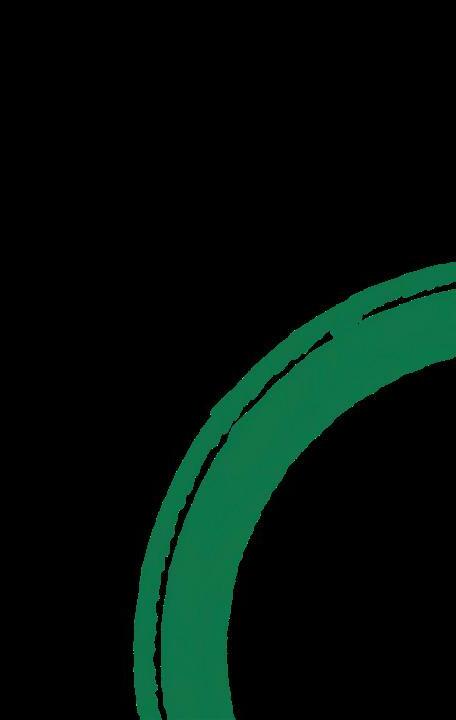

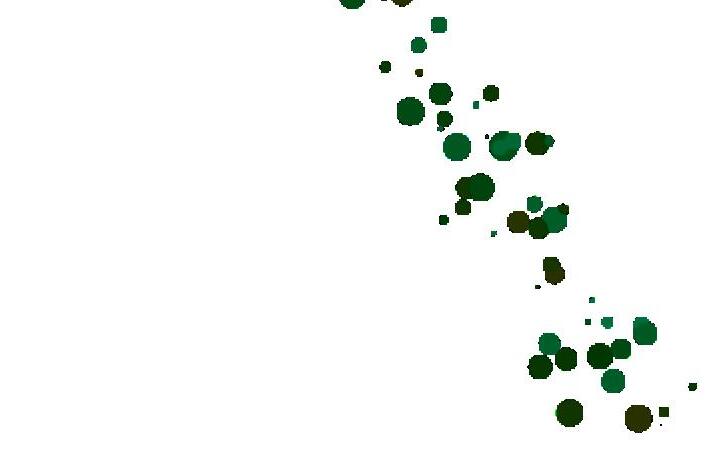

I think I’d like to be there someday. Instead of the relentless tug-of-war between White and Black, Just… be.
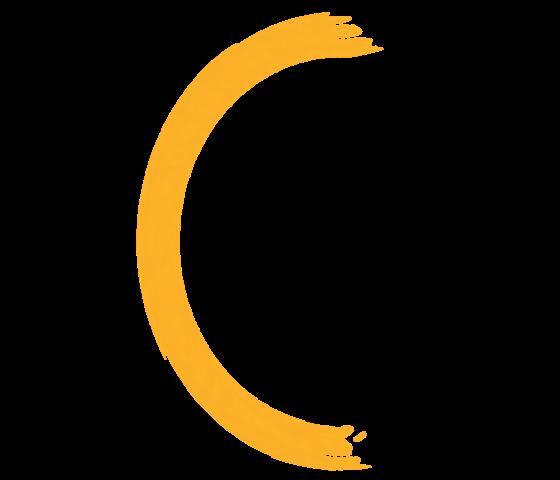
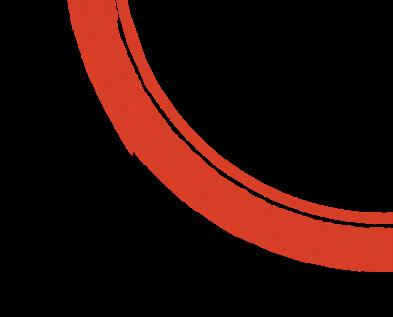











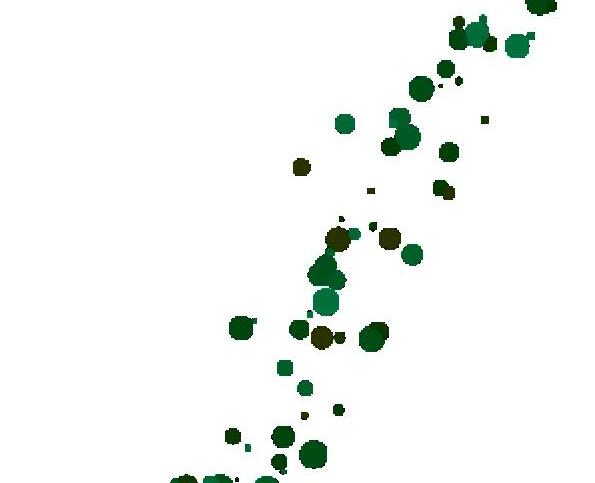
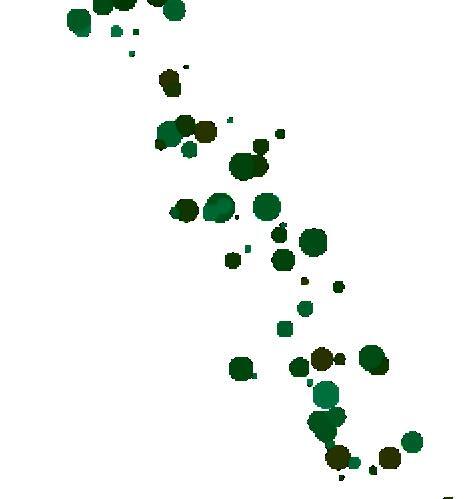

Gray child indeed.
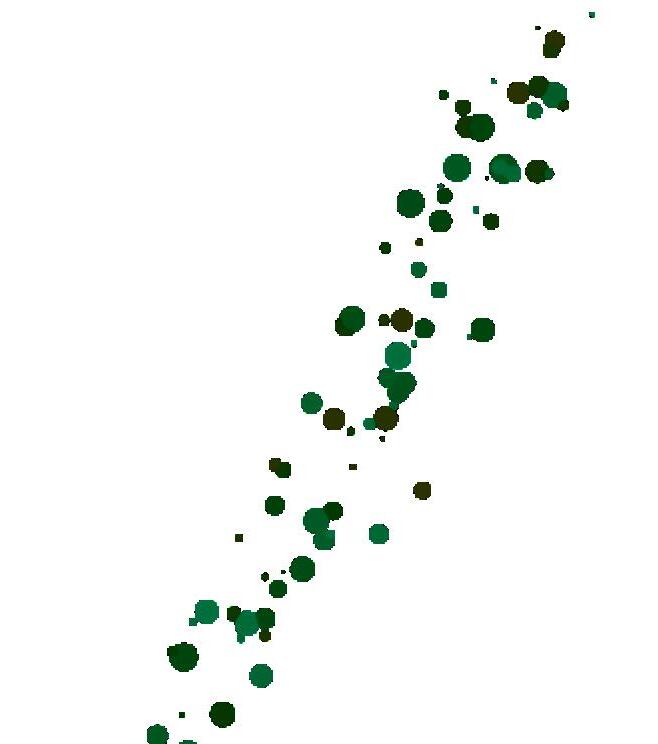
33
Music of the Diaspora: The Makings of a Legacy and Tradition
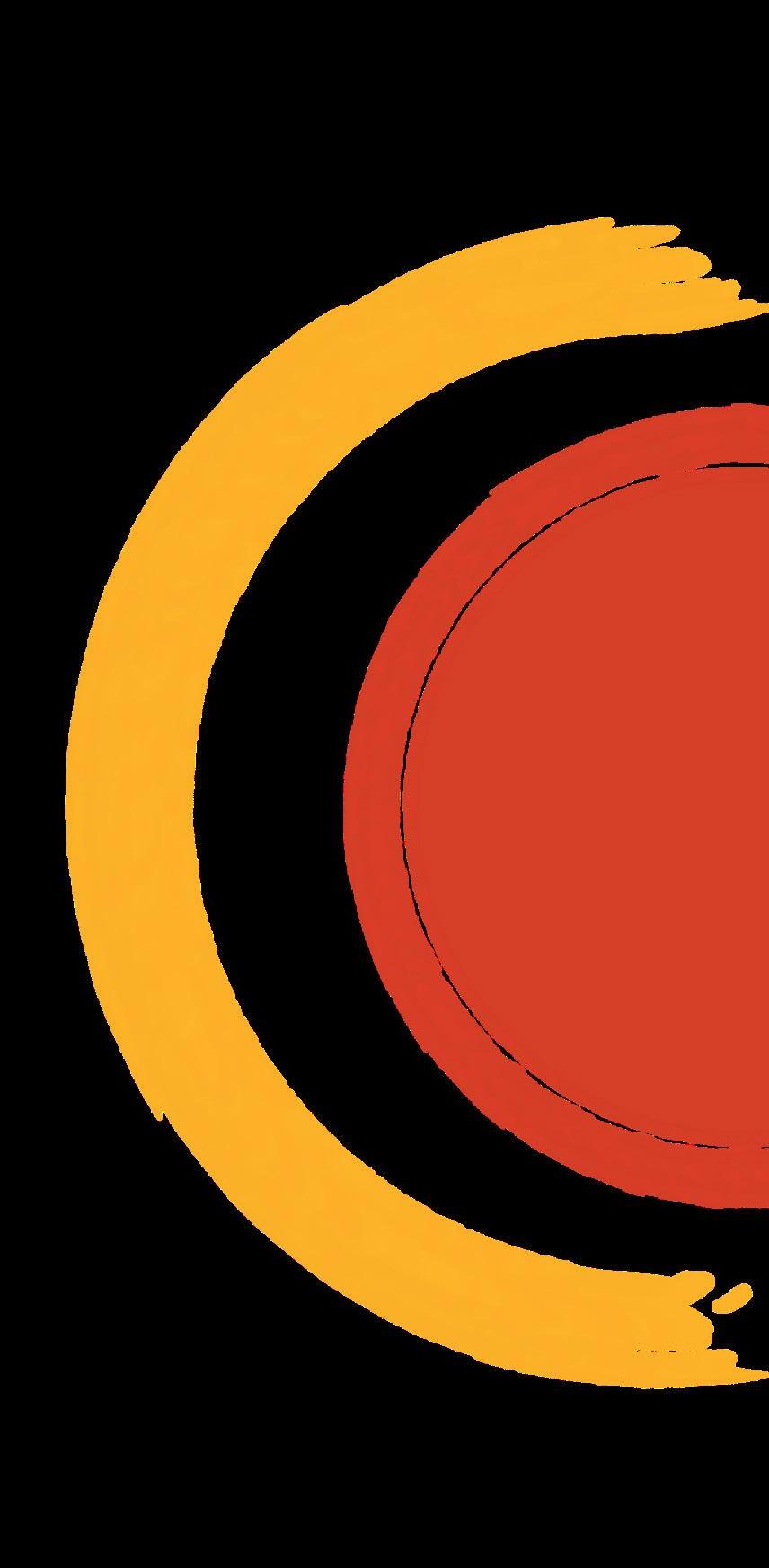
“Music is the weapon of the future.”
–Fela
“Shoutout my label, that’s me.”
–Dominique Armani Jones
NICK DAVILLIER diaspora contains a great variation of sounds from Nigerian Naija beats to Ghanaian highlife to modern afro-pop from artists like Burna Boy and Wizkid. Afrobeat provides a vital service in that it promotes West African culture on an international level and allows members of the diaspora to celebrate their heritage no matter where they are from.
Aníkúlápó Kuti
Two iconic quotes from two legendary artists. The first represents the revolutionary power of African music that has been used to overcome colonial oppression. The second declares the artist’s pride in his record label and has become an anthem for newer generations of rap fans. While these quotes suggest seemingly opposing ideas about the significance of Black music, they both convey the central purpose of Black artists: to promote and uplift their communities. By doing so, Black artists across the diaspora have served a fundamental role in the Black community.
The history of Black music is expansive in scope, and covers many locations in the African diaspora. In the African-American context, hip-hop and R&B dominate the American music industry, becoming the most listened to music genres in the United States in 2017, according to data from Statista. Although the majority of its listeners are not Black, both genres remain at the core of African-American musical culture. With songs such as “Freestyle” by Lil Baby (the song referenced in the opening quotes) and “Dreams and Nightmares” by Meek Mill, rap music has become a means to express inner city perspectives in African American culture.
Black music performs a similar purpose around the world. The creation of Afrobeat, a music genre pioneered by Nigerian musician Fela Kuti, has allowed West African music to grow in popularity across the world. While commonly referred to by the umbrella term “Afrobeats,” music from the African


In addition to its cultural representation, Black music also provides a valuable and unique form of political commentary and social insight on important matters in the Black community. Since enslaved Africans were brought to the United States through the Middle Passage, religious spirituals were used as instruments to relate their
Floyd (2020), and Breonna Taylor (2020), people were called to march in the streets to protest the issues of police brutality and systemic racism. This tradition is mirrored in the African diaspora, as shown in Caribbean music and culture. Writer Angelique Nixon explains that music culture in Jamaica created a platform for artists to both navigate their identities as Afro-Caribbeans and participate in critiques of colonization and globalization. Nixon describes the integral role dancehall music plays for Jamaican women and LGBTQ+ artists, who are able to use their music to push the boundaries of gender and sexuality representation.
experiences to one another in efforts to overcome their subjugation. This tradition continued into the twentieth century with the Civil Rights Movement, where songs like “A Change Is Gonna Come” by singer Sam Cooke became an anthem to mobilize African Americans against segregation and racial violence.
Today, music continues to influence the political and social consciousness of African Americans. Through the use of rap songs such as “Alright” by Kendrick Lamar, which played a significant role in rallying younger generations of African Americans in the Black Lives Matter protests following the killings of Michael Brown Jr. (2014), George

Black music also provides an economic benefit to the Black community, both on an individual and collective level. Music careers provide avenues of economic revenue not only for the artists, but also for the communities that shaped them. For example, the late rapper Nipsey Hussle is praised for his work to rebuild his Crenshaw neighborhood in South Los Angeles, namely through advancing the education and economic opportunities for Black and Brown youth. Hussle’s music allowed him to improve his community through several projects, such as financing renovations at local elementary schools and investing in community centers in Crenshaw geared at expanding education in STEM and African American history and culture.
Throughout recent history, Black artists have dominated the popular genres of the music industry, and become some of the most iconic musicians in the world. However, much of their craft can still be attributed to the valuable music history in the African diaspora. Whether it be the traditional Afrobeat of West Africa or the latest sound of American rappers, Black music has and will always be grounded in the social advocacy, cultural expression, and economic opportunity of the Black community.
34
“Today, music continues to influence the political and social consciousness of African Americans.”



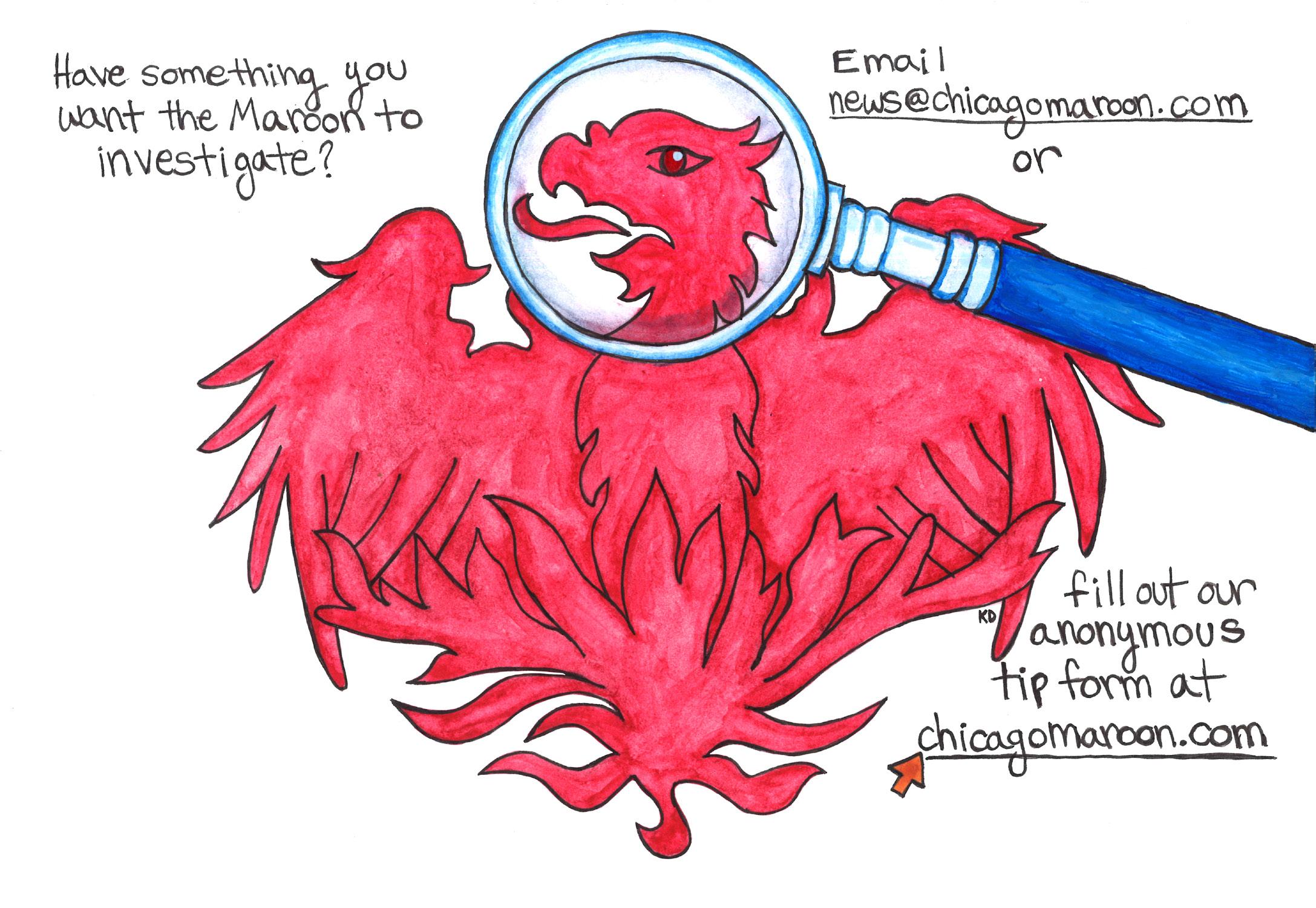
35
The Visuals Series



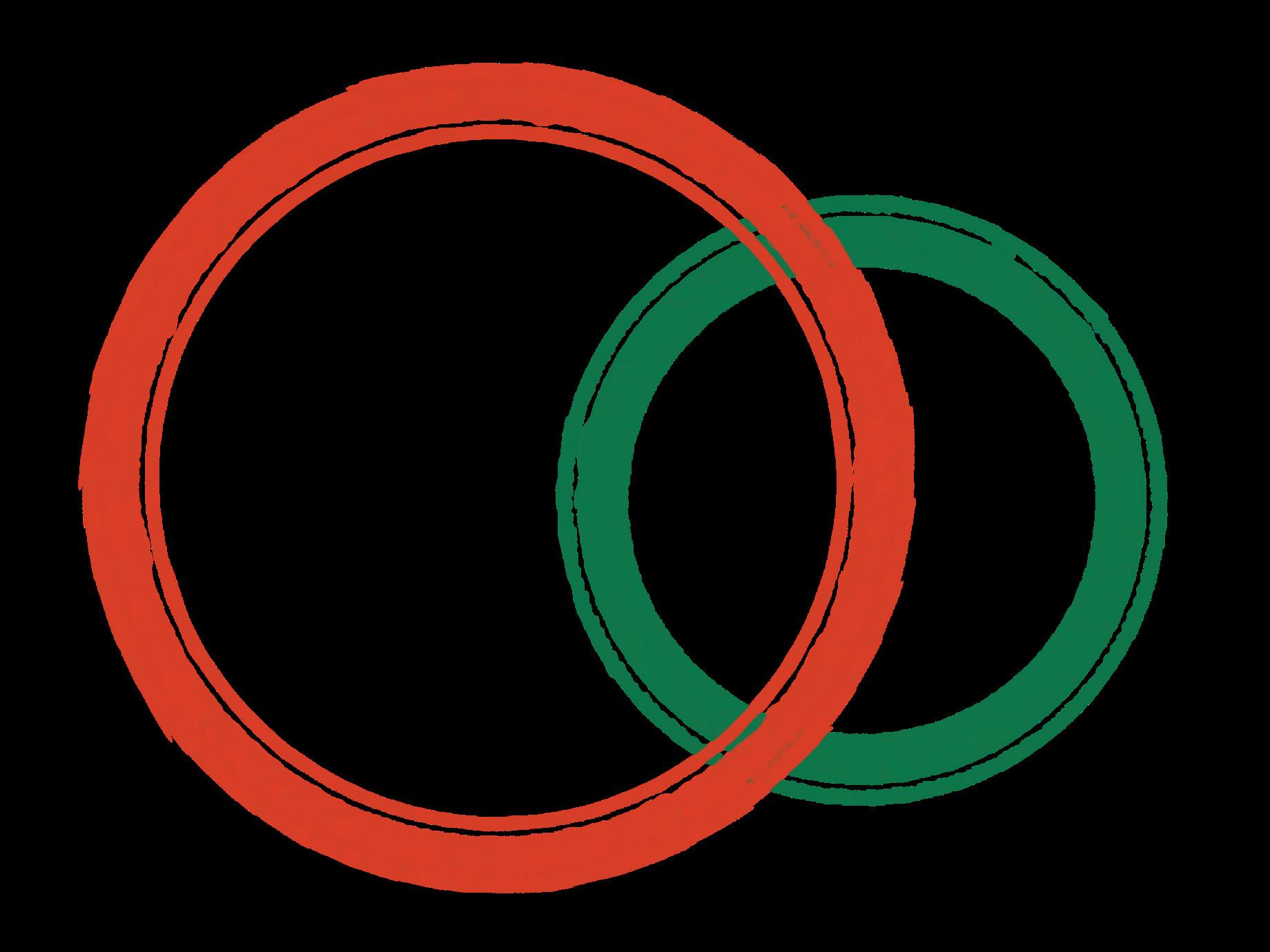

An Introduction to the Visuals Series
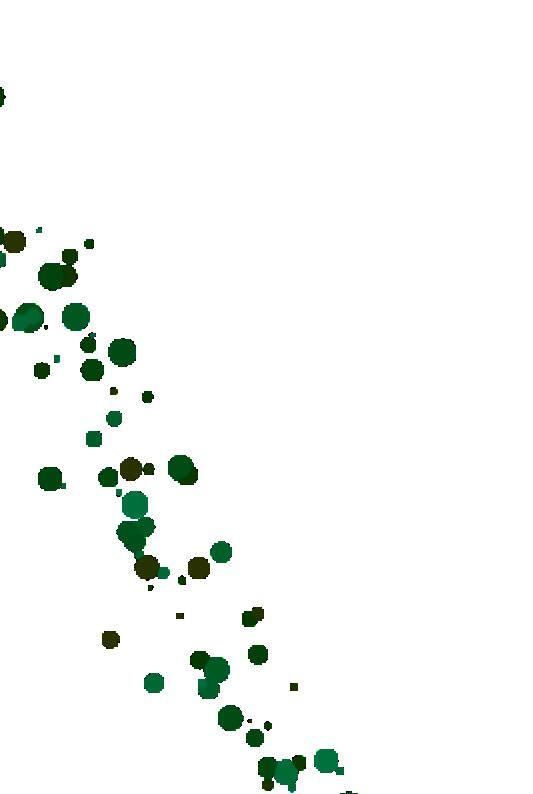



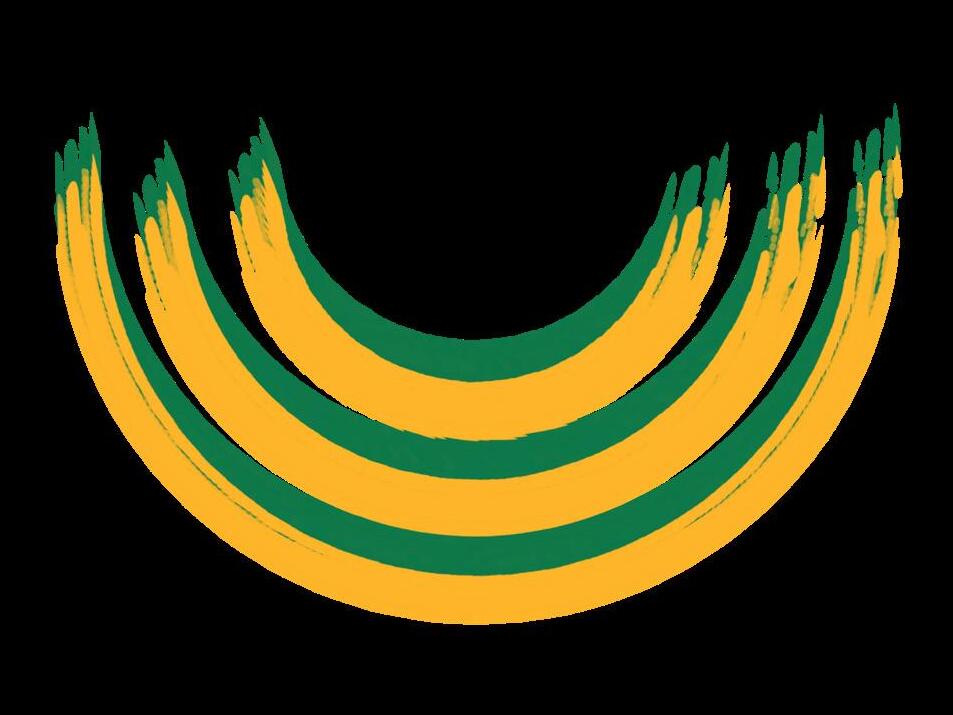
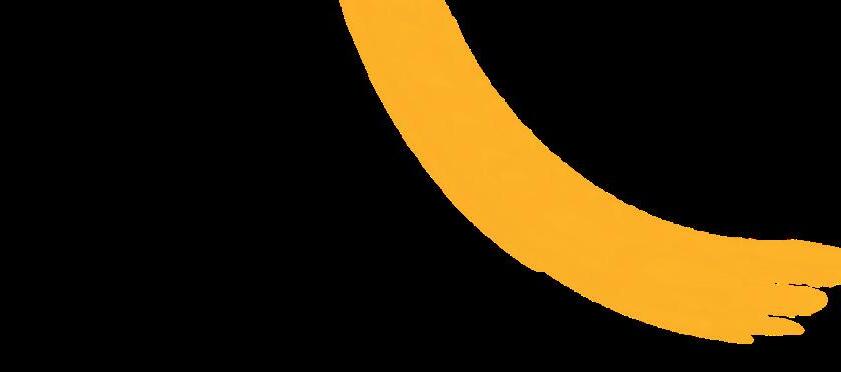
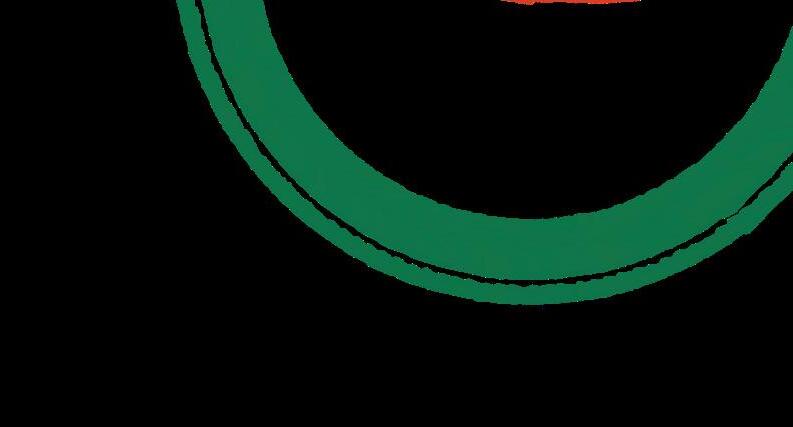
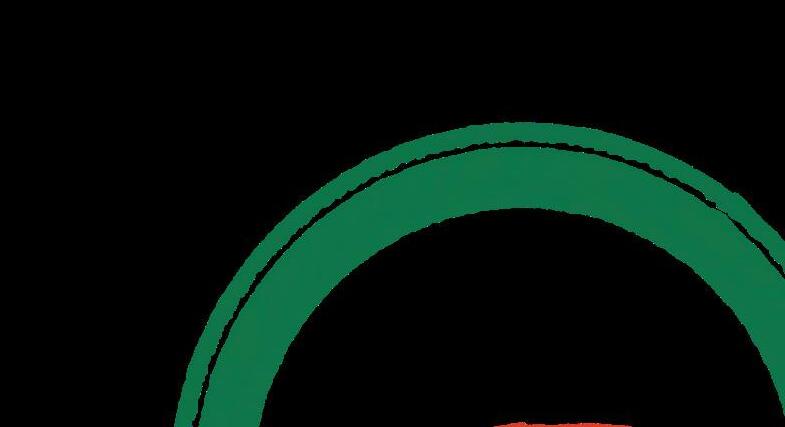

 by DESTIN BUNDU & SARAH GAUDRON
by DESTIN BUNDU & SARAH GAUDRON
The Visuals Series is a home for Black student photographers, artists, and storytellers to thrive and be inspired by our unique Black community. Visuals uses photography to archive unique creative experiences that student artists cultivate. The Visuals Series hopes to be an archival space of Black beauty, euphoria, and excellence at UChicago, Hyde Park, and the city of Chicago. Visuals uses our creative team and programs like our artist-in-residence program to embark on a creative journey of writing, directing, and producing a complete editorial photo shoot. Visuals provides Black students and community members access to the creative process of taking ideas of creating art with a community and sharing thoughtful commentary through being in charge of a project’s execution. Mentorship is one way we make community pairing students with senior photographers within the student body and artists of color throughout Chicago. Visuals also provides students and community members with professional networking and mixing media art professional development. Within the last year, the visual series has been able to have three artists’ works published in magazines and one artist’s work showcased in a gallery. To interact with the greater Southside community, we have also established a partnership with the Bronzeville Youth Identity Collaborative to mentor high schoolers interested in photography or creative directing. The high school students assist Visuals members in planning and executing a photoshoot. They cultivate hard skills in handling photography equipment and editing software while getting hands-on experience in the creative process. The Visuals series holds community as a core value within its use of photography as a medium to hold the beauty of lived experiences within a moment. Visuals understand that art is resistance to what we won’t accept and appreciation of who we are and the gift we create. The Visuals Series is an art collective that works to empower the artistry and beauty of storytelling and visual arts of Black creatives.
36
The Visuals Series
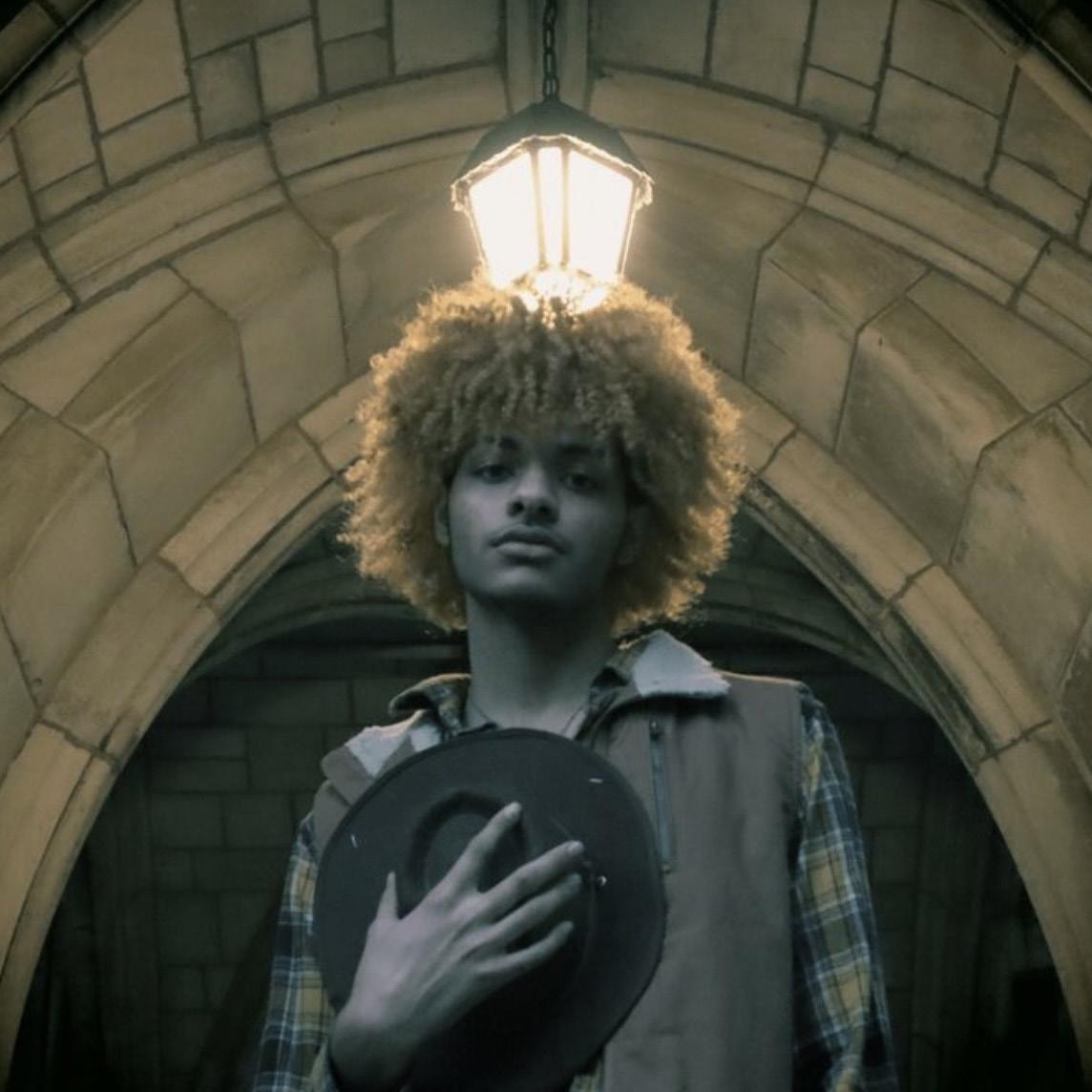
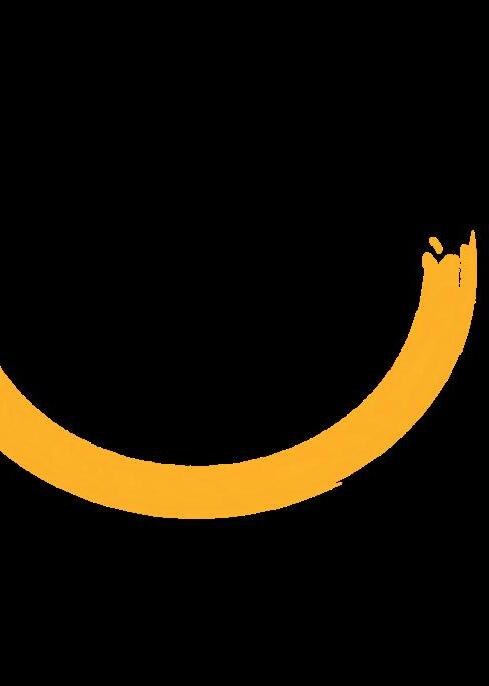


Inaugural Creative Resident Cohort
Reclamation: The American Cowboby


Ndidi Opara
Ndidi Opara is a second year at the college studying Public Policy and Media Arts and Design. Outside of classes and her job working on Social Good communications, Ndidi is passionate about music, fashion, and culture.
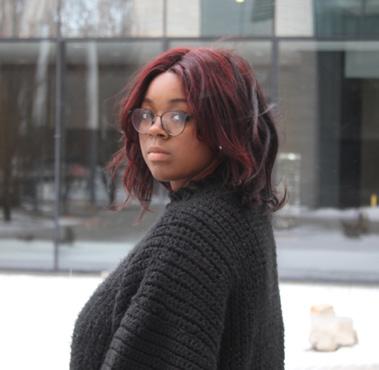
“Reclamation: The American Cowboy” commemorates the Great Migration. This event denotes the relocation of approximately six million African Americans from the South to cities in the North, like Chicago. “Reclamation’ “hopes to reclaim the idea of the American Cowboy as something created for us, by us, while paying homage to southern artist Solange.
Models: Max Ntalamu, Jasmine Jones, Nick Smith
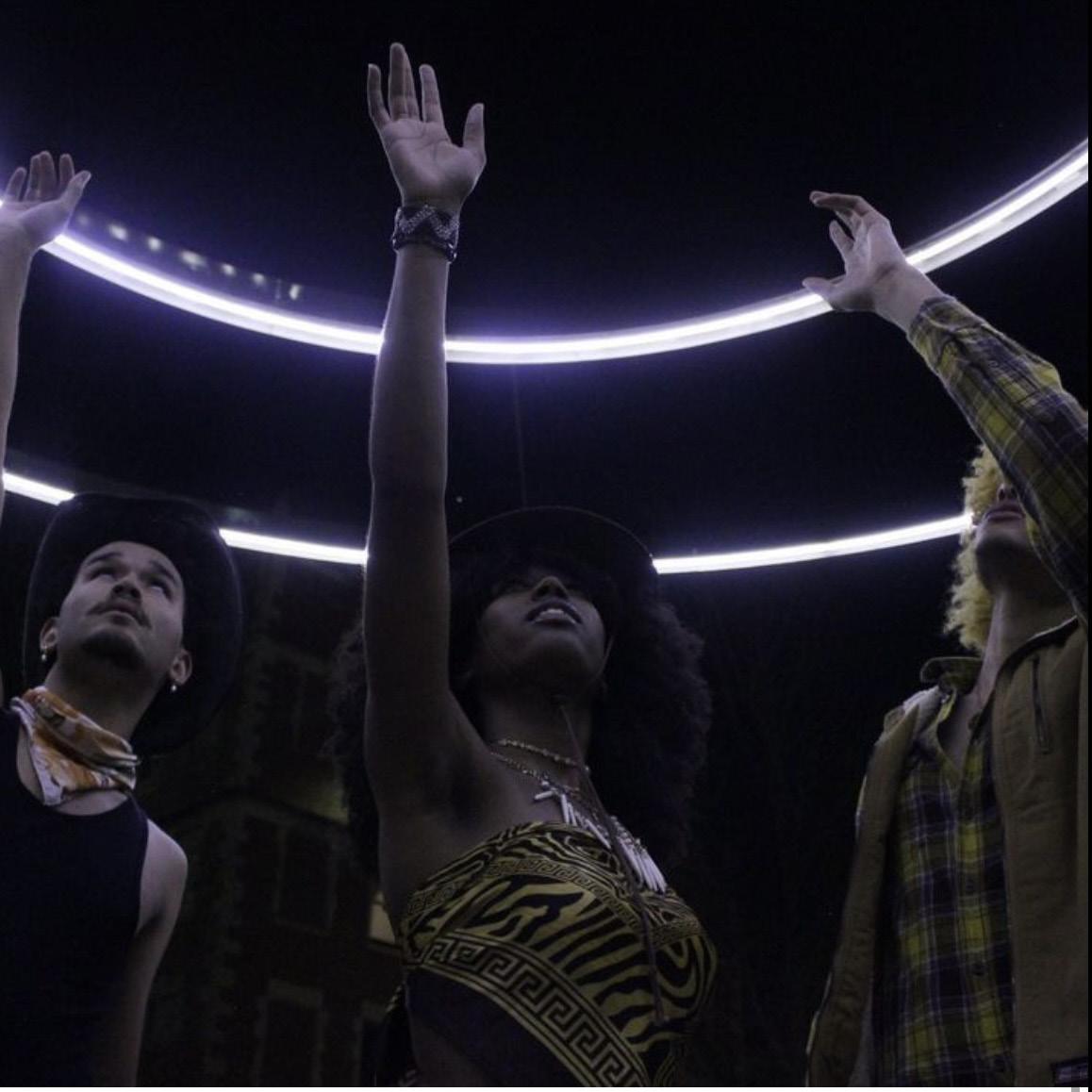
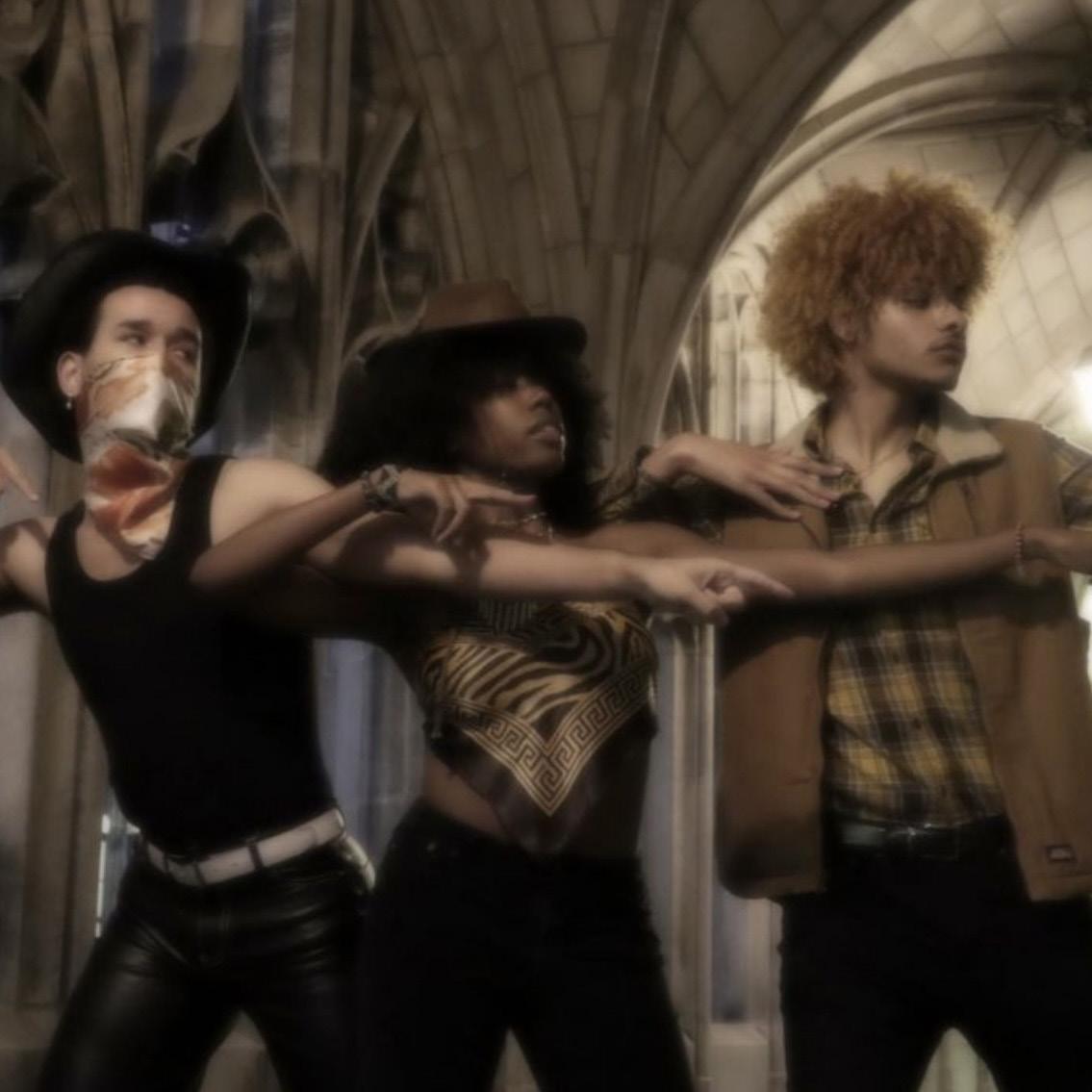
Contributors: Destin Bundu, Sarah Gaudron, Brandin Moore, Mardet Mulugeta, Juliet Daniels, Arianna Lafontant
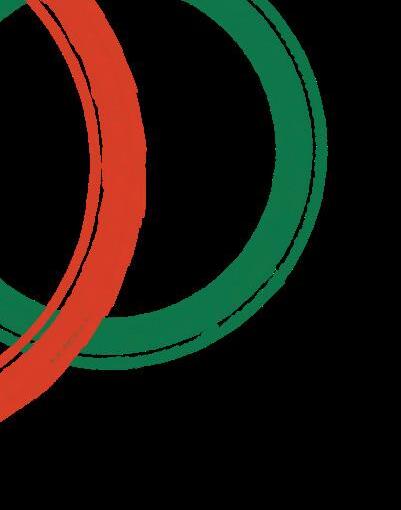
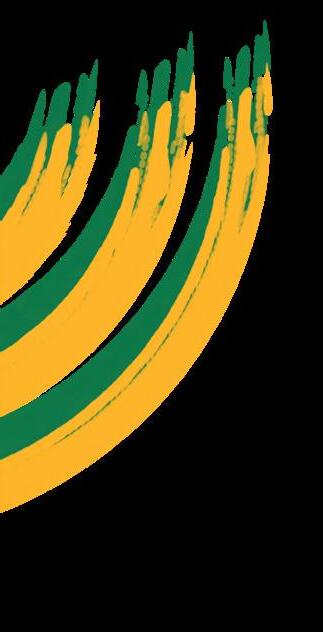

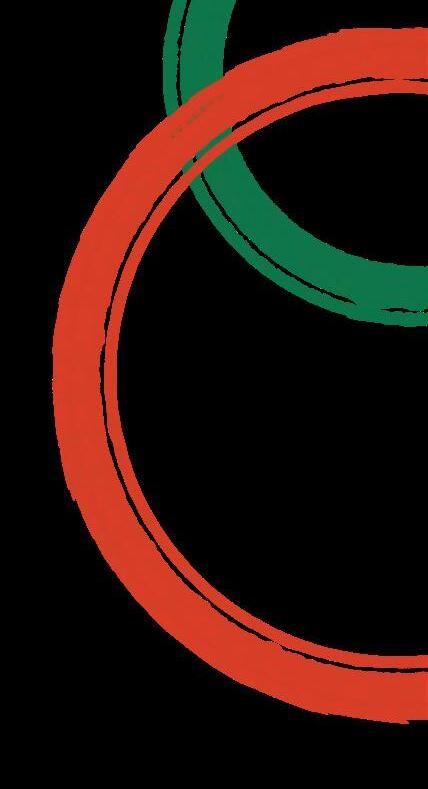






37
Houwze Muzik: Queer Histories & Black Magic
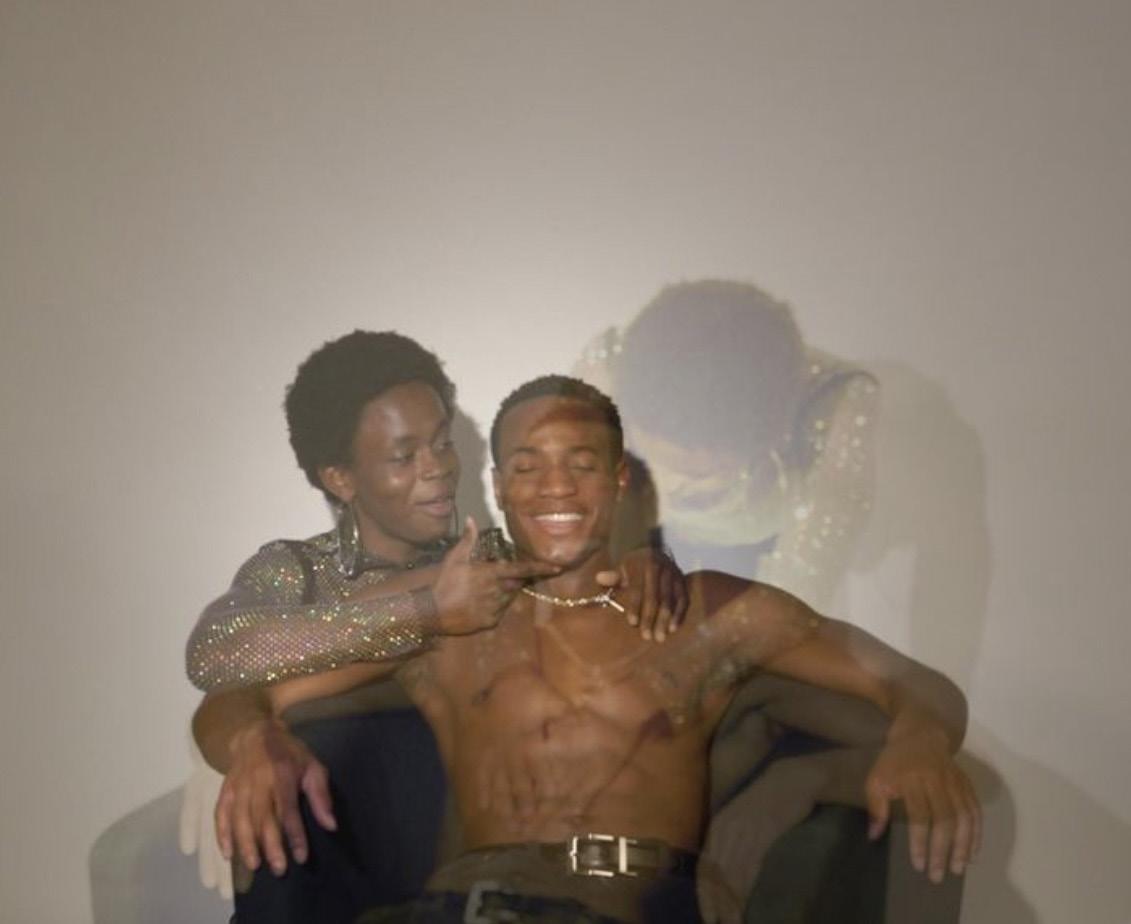





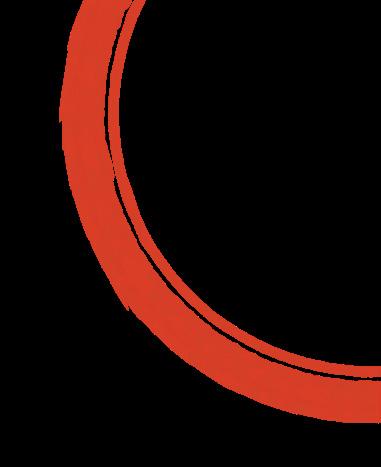
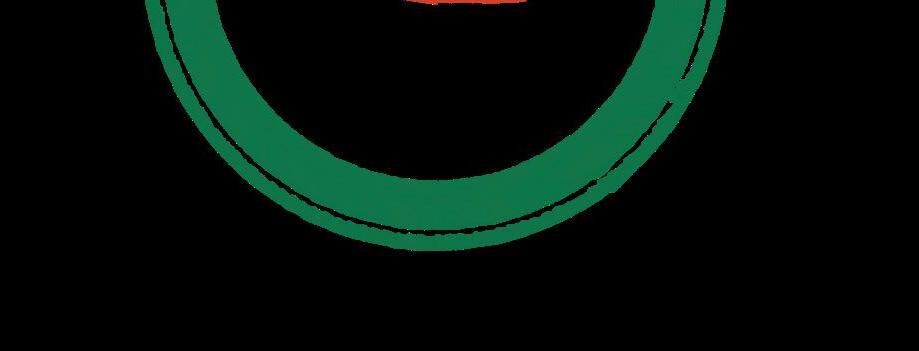


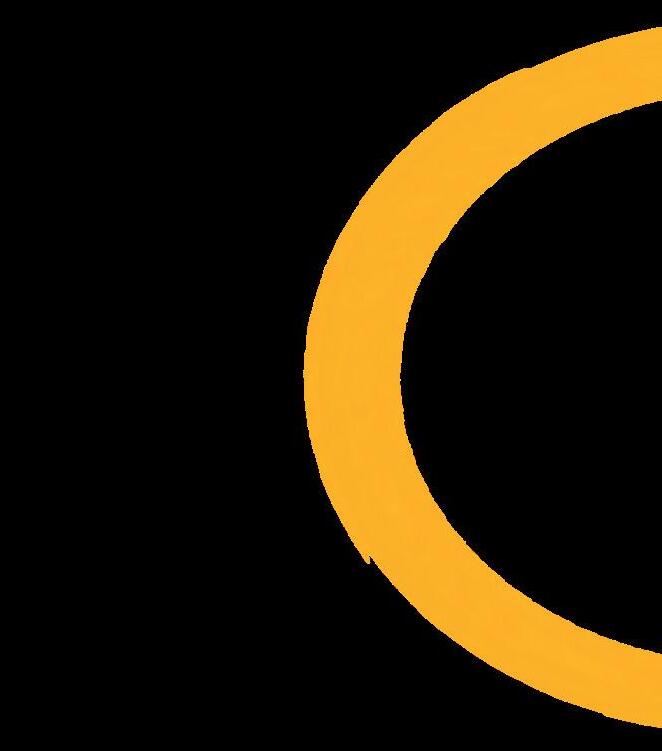
Arsima Araya inspired by a poem written by Reginald BoClair
My Howze
Reginald BoClar

Muzik is a part of my life. When I think of my life, I think of muzik.

Growing up, the Blues, rhythm and Blues, P-funk, punk-funk, and slow jams all talk to me as I lived and longed for love. I longed to be loved. I longed for a love that was mine, that did not hit me and hurt me and the name of discipline. As I grew into family people punk preppie and then I found Howze!
Oh how I love thee, my muzik. After you, I could never love another as I love thee. Sure, I flirt because man was not me to be alone, but it’s nothing because you are the air that I breathe and without you, I choke, no joke.
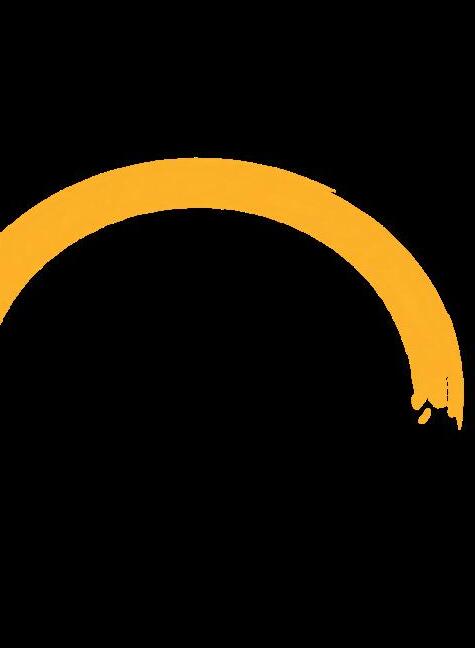
Because in the moment you and I first met, it was the only time in my life I ever felt free. So my muzik, my beloved howze muzik, in you I’m reminded of Streetkid filled nights, with joyful, foot stomping rhythms to the early morning light. Having just featured my soul at church filled with the Holy Spirit of ancestral beats beneath the city streets of the concrete jungle period muzik, my beloved howze muzik, oh how I love only thee through you I am able to transcend my environment and nostalgic field thoughts about the moment I first met you during the time we both were immature, trying to be grown, but at least back then we both were free.
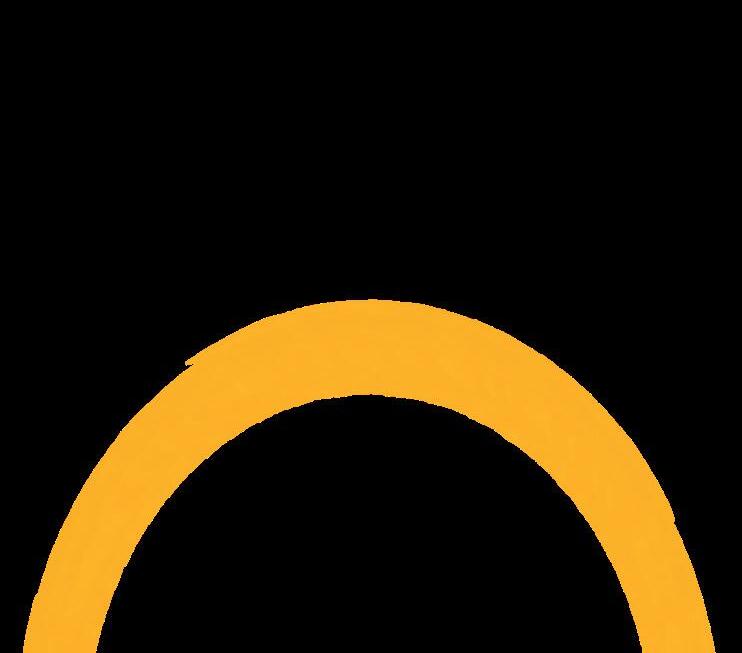
38
Arsima Araya is a second year student studying Race, Diaspora, and Indigeneity and Anthropology. She is currently enrolled in UChicago’s first mixed enrollment class with incarcerated students at Statesville Correctional titled “Narrating Social Change.” Among the class topics of abolition, the arts, activism, and Chicago history, House music was a bond held by many in the classroom, thus inspiring this shoot. The origins of House are rooted in the history and magic of Black queer people and to appreciate the art of this shoot is to appreciate their history.

This shoot is a visualization of a poem Arsima’s classmate, Reginald BoClair, wrote titled “Houwze Muzik.” The poem is a love story between himself and House. Reginald, self-proclaimed Houwze Head, was a DJ in the 1980s and an avid House listener. Arsima is honored to share this piece with you all and hopes you will see and connect with the painfully beautiful relationship between music and relief, love, and freedom.
Models: Tumi Onabanjo, Sebastian Davis, Alex Webb

Contributors: Destin Bundu, Sarah Gaudron, Brandin Moore, Mardet Mulugeta, Juliet Daniel, Malaz Nour, Arianna Lafontanant
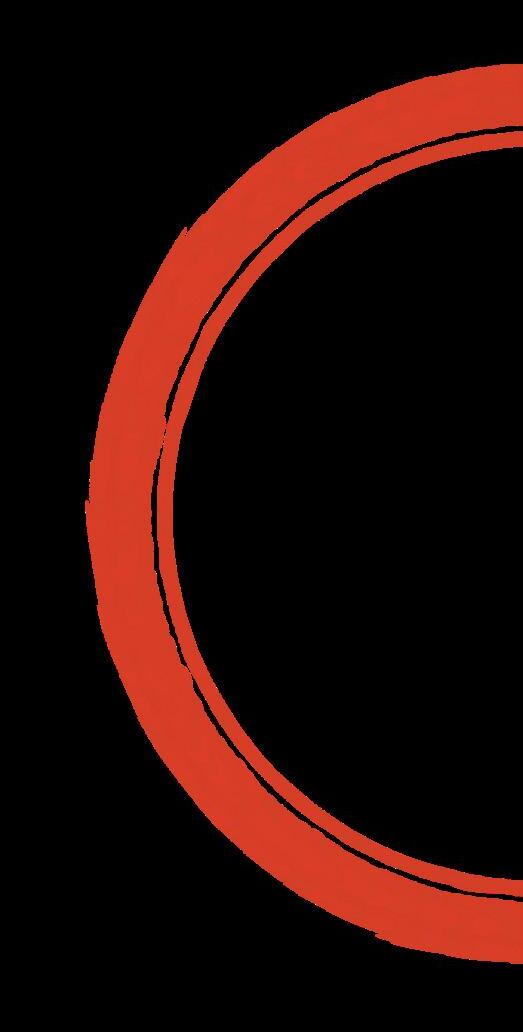




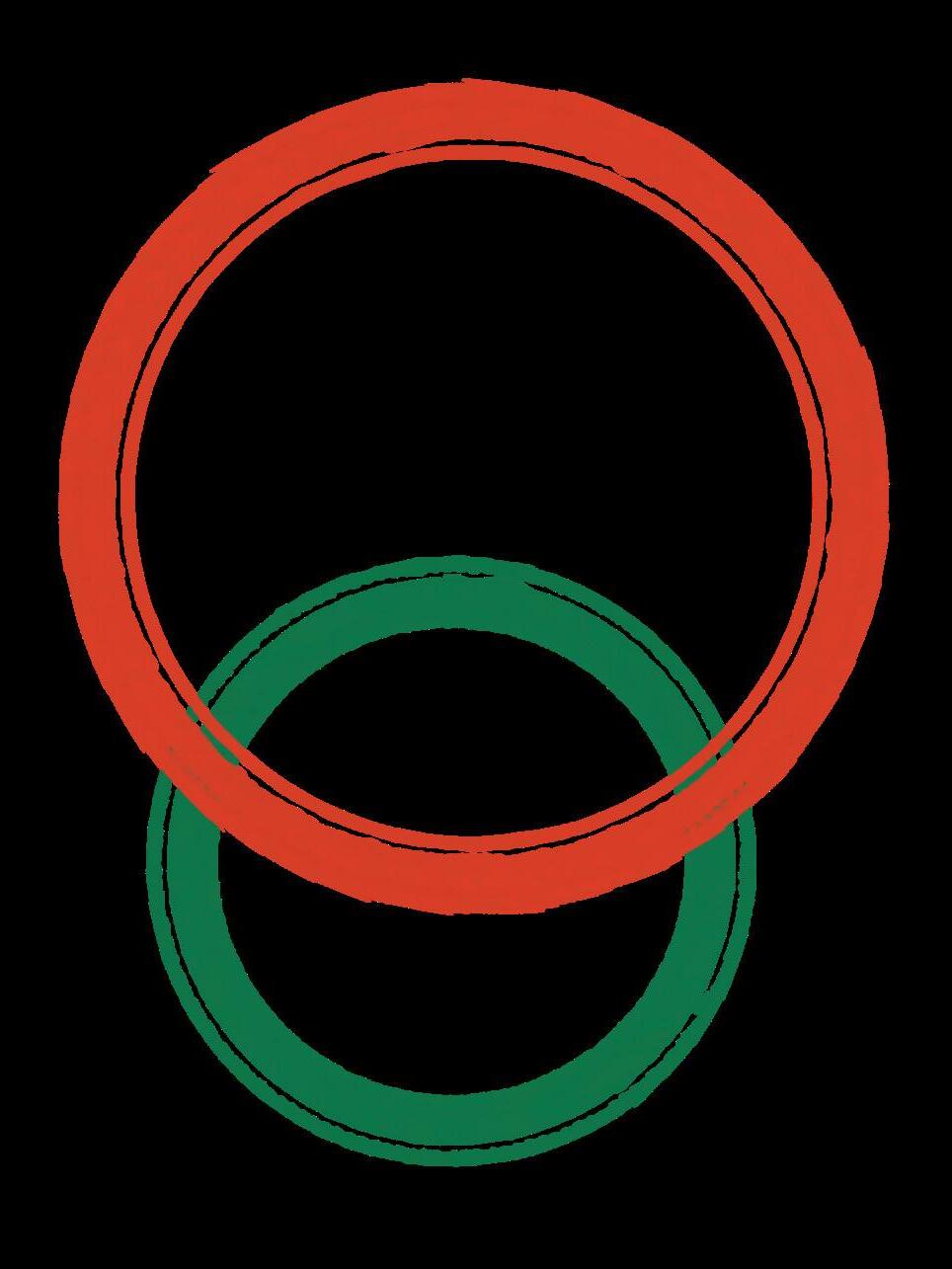



39
Performance of Self
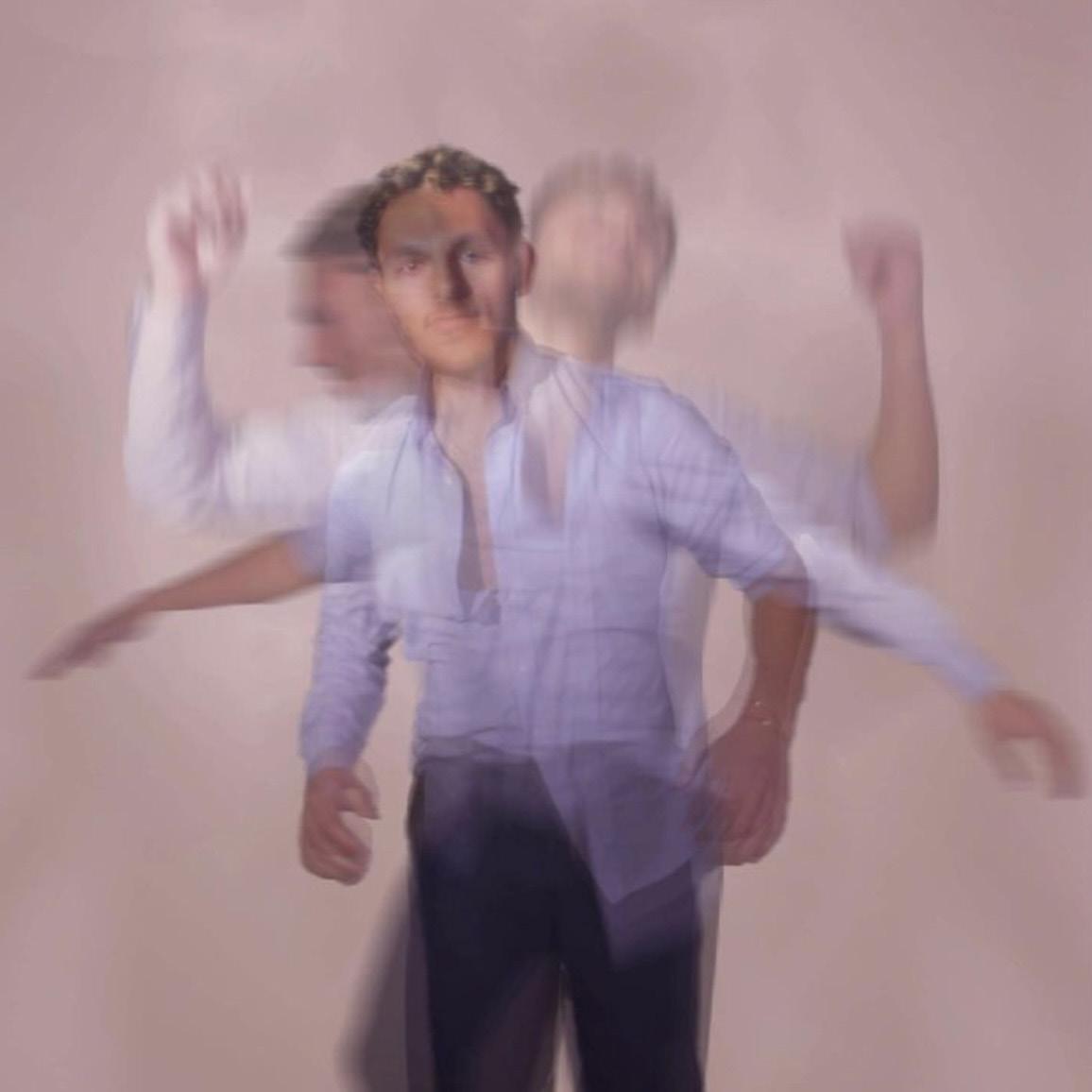
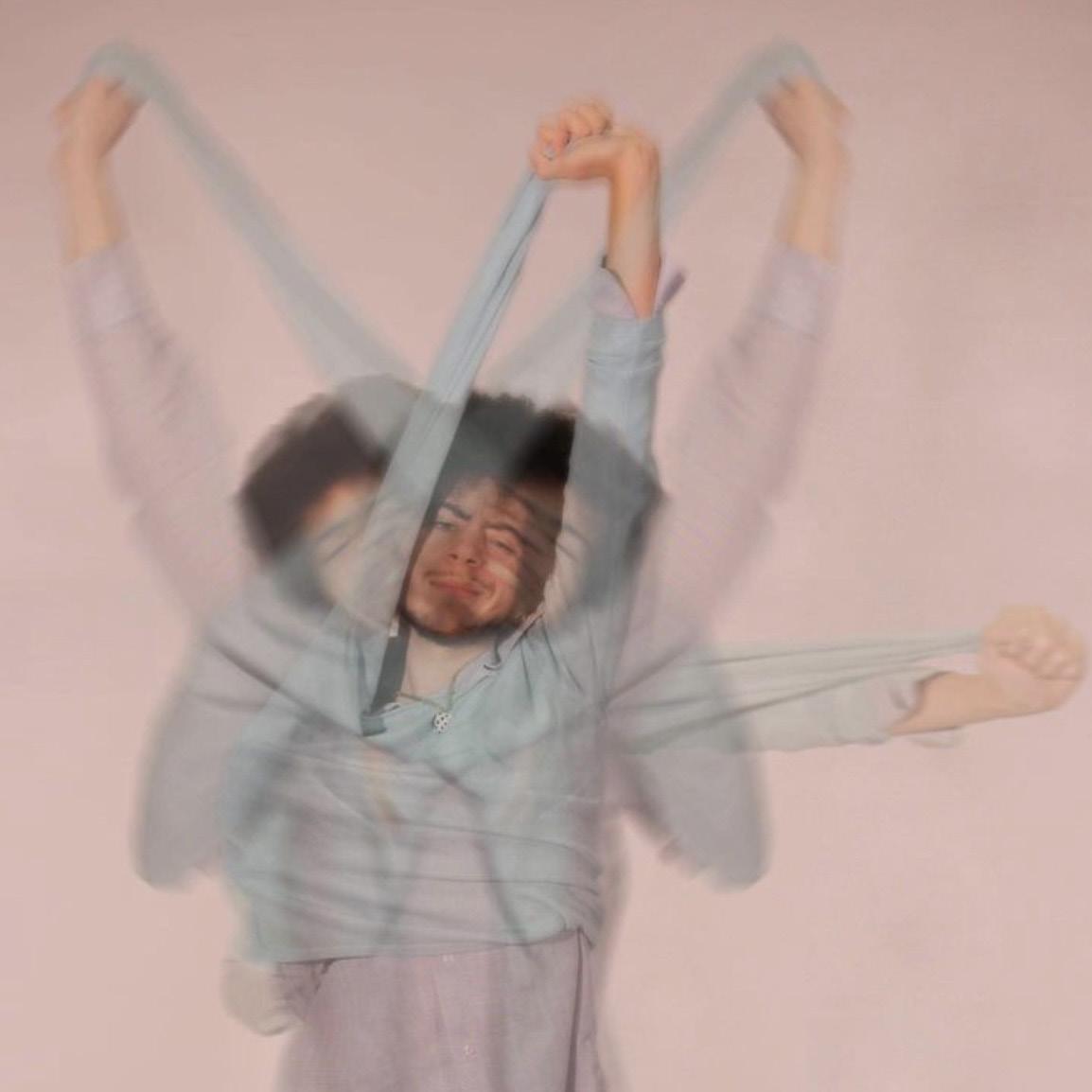
Malaz Nour
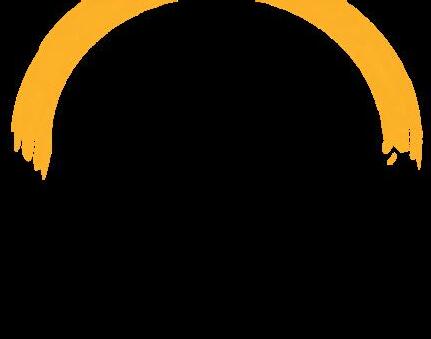
Malaz Nour is a second year studying Art History and Anthropology with a concentration on Africa and the Middle East. Outside of school, she spends time visiting exhibits around the city and participates in several Black affinity organizations and campaigns. She is passionate about contemporary African art, music, and culture.
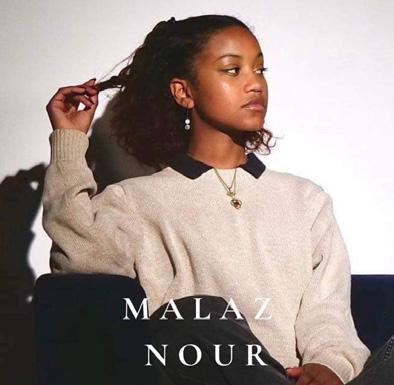
“Performance” is a visual exploration of social expectations placed upon upon Black bodies in predominantly white spaces such as the University of Chicago. This shoot challenges what is considered “proper” and “acceptable” versus otherwise inappropriate in these environments. These bounds on self-expression confine Black bodies to different degrees, and it is only upon failing these expectations that a sense of newfound expressive freedom is discovered.
Models: Alexander Stern, James Roberson, Elizabeth Désir
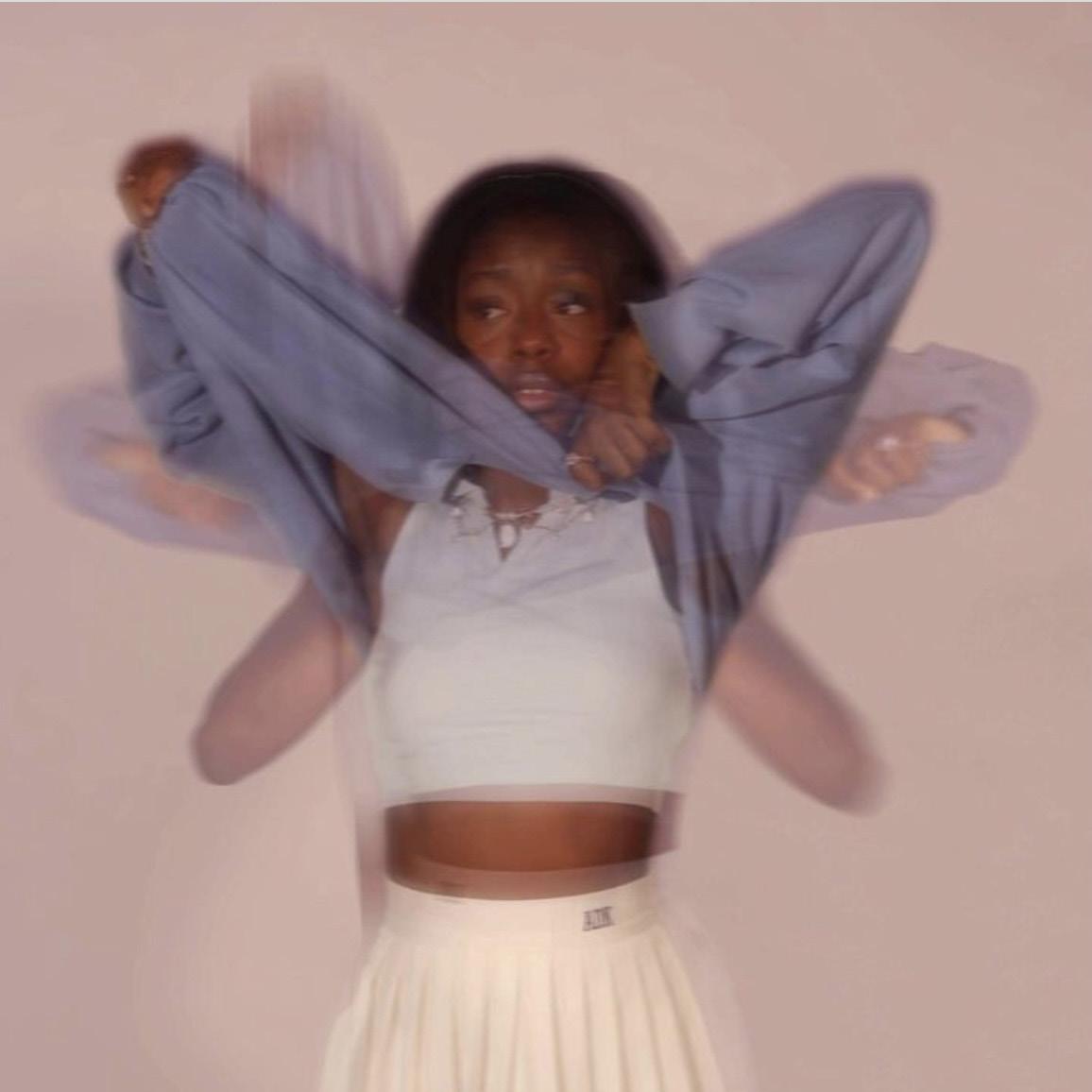
Contributors: Destin Bundu, Sarah Gaudron, Brandin Moore, Mardet Mulugeta, Juliet Daniel, Arianna Lafontant, Arsima Araya




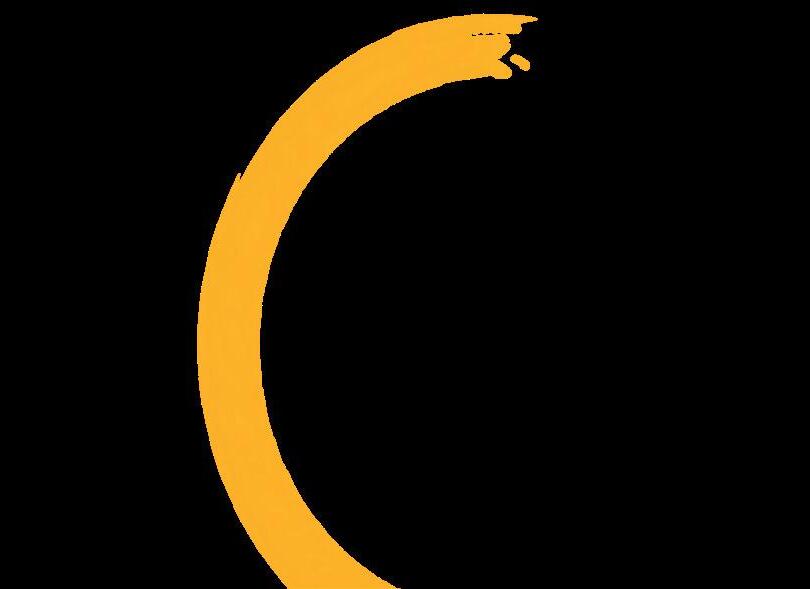

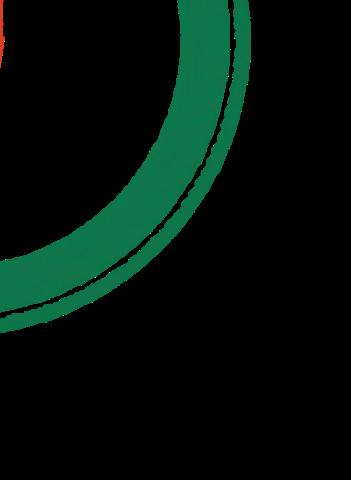

40

41
Chasing Success
MALAZ NOUR
Success is defined for me by its elusiveness. Sometimes it’s tangible: I can grasp it in the terms of money, grades, or works I want to produce within the year. Other times, it slips through my fingers as I contend with what I consider to be my source of happiness, contentment, fulfillment. Regardless of the *kind* of success I’m seeking, once one thing is accomplished—before I have the time to revel in what I have done—the goalpost shifts. It’s an endless chase. It can be exhilarating, but at an institution like the University of Chicago, more often it’s exhausting. That’s because success here is often rooted in comparison. I can be good, but I can never be great, or at least so I thought. It is the Black community of the University of Chicago that reminds me otherwise.
This past autumn quarter opened with a mixer hosted by the African and Caribbean Student Association and the Organization of Black Students, and as we all stood together in the finger-tingling chill, I caught bits and pieces of students speaking about what they wanted to achieve during the school year. These students had vastly different interests, hopes, and goals for themselves in mind, but regardless, I found comfort in the thought that we were all working towards something simultaneously. I revisited the students from the mixer as the quarter ended, hoping to know one of three things: what their version of success was, what their proudest success was, or what they envision for themselves in the future. The University of Chicago can be isolating in its competitiveness, we’re all striving to be the best version of ourselves for the sake of our futures, but to remember we are all doing so together is a community success in and of itself.

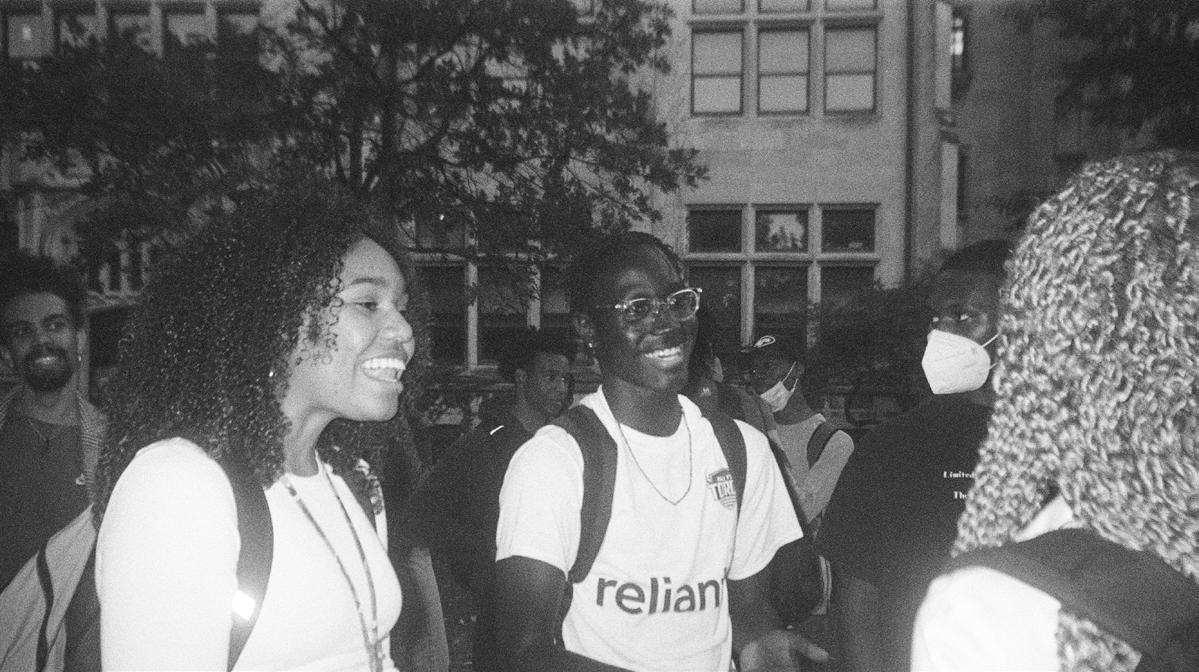
Narvella





Sefah, Class of 2024
“Success to me is non-linear. I don’t think it’s simply a threshold that you must reach. Success is achieving the goals you have set for yourself, but importantly to me it must include physical and mental health. Success is living a life that is according to my purpose, and a life that is fulfilling. I think that I am successful now because I am happy, healthy, and achieving my goals that I set for myself and that as I continue to grow and learn, I will become more and more successful.”
Brandin






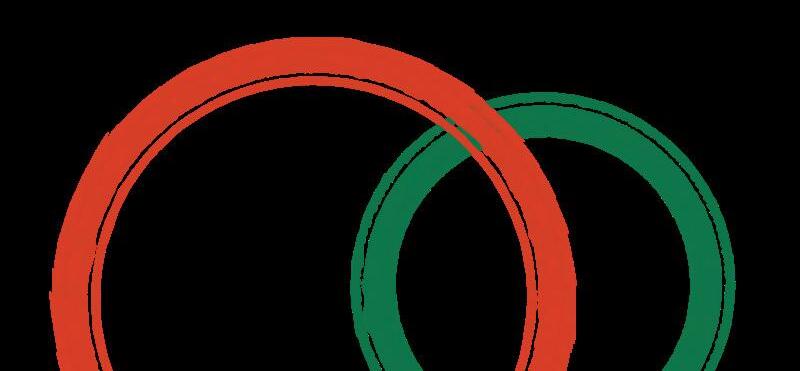
Moore, Class of 2025
“True success is when you actively notice improvement in yourself. It’s being able to see the fruits of your labor after prevailing over your past mistakes. It’s a sign of personal growth, but it requires a willingness to change.”

Matthew Ondeyo, Class of 2026
“I hope to continue to put myself in uncomfortable situations because that’s where I’ve had the most growth. I plan to successfully navigate corporate spaces because it’s all new to me.”
Kat Mokedi, Class of 2026
“Success is getting to a place where you feel content and accomplished with what you have.”


D’Jhanir





























































































































































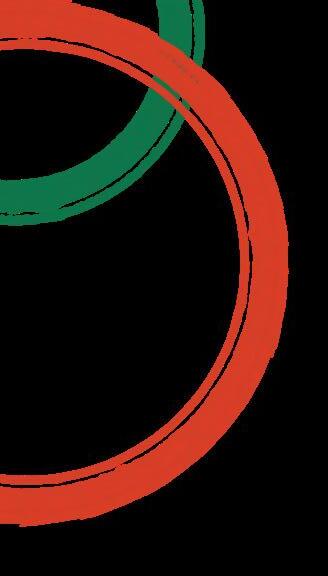
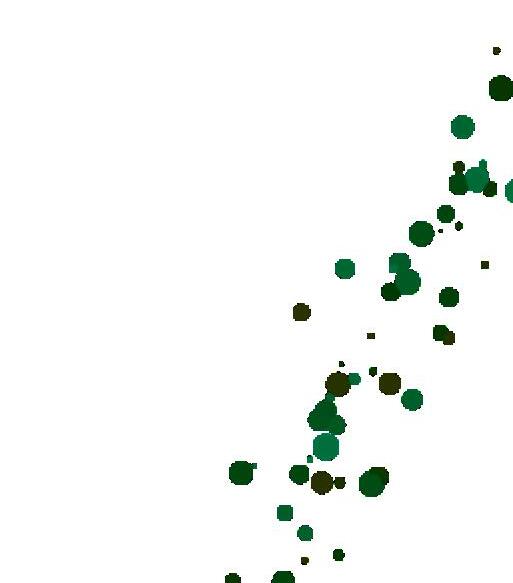
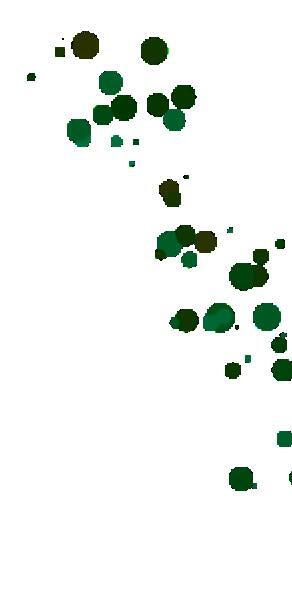
Smith, Class of 2026
“My one goal in life is to be able to help people from a position where I can not crumble from pressure. From a position where my expertise is valued. Therefore my number one future success I would like to see for myself is a well-put effort producing desired outcomes.”
42
malaz nour malaz nour
Keegan Ballantyne, Class of 2024
“I want to become a sort of modern Renaissance Man and be well rounded in all my talents and skills. I would feel successful in the future to use those skills to better society on my own terms and through my own means.

Blake

































































Harris, Class of 2025
“My first quarter of college was a bit of an adjustment from high school, but I’m really proud of the way I’ve adapted since then. I’ve gained a great work ethic, and my hard work is definitely paying off, both with my grades and also with the internships and research position that I’ve acquired.”
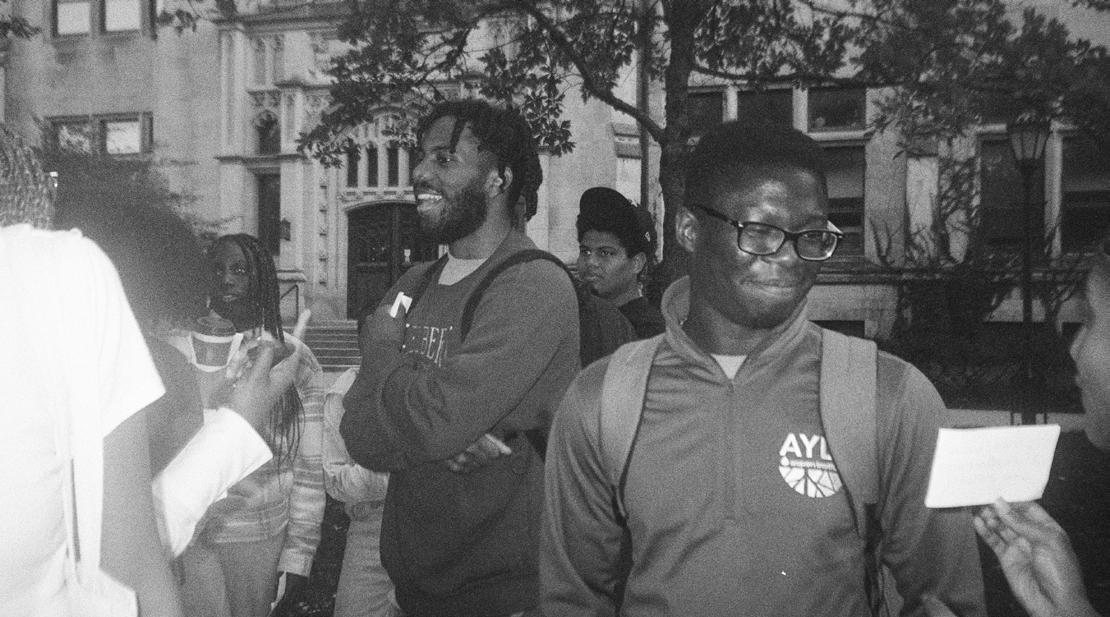
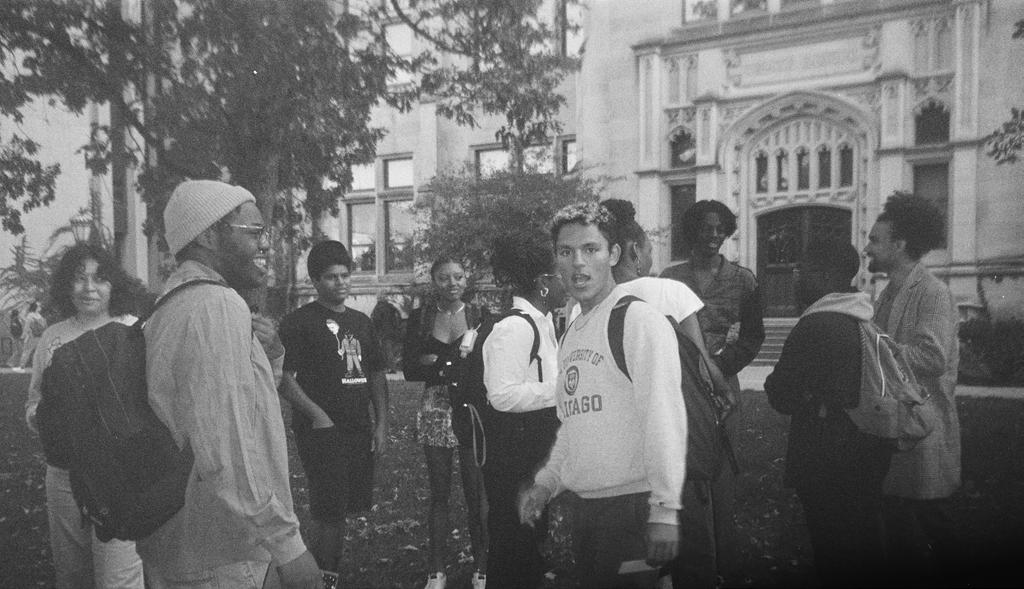
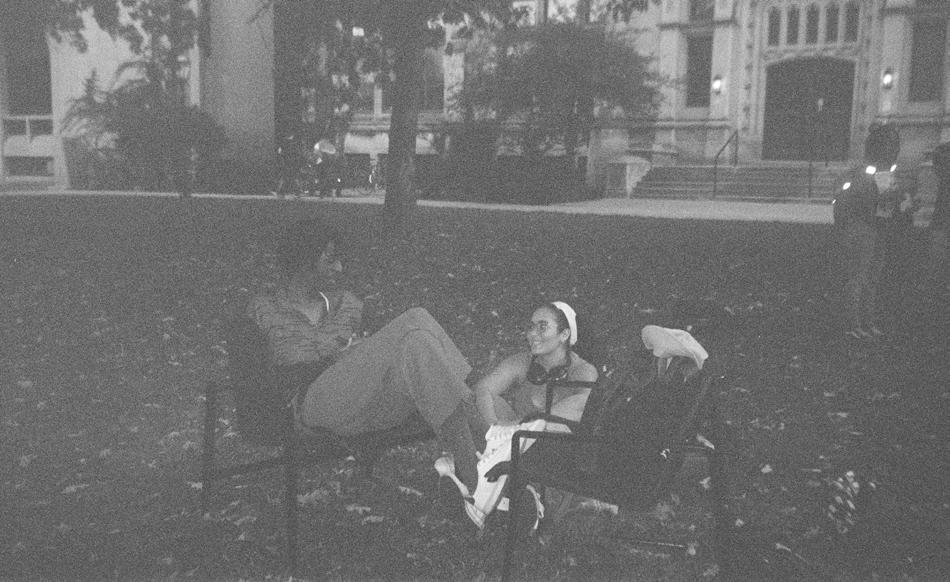
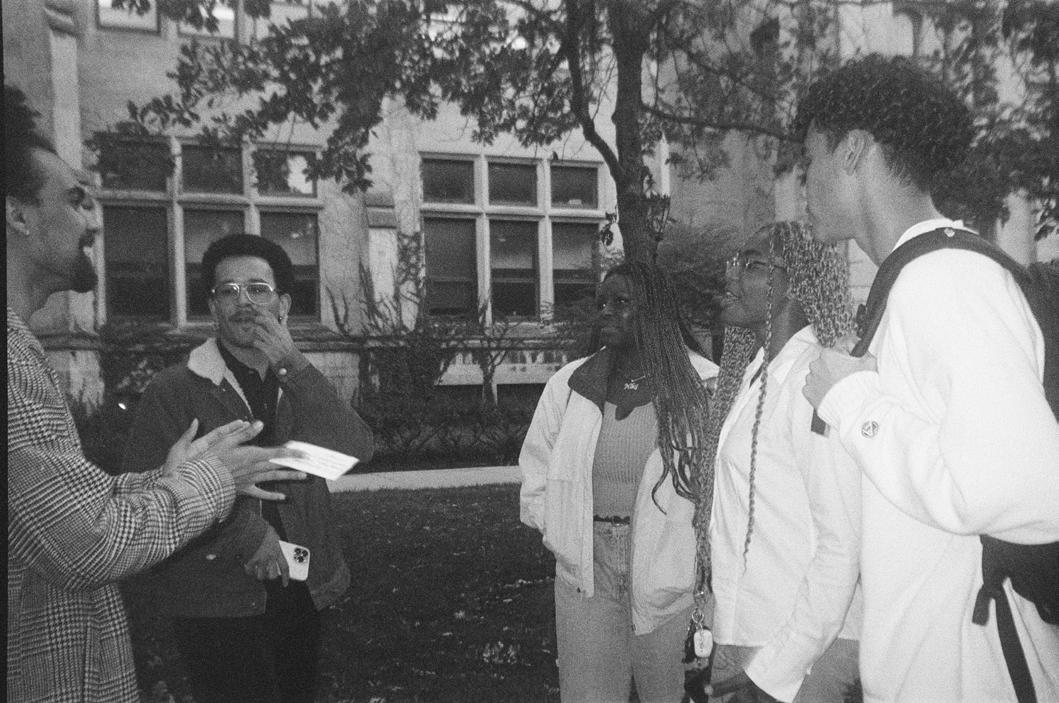
Asa Muhammad, Class of 2026
“Success to me is to be fulfilled, whether that be professional fulfillment or personal. If I’m being more materialistic, though, it’s high ceilings, big windows, and print magazine subscriptions.”
Vinessa Fressola, Class of 2026
“My definition of success would probably be making progress in one’s life towards a place that you want to be without sacrificing yourself or your peace.”





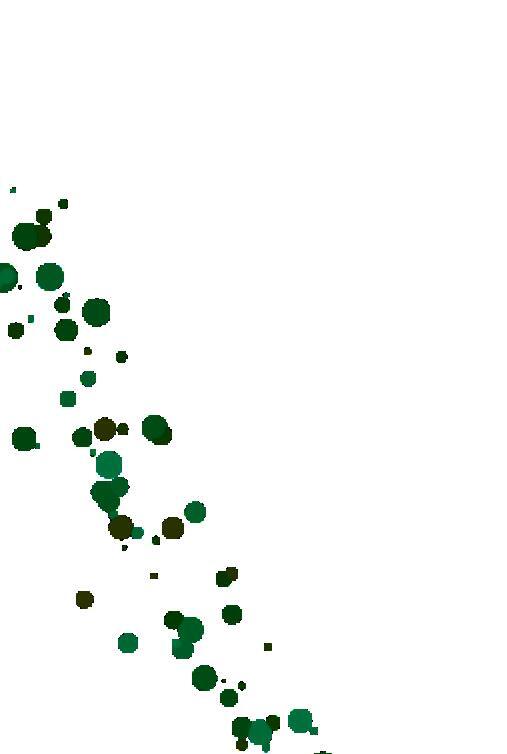
Max




















































Ntalamu, Class of 2025
“Success is only true success when you learn from your mistakes and finish with the best outcome!”










James Roberson, Class of 2025


“I want to see myself doing exactly what I’m doing now, doing things that I enjoy with people that I love. I choose success every day. I don’t see that changing in the future.”
Emmanuel






































































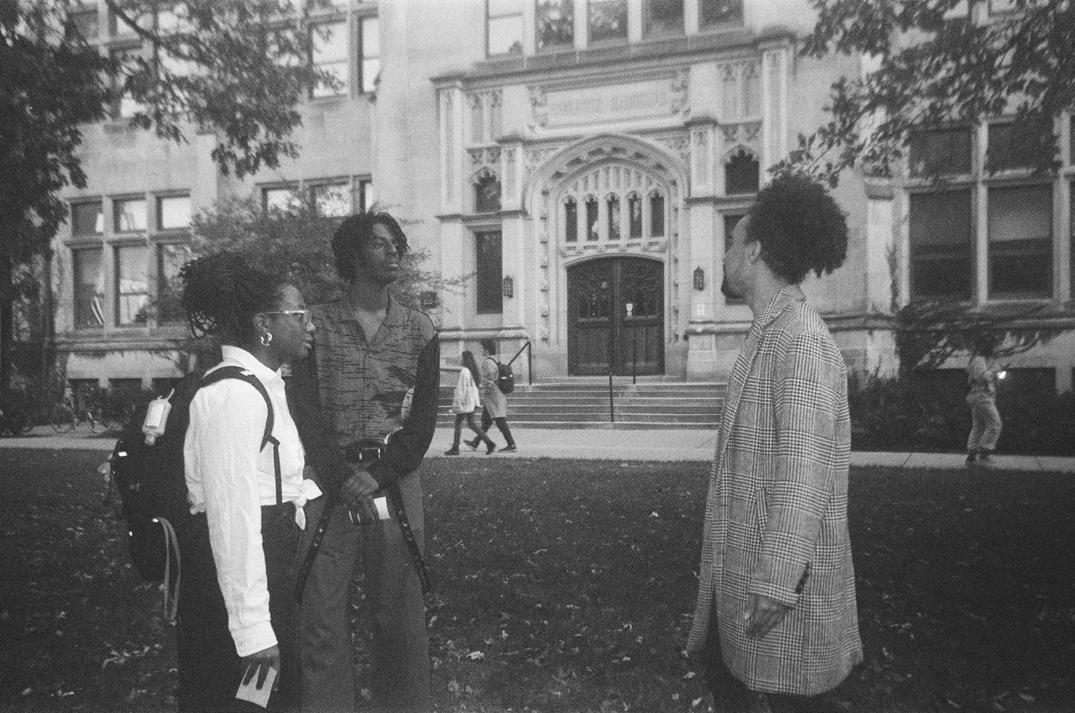
































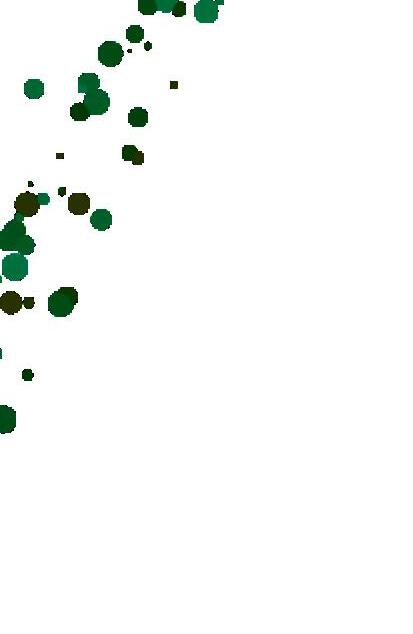

Adewale, Class of 2024
“Honestly, in terms of future success I don’t really know what to expect yet, but what I do know is that I want to impact people positively with whatever work I choose to do, or in whatever space I’m in.”
43
malaz nour
malaz nour malaz nour
malaz nour
malaz nour
Héloïse Vatel, Class of 2026
“I feel most successful when I’m reading and learning. I was always taught you can have anything material in this world, whether you’re poor or rich, [but] if you don’t have knowledge, you don’t really have anything. And I feel like that’s true. The things I have read have enriched my mind so much in a way that nothing material ever could. No matter what I have when I’m older…as long as I have the things I’ve learned from what I’ve read, I’ll have something.”
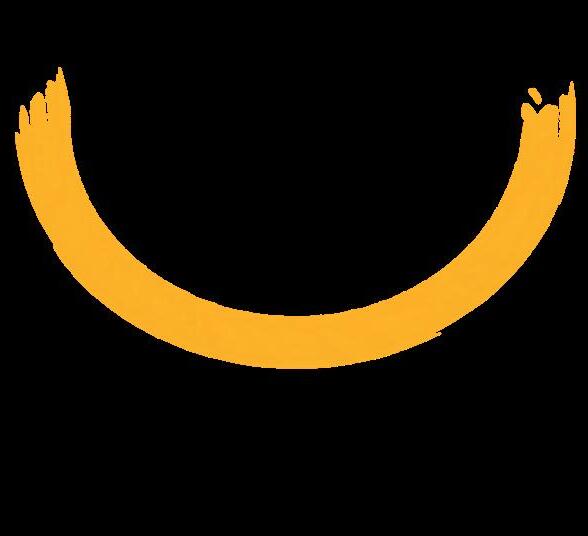


Yannick Tanyi, Class of



























































































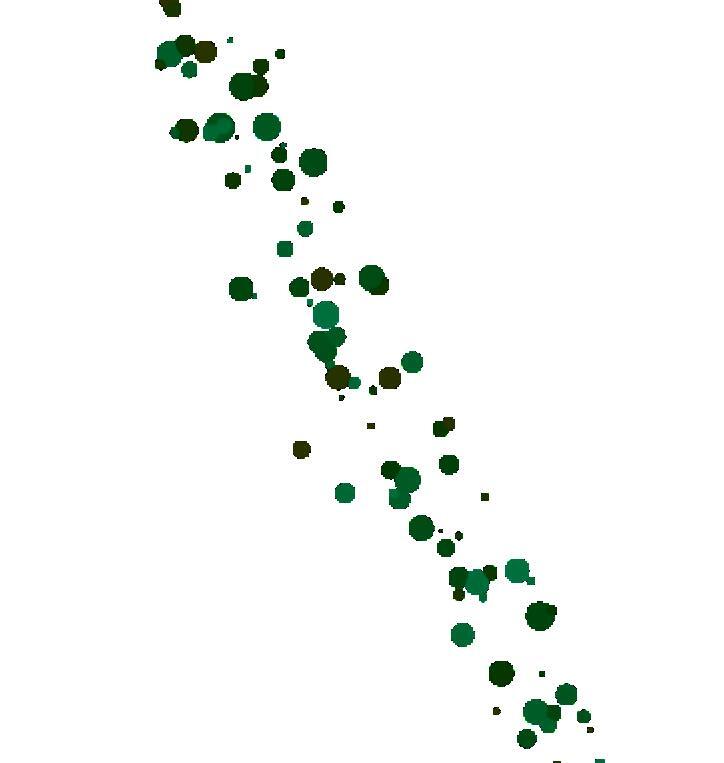
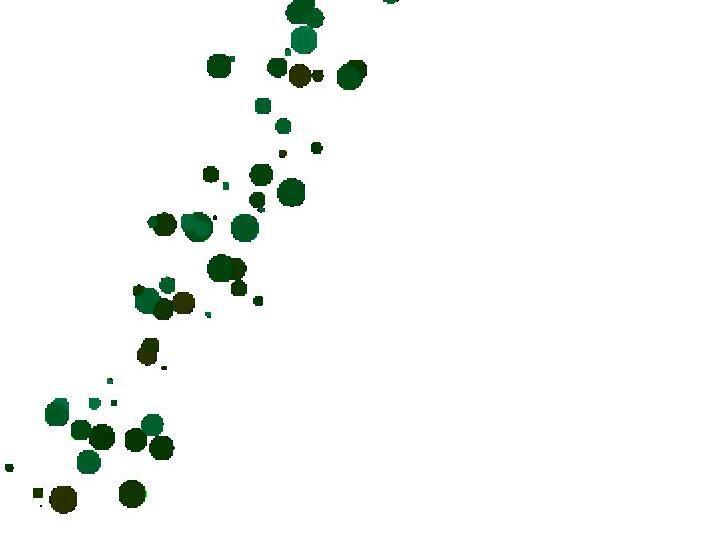
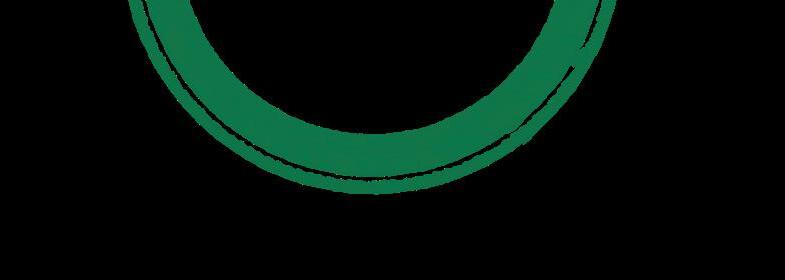

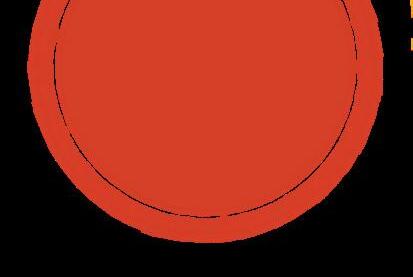
“My proudest success story since arriving at the University of Chicago would have to be the amount of confidence I have gained.… With how welcoming everyone here has been, I immediately felt comfortable—and with comfort comes confidence.”


I’ve only been at the University of Chicago for a little over a year now, but I can say without a doubt that one of my greatest successes is being surrounded by, uplifted by, and supportive of the Black community here. Comparison has no home here when it is outmatched by the love shared here for others and their passions.
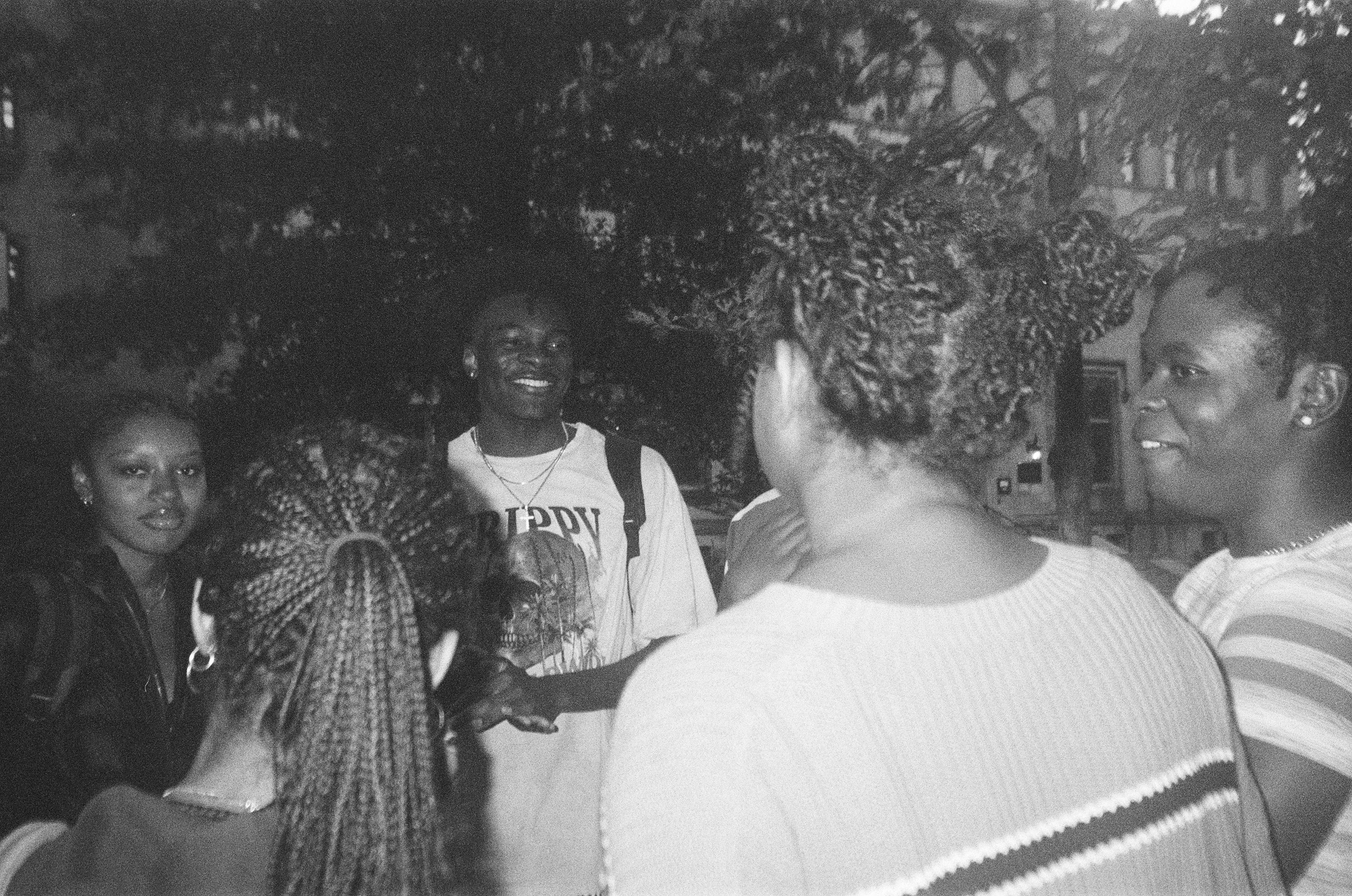

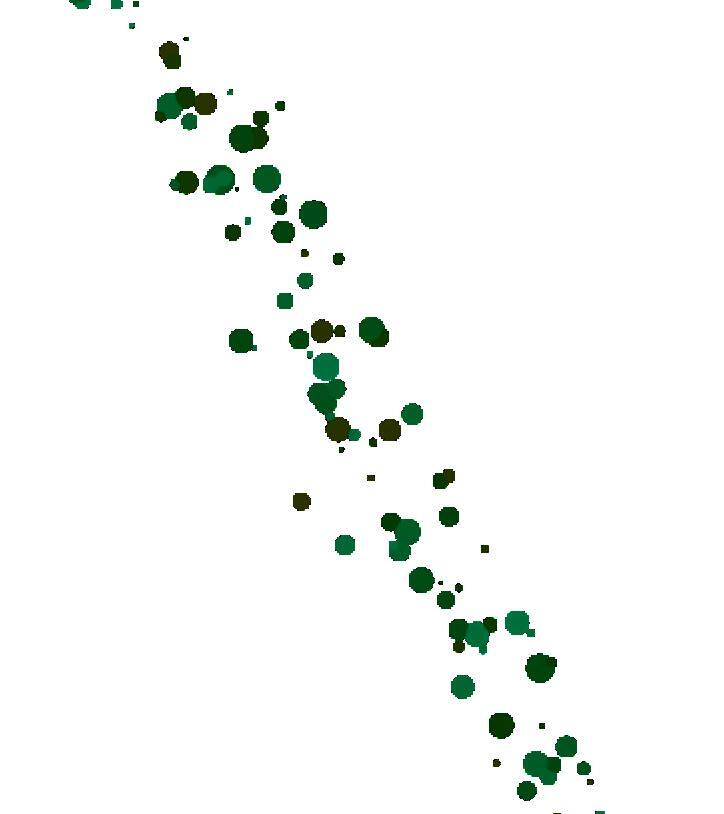
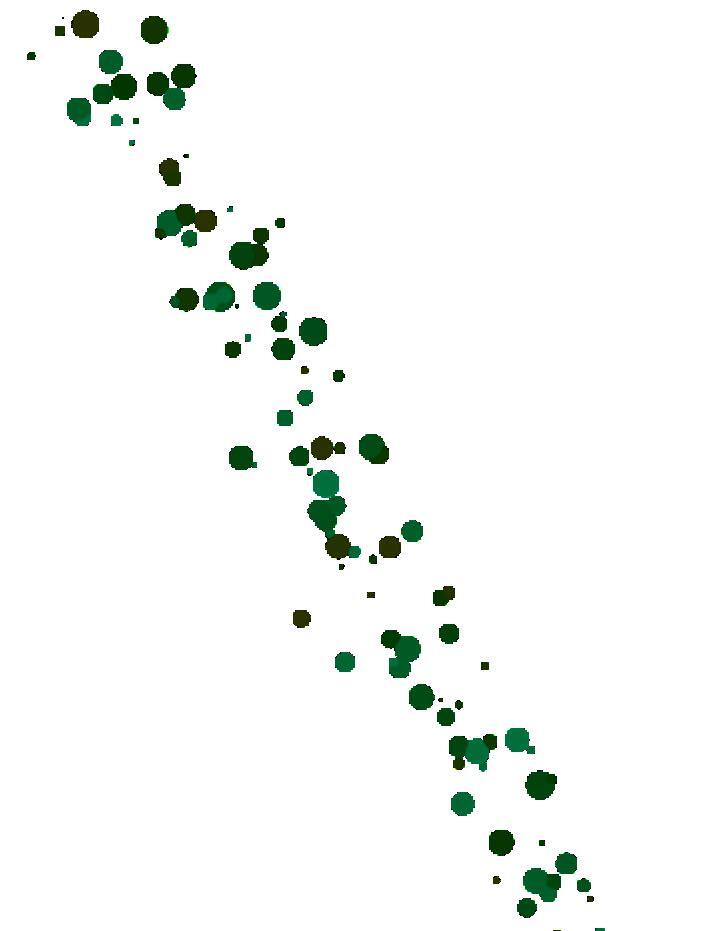
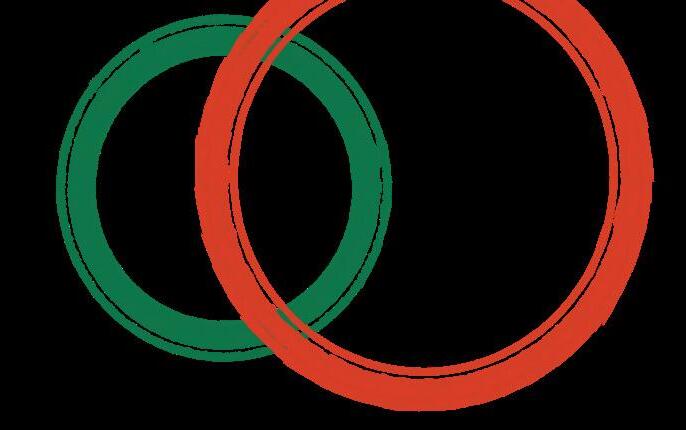
44
Alex Webb, Class of 2026 “Success [is] being able to find beauty and joy in the holistic truth of my life.”
2026
malaz nour


45
Black People, Black Culture
Crossword
Fitzgerald color of our come dark, all of it. phrase that celebrates black showing and happiness to other, outwardly displaying it to world. Down. of music originated
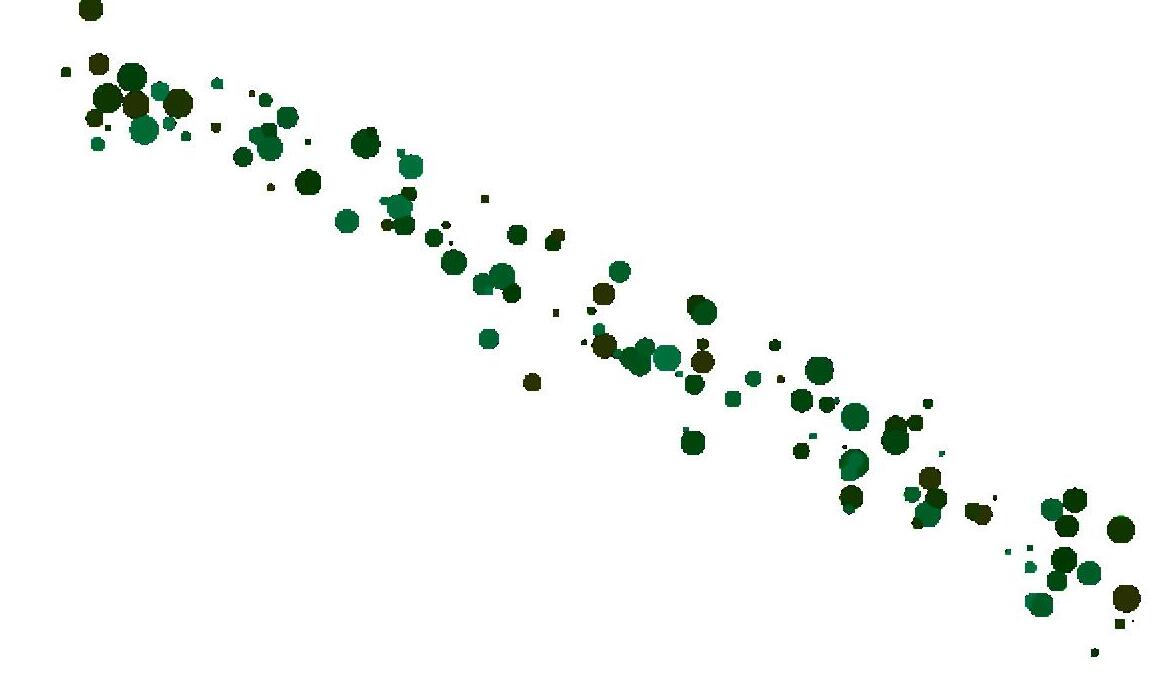
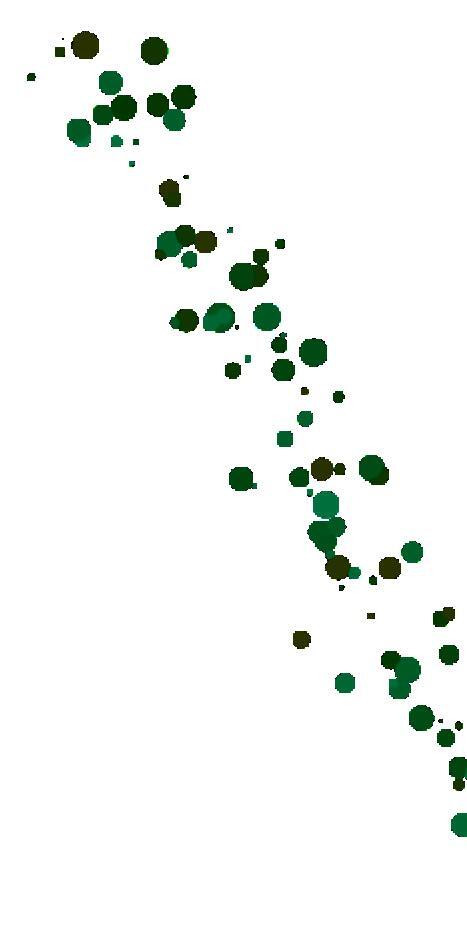


















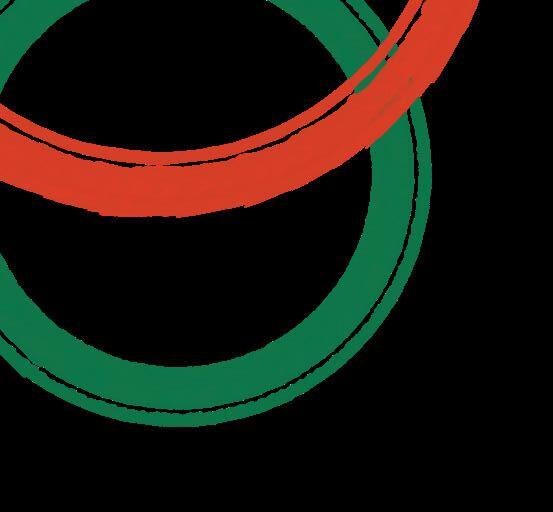

ACROSS
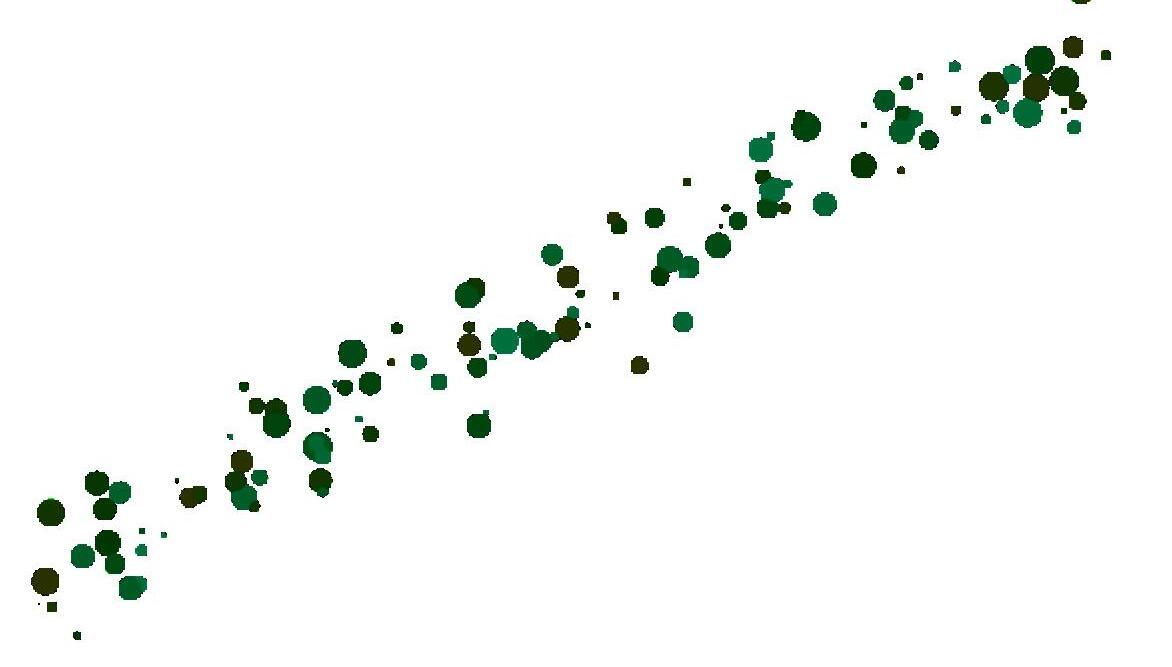
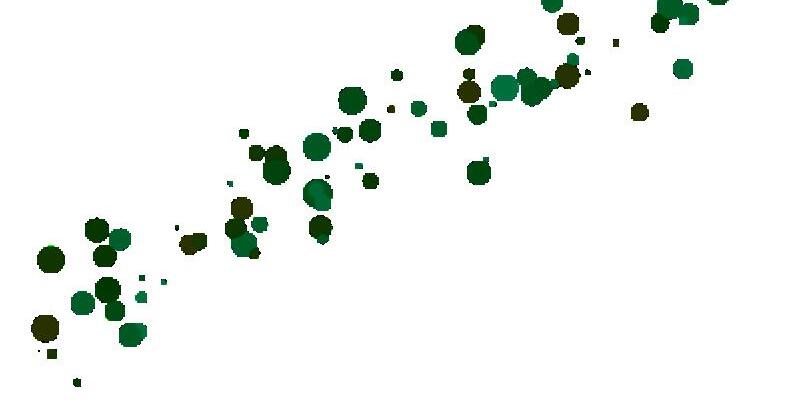

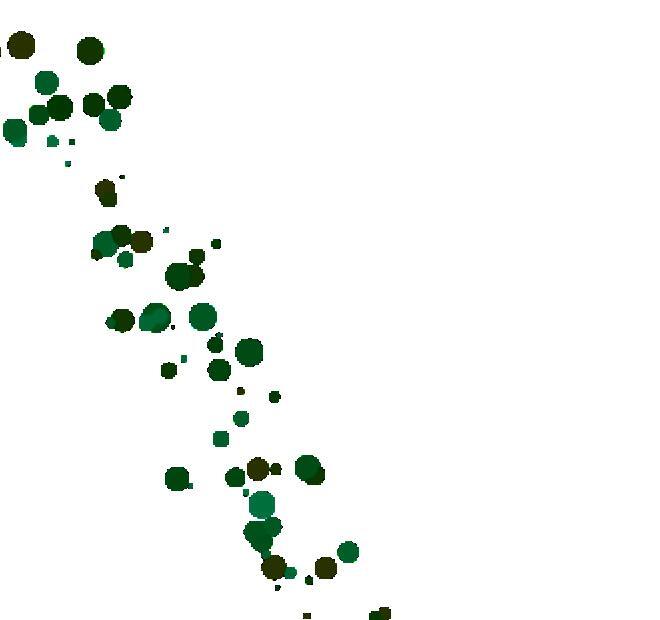
1 A phrase that celebrates Black women and all they can do from art to academia, showing off their talents and skills to the world.
3 What Black people find wherever they go. A group of us living together, working together, celebrating life together.
5 A phrase that describes Black people doing amazing things, whether that be their jobs, academics, sports, whatever.


7 A protective wrap that one ties around their hair to go to sleep. Can also be worn for
style.
8 A type of music that originated in the United States in the Black community. Uses a lot of brass and woodwind instruments to create a strong beat. Gave us the greats like Louis Armstrong and Ella Fitzgerald.
9 The color of our skin. We come in light, dark, all shades of it.
DOWN
1 A phrase that celebrates Black men showing love and happiness to each other,
outwardly displaying it to the world.
2 With 10 Down. A type of music that originated in West Africa and has spread across the globe. Emphasizes rhythm and percussion. Gave us great artists like Burna Boy and Tems.
4 A popular Black luxury bag brand that half this campus seems to have.
6 The type of hair we have. Some are tight, some are loose, some are s-shaped, some are kinky, the list goes on.
9 See 2 Down.
4 6 7 9
46 46
4 A popular black luxury bag brand that half this campus seems to have 6 the type of hair we have. some are tight, some are loose, some are s-shaped
ARIANNA LAFONTANT
Black Culture, Black People






 SIYANDA MOHUTSIWA
SIYANDA MOHUTSIWA
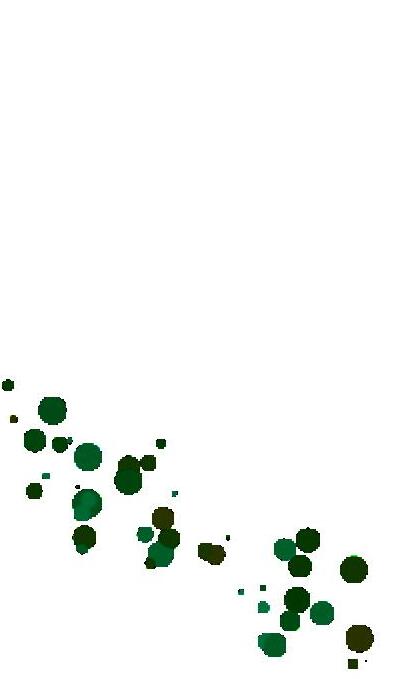

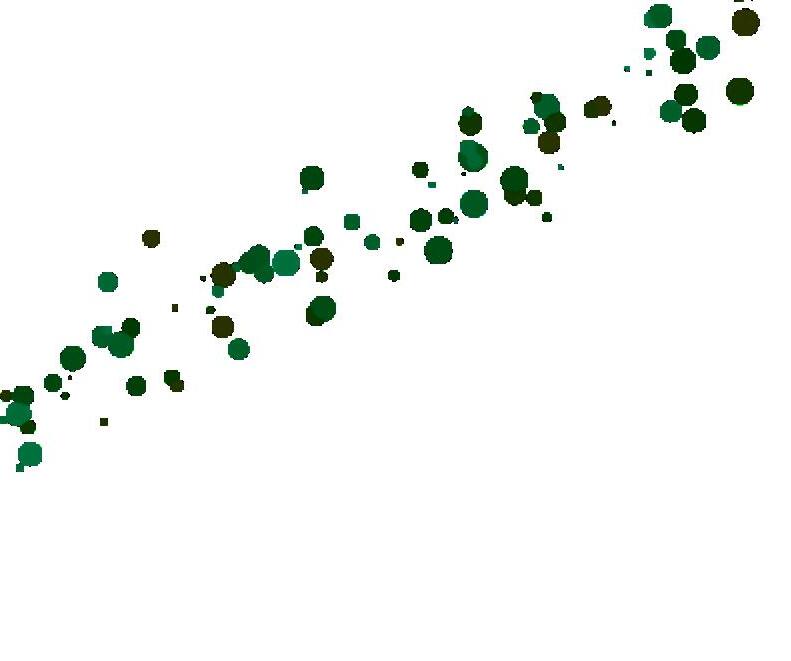
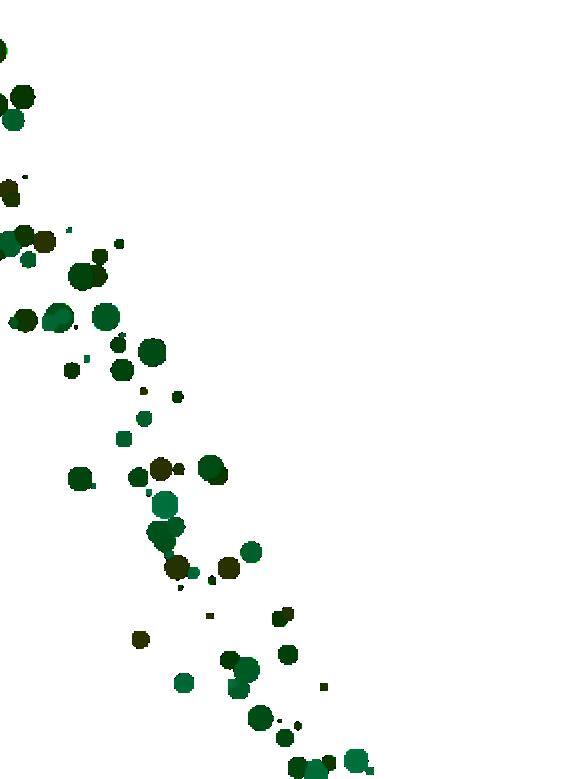

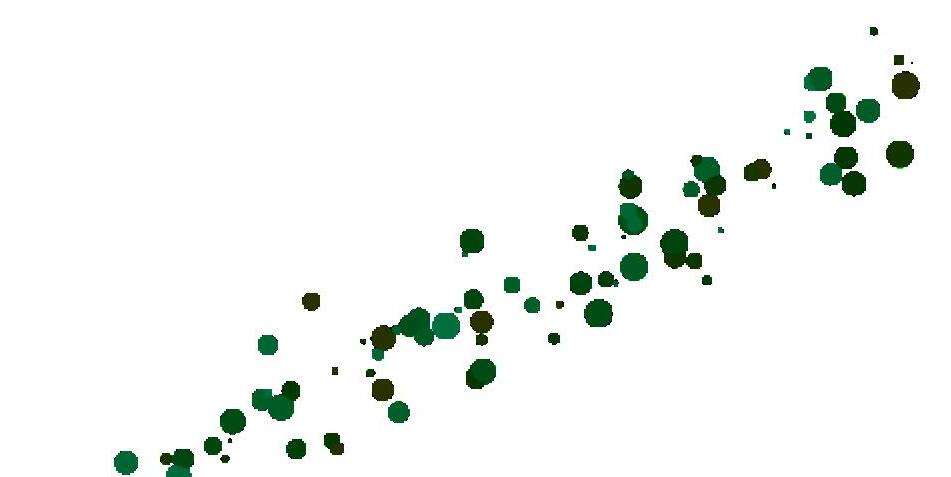
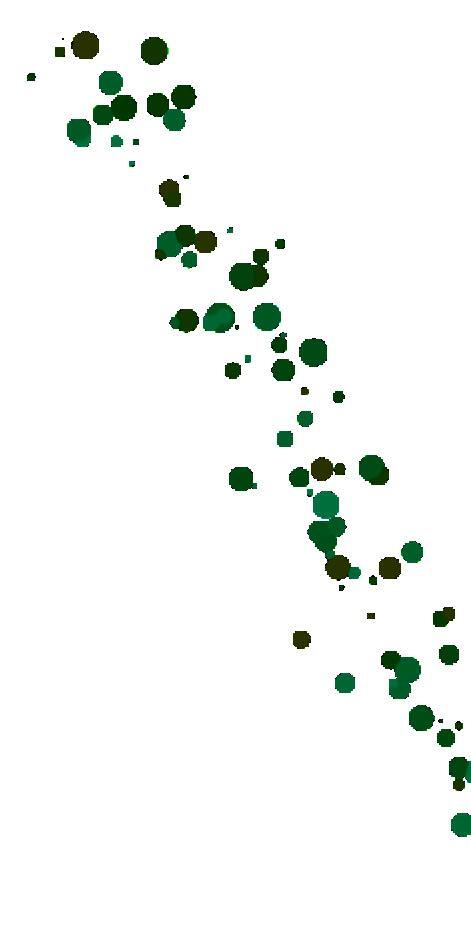



47 ACROSS 1 Biblical heroine in Judges 5 Scott of Parks and Rec 9 Winfrey’s production company 14 “That being the case...” 15 The Big Easy: Abbr. 16 North American dogwood 17 Start to fall? 18 Low digits? 19 Unexpected victory 20 Identity of many a Civil Rights icon 23 Island in Haiti, maybe 24 Long time 25 Like Gen. Powell 26 Org. behind the National Medal of Arts 27 A driver of Civil Rights campaigns, e.g. SNCC 33 Civil Rights Memorial architect 34 Singer Bareilles 35 Self-care locale for some 38 Forearm bone 40 uchicago.___ 42 Sushi prelude 43 Dark states 46 Not dec. 49 Vox populi, vox __ 50 Many young Civil Rights legends started here 53 Chief archivist for many a civil rights org. 55 Before now 56 Corn unit 57 ___ center 58 Gandhian philosophy which inspired MLK 64 Wall climbers 66 Mrs. Clooney 67 Real: Ger. 68 Coped 69 Not fire 70 Old dagger 71 “It’s __ __ unfair!” 72 Those: Sp. 73 She sheep DOWN 1 Sounds from pounds 2 Symbol of Black Pride, to some 3 Jenkins who supplied buses to 50 Across 4 Can start with ‘a’, ‘b’, ‘c’ but not ‘d’ 5 Outdated receiver 6 When one closes... 7 Chrysler Building architect William Van __ 8 Capital of Lesotho 9 Home to Beyoncé and Loretta Devine 10 Egyptian snake 11 Partial title of J.F.K’s 1963 civil rights address 12 Trailblazer in Black Horror Film 13 “Coffee ___?” 21 Some are found in different area codes, says Luda 22 Painter of “The Archangel Michael defeating Satan” 27 Naked snail 28 Dominos game piece 29 Under the table, for example 30 Three: It. 31 “____ Free Dixie” 32 Tundra competitor 36 Suffix with per or ab 37 Author of “The Souls of Black Folk” with Du 39 Sully 41 Grad school for Black author James Haskins 44 Prefers 45 Building block 47 Bayou brethren 48 Omani money 51 How to support activists 52 Frederick who was a member of Selma’s “Courageous Eight” 53 Painter Kahlo 54 Activist James played by Common in Selma (2014) 59 MTV awards 60 First four letters of Ralph Ellison prologue 61 Producer of “The Historical Cookbook of the American Negro” 62 Alexander of “How To Write An Autobiographical Novel” 63 Haitian summers 65 Losers catch ‘em












































 MARLA FIONA ANDERSON, BA ‘22
MARLA FIONA ANDERSON, BA ‘22



















































































 DOTSON
DOTSON


















 URUNNA ANYANWU
URUNNA ANYANWU

































































































































 by DESTIN BUNDU & SARAH GAUDRON
by DESTIN BUNDU & SARAH GAUDRON









































































































































































































































 SIYANDA MOHUTSIWA
SIYANDA MOHUTSIWA



























